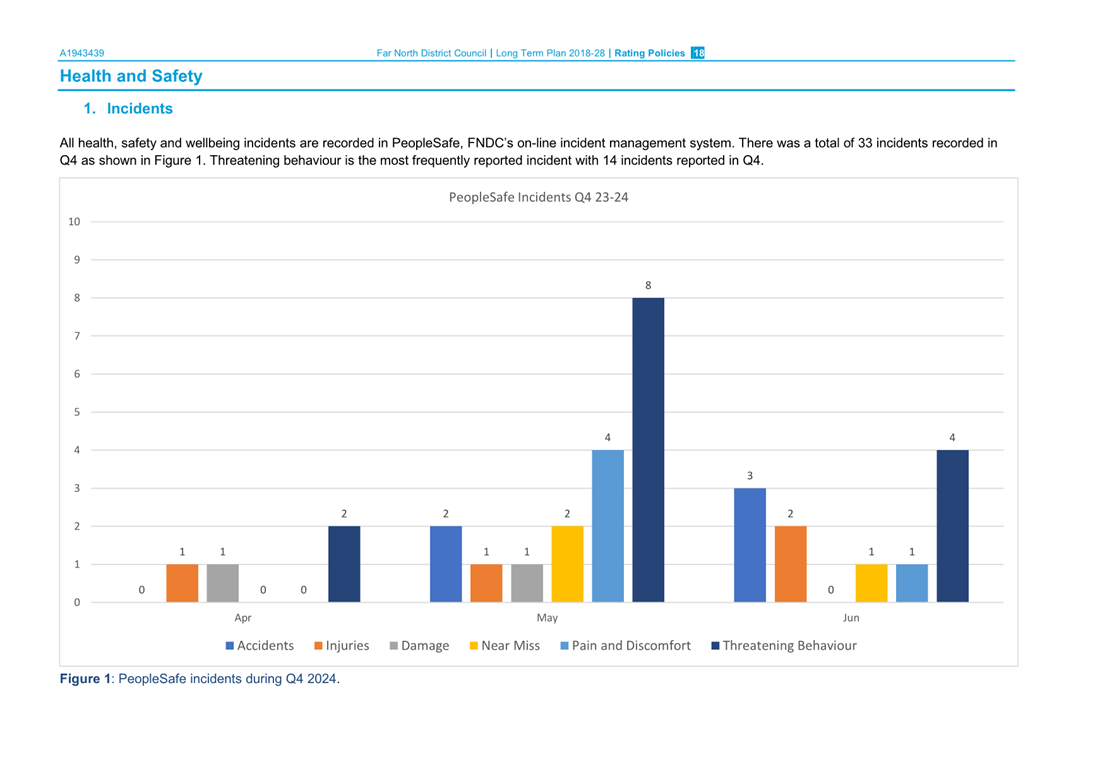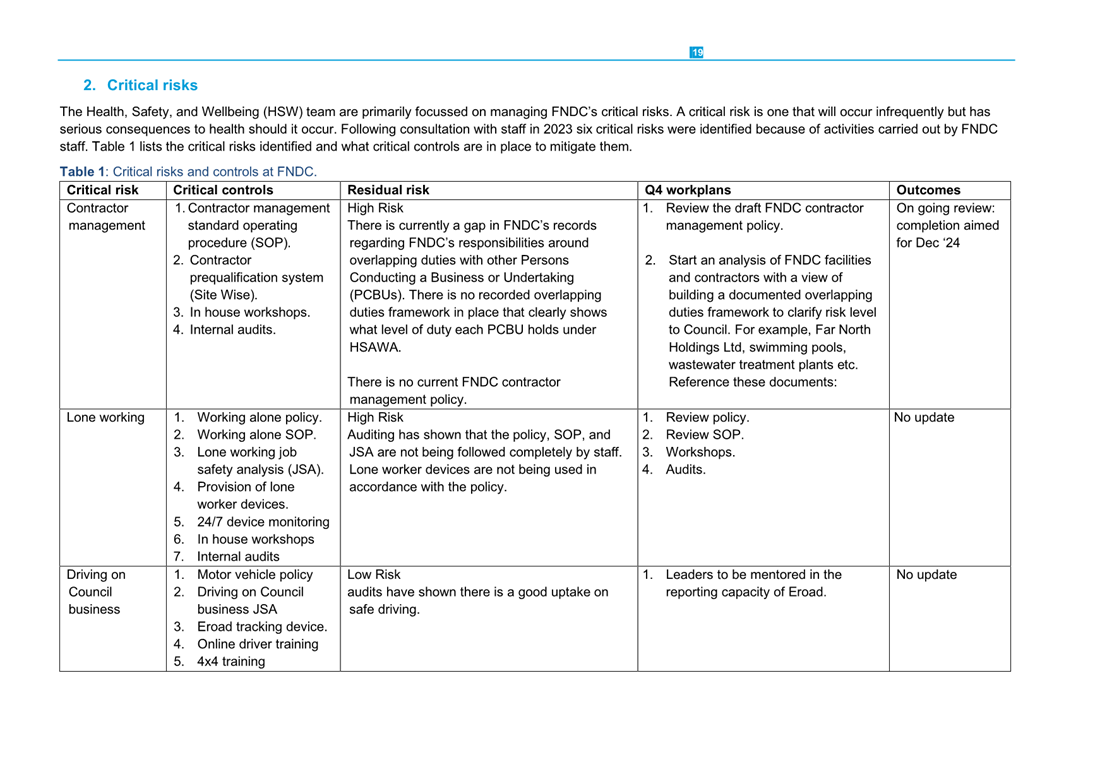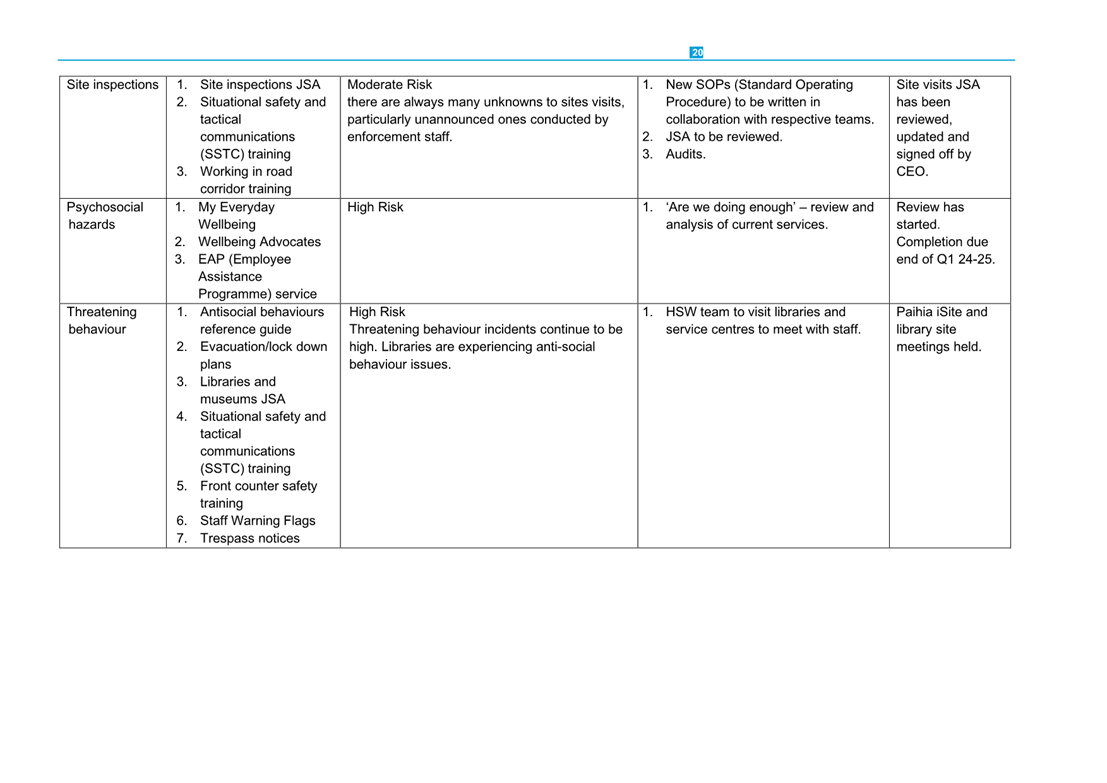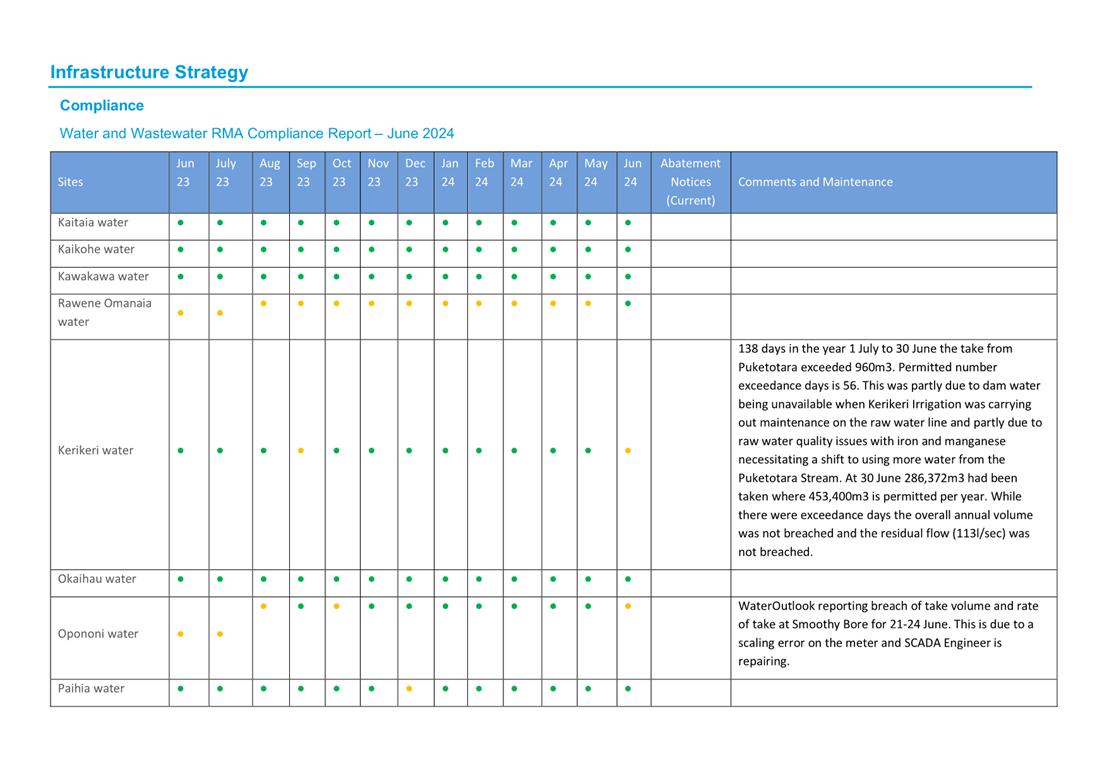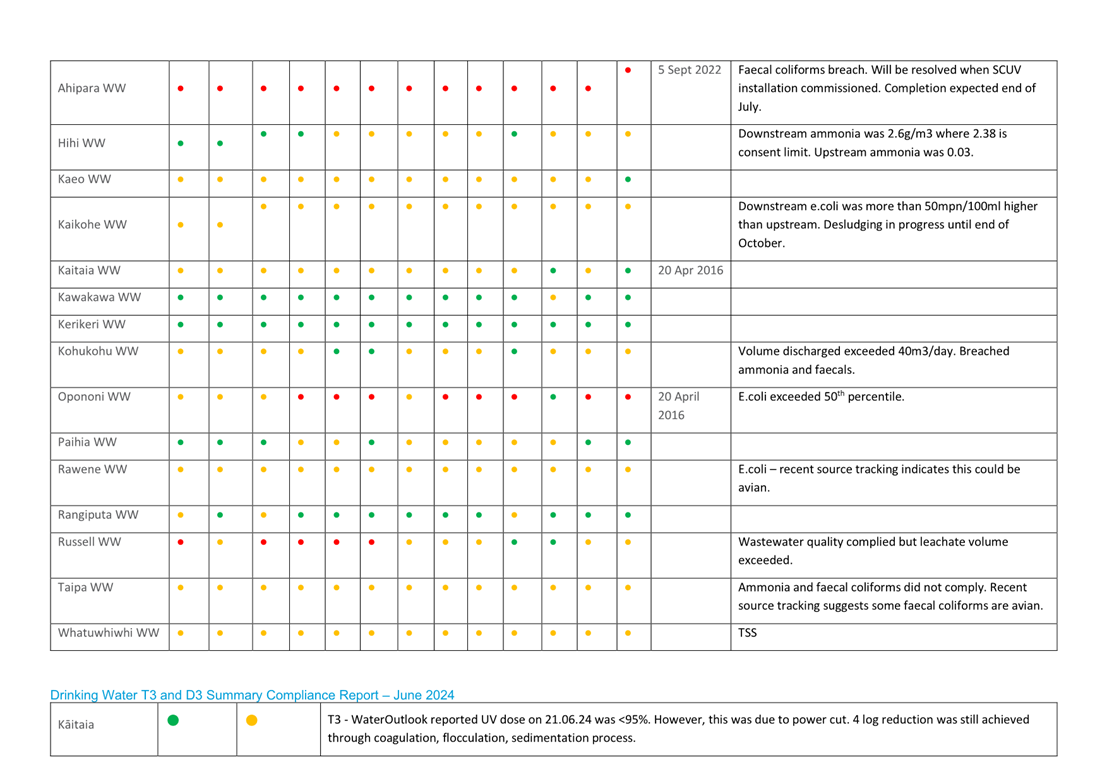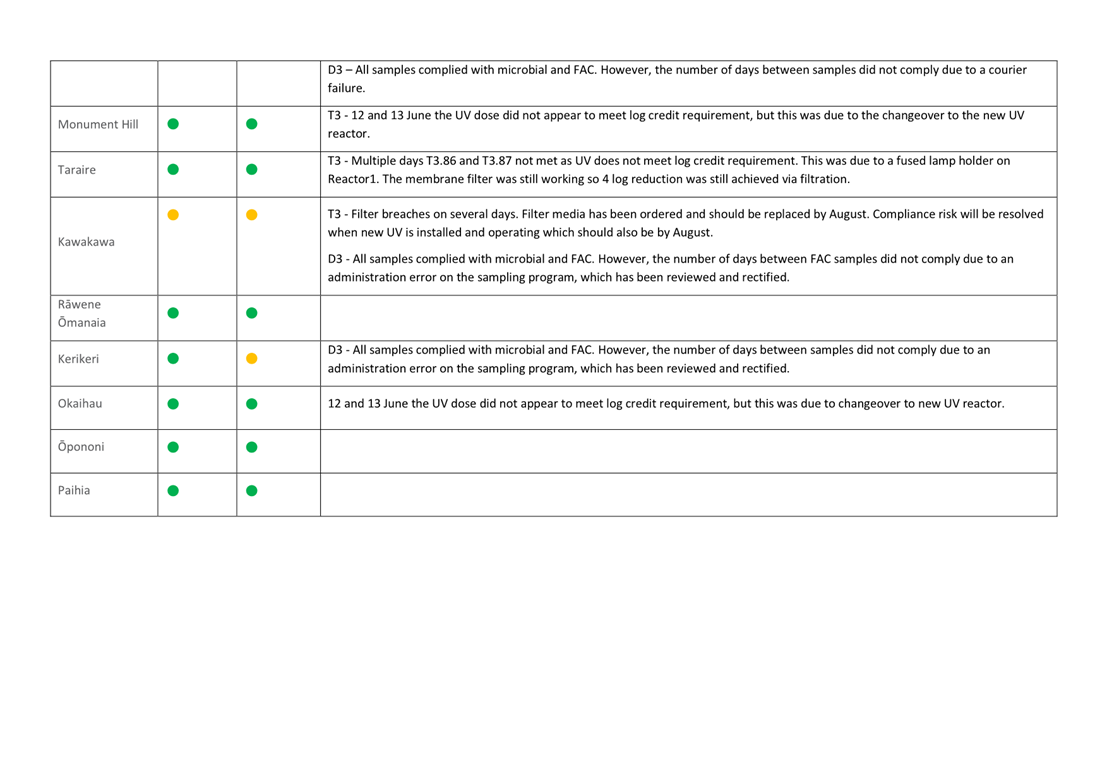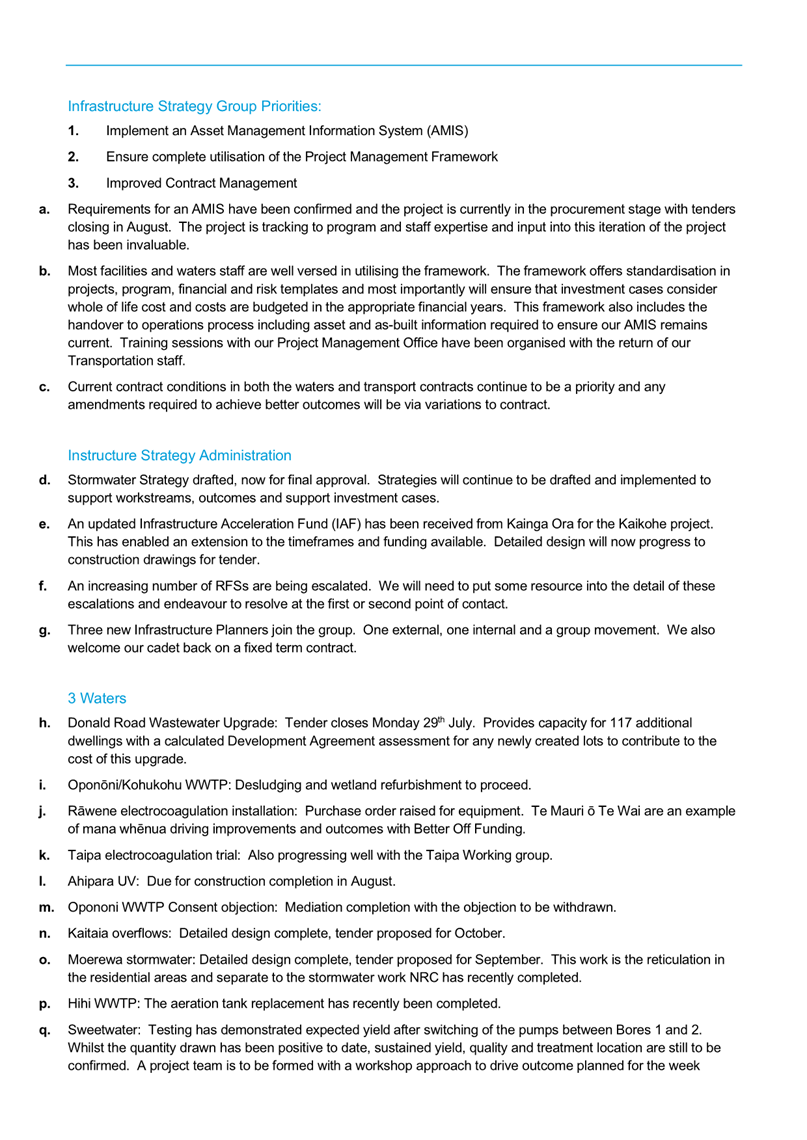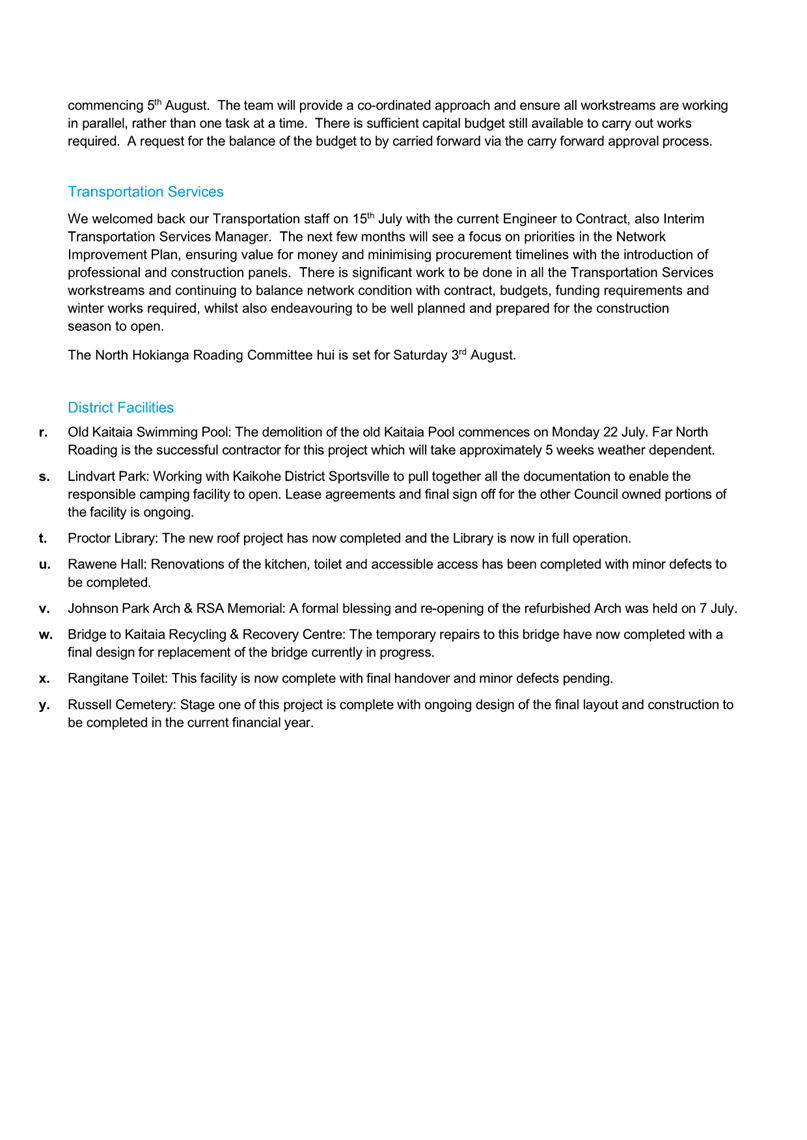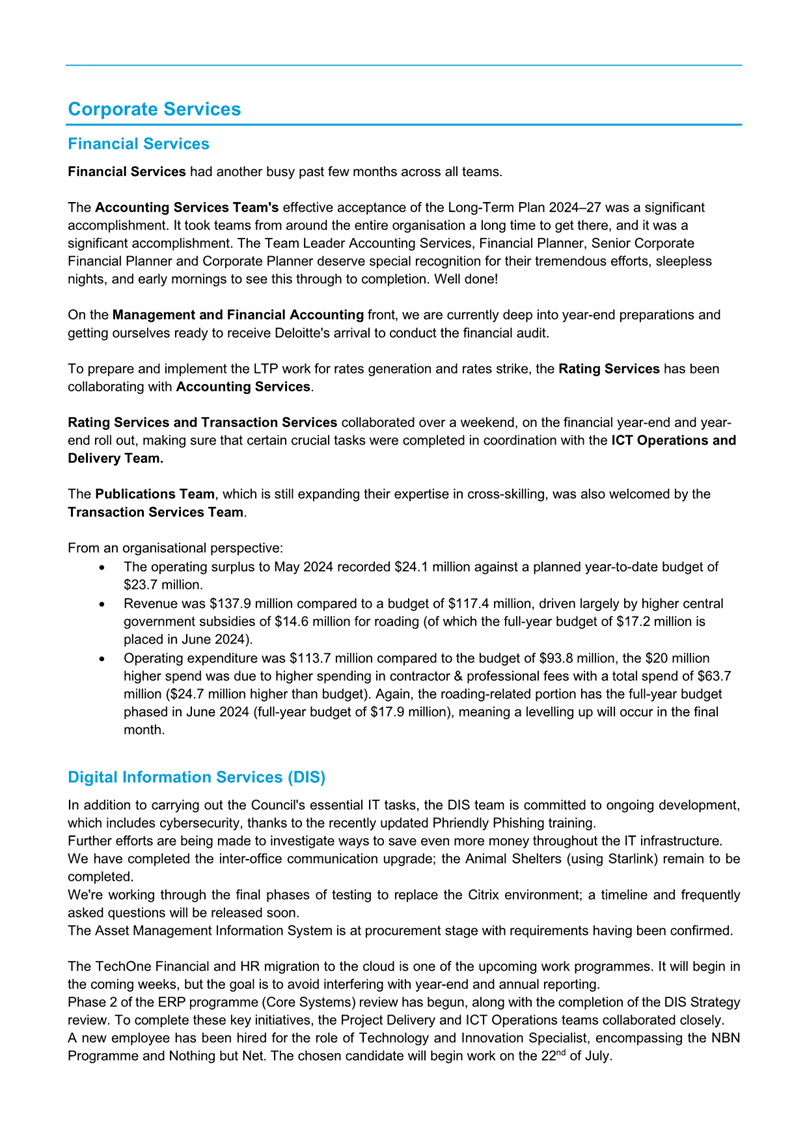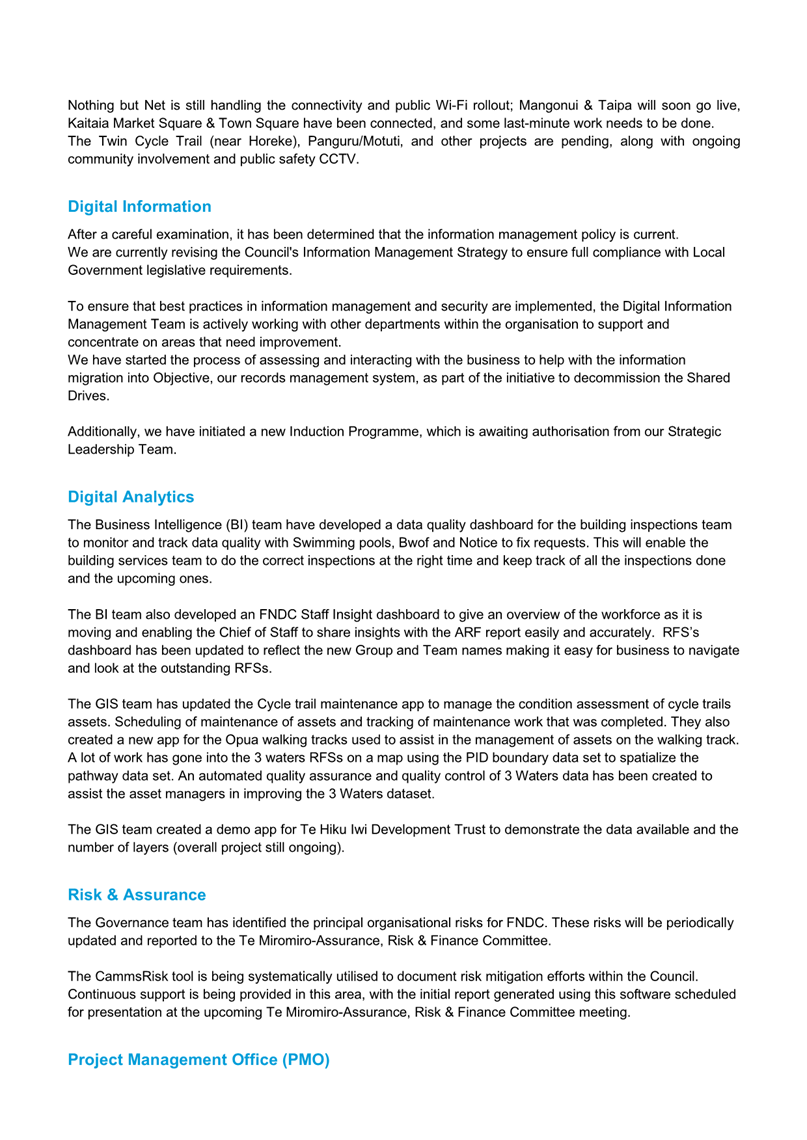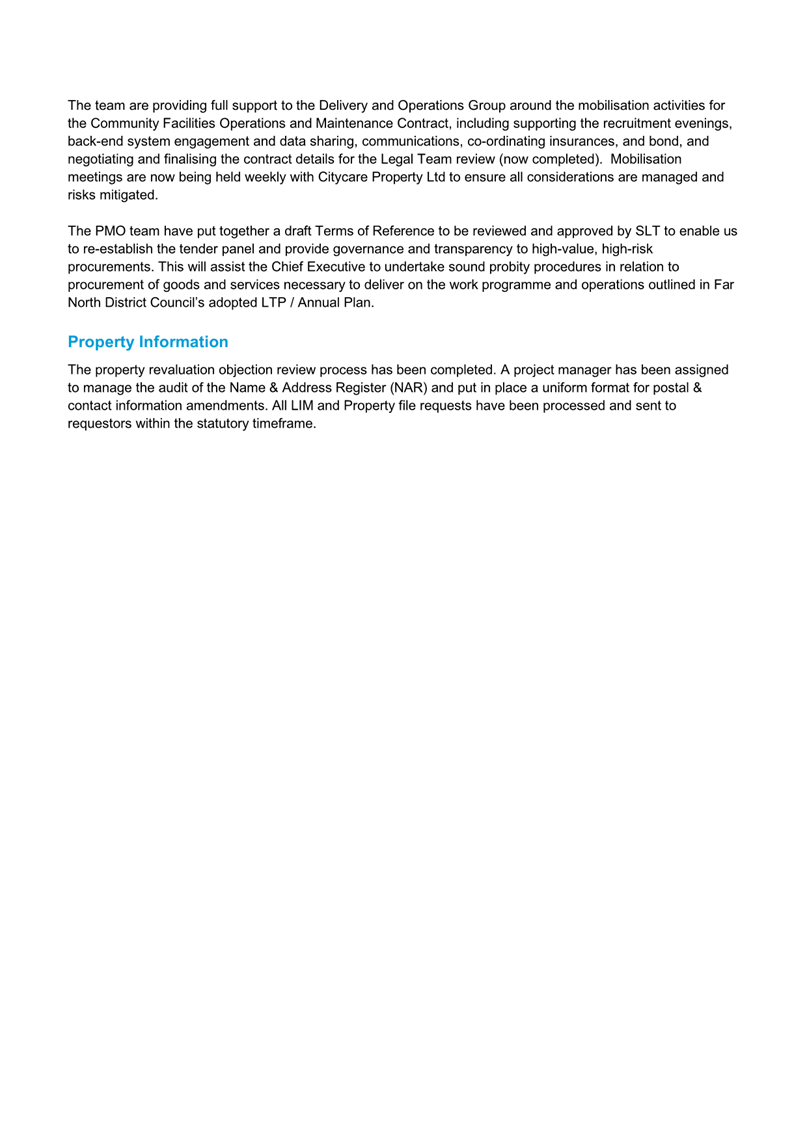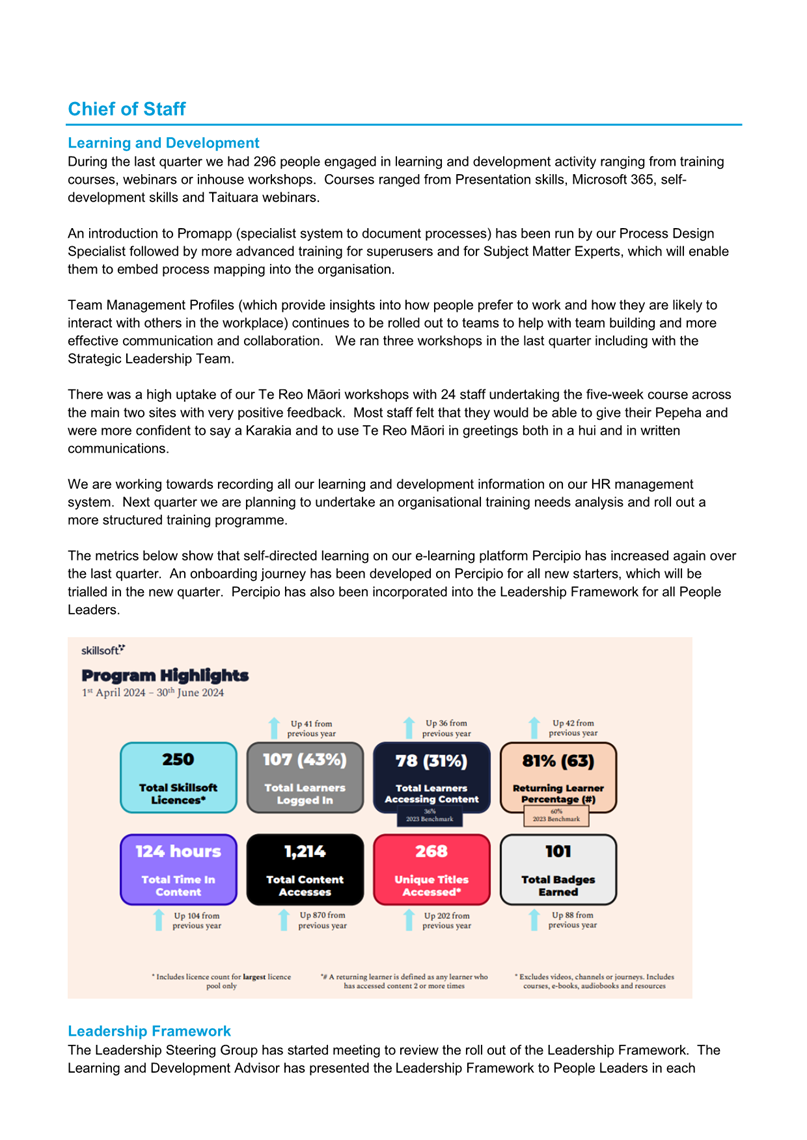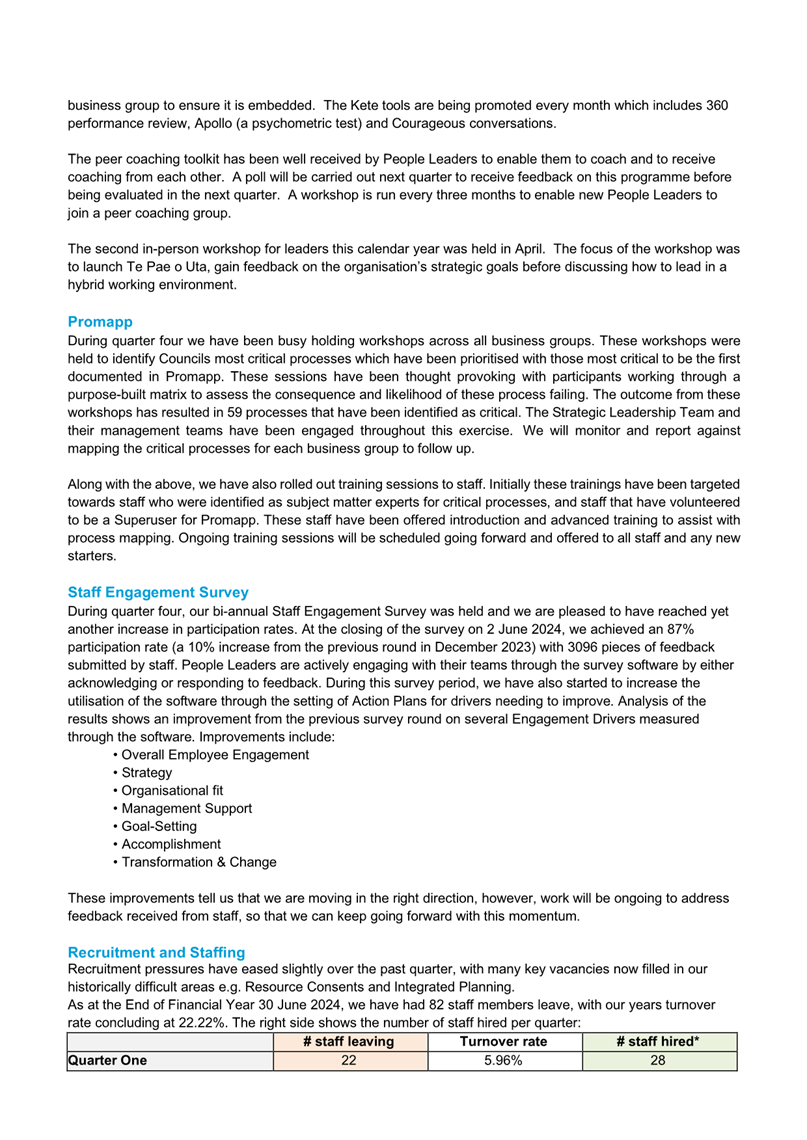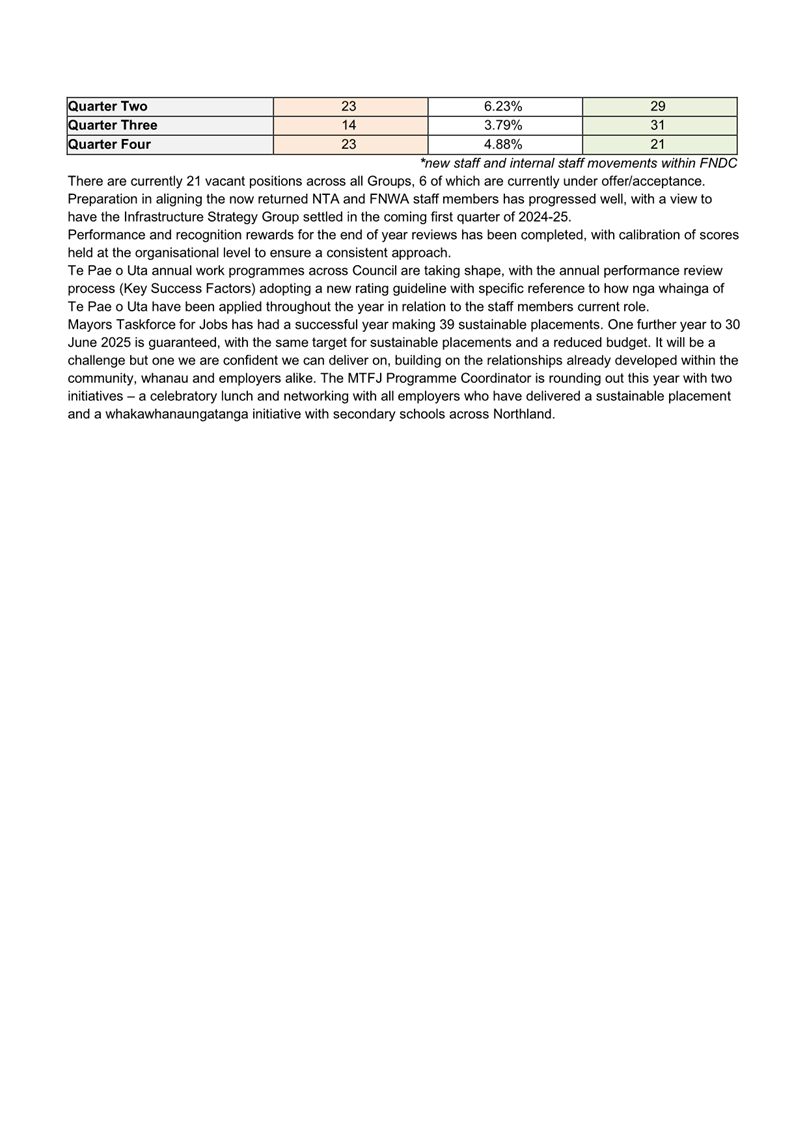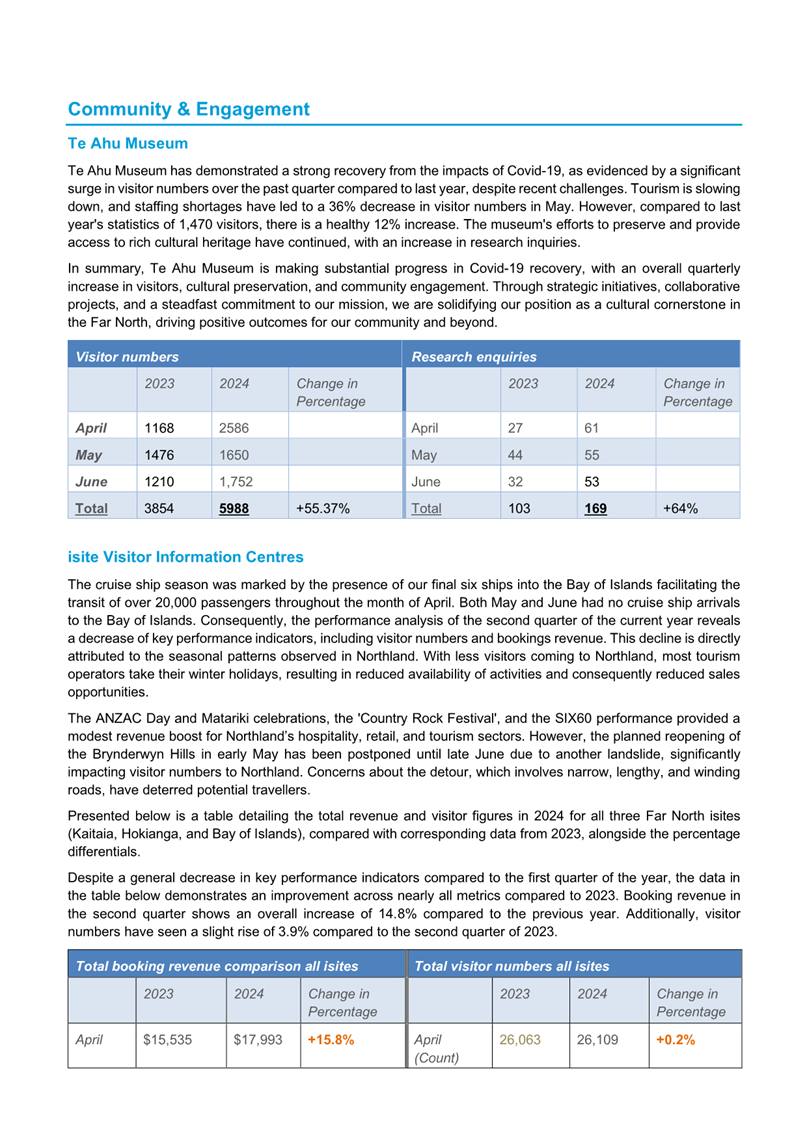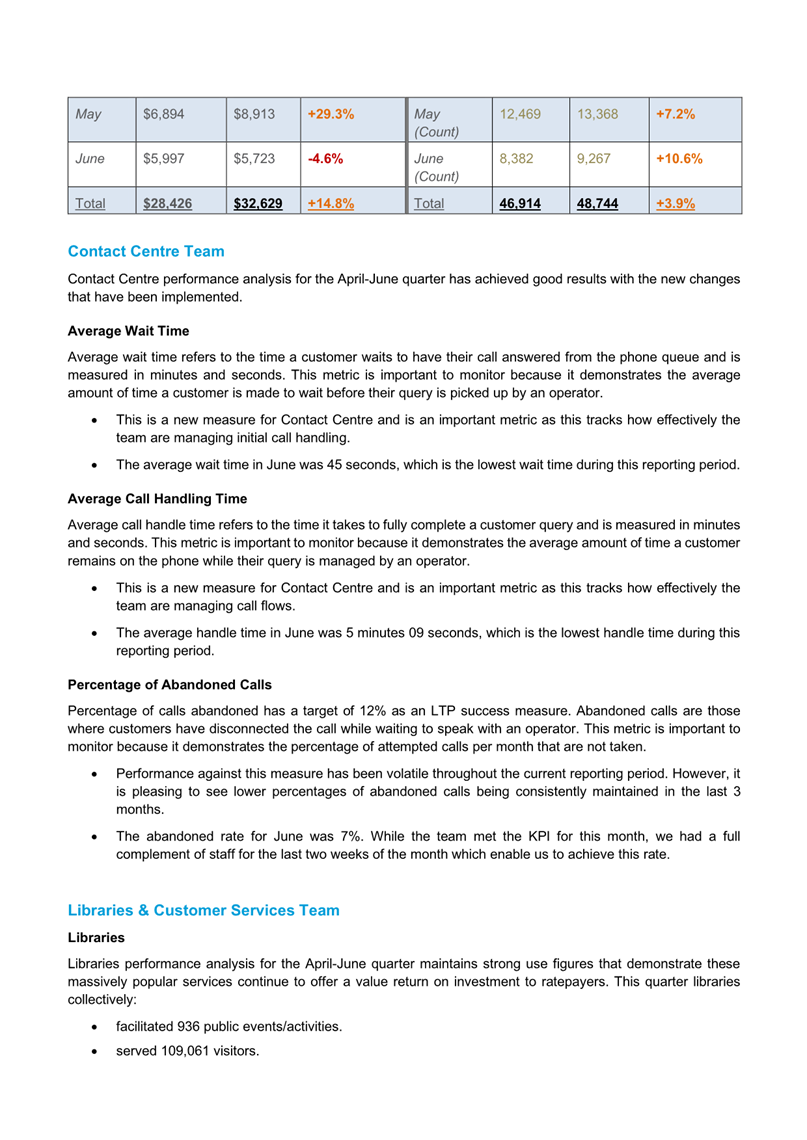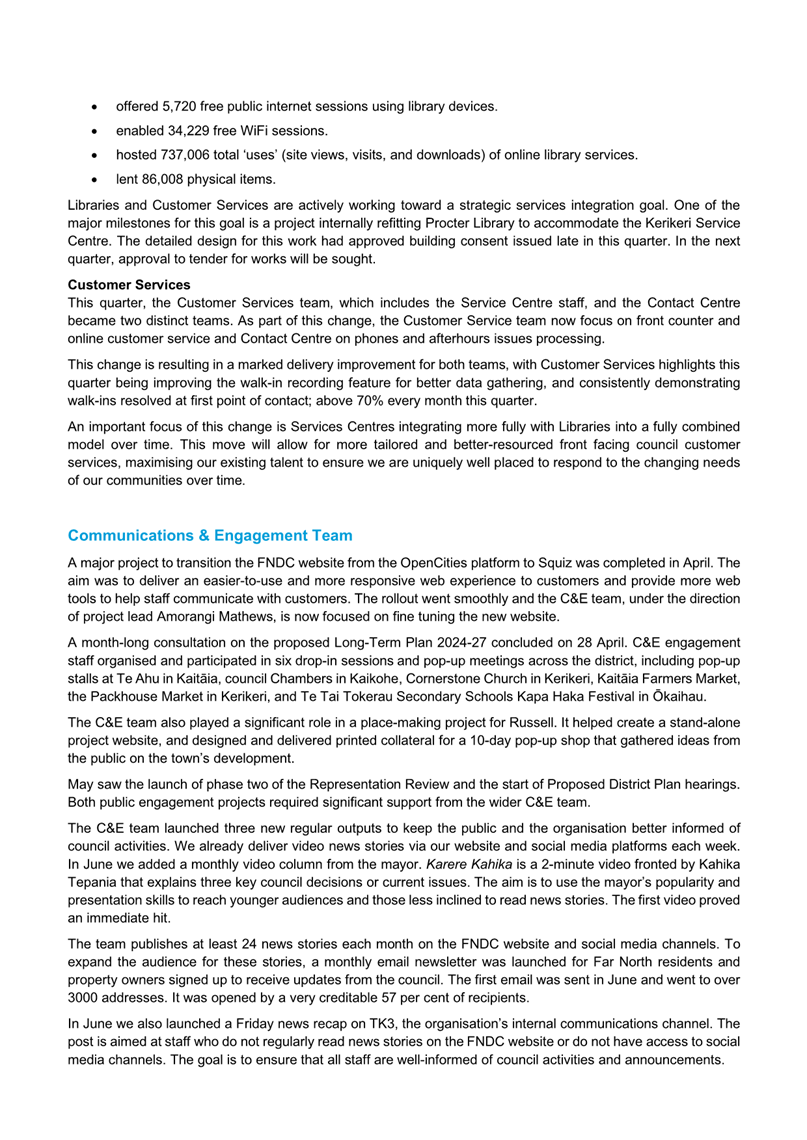
Te
Kaunihera o Te Hiiku o te Ika
AGENDA
Ordinary Council Meeting
Thursday, 8 August 2024
|
Time:
|
10:00am
|
|
Location:
|
Council Chamber
Memorial Ave
Kaikohe
|
Membership:
Kahika - Mayor Moko Tepania -
Chairperson
Kōwhai - Deputy Mayor Kelly
Stratford
Cr Ann Court
Cr Felicity Foy
Cr Hilda Halkyard-Harawira
Cr Babe Kapa
Cr Penetaui Kleskovic
Cr Steve McNally
Cr Mate Radich
Cr Tāmati Rākena
Cr John Vujcich
1 Karakia
Timatanga / Opening Prayer
Ka tuku mātou kia kaha mai ngā māngai kua
whiriwhirihia mō Te Kaunihera o Te Hiku o te Ika ki te mahi me te
ngākau auaha me te whakamahi i ngā pūkenga me te mātauranga
i roto i ngā wānanga me ngā whakataunga kia whakatūria ai
tētahi Hapori e matatika ana, e tū kotahi ana ka mutu ka whakapiki
anō i te oranga o tō tātou rohe, ka whakatau anō i ngā
take o te rohe i runga i te tika me te pono.
We ask that through Council discussions and decisions the
representatives we have elected may govern the Far North District with
imagination, skill and wisdom to achieve a fairer and more united Community
that enhances the wellbeing of our district and solves the District’s
problems efficiently and effectively.
2 Ngā
Whakapāha Me Ngā Pānga Mema / Apologies and Declarations of
Interest
Members need to
stand aside from decision-making when a conflict arises between their role as a
Member of the Council and any private or other external interest they might
have. This note is provided as a reminder to Members to review the matters on
the agenda and assess and identify where they may have a pecuniary or other
conflict of interest, or where there may be a perception of a conflict of
interest.
If a Member
feels they do have a conflict of interest, they should publicly declare that at
the start of the meeting or of the relevant item of business and refrain from
participating in the discussion or voting on that item. If a Member thinks they
may have a conflict of interest, they can seek advice from the Chief Executive
Officer or the Manager - Democracy Services (preferably before the meeting).
It is noted that while members can seek advice the final
decision as to whether a conflict exists rests with the member.
Elected
Member - Register of Interest 2023
3 Ngā
Tono Kōrero / Deputations
No requests for deputations were received at the time of the
Agenda going to print.
4 Ngā
Kōrero A Te Kahika / Mayoral Announcements
5 Te
Whakaaetanga o Ngā Meneti o Mua / Confirmation of Previous Minutes
5.1 Confirmation
of Previous Minutes
File
Number: A4788209
Author: Imrie
Dunn, Democracy Advisor
Authoriser: Aisha
Huriwai, Manager - Democracy Services
Take Pūrongo / Purpose of the Report
The minutes are attached to allow Council to confirm that
the minutes are a true and correct record
of previous meetings.
|
tŪtohunga
/ Recommendation
That Council confirm the minutes of the Council
meeting held 11 July 2024 as a true and correct record.
|
1) TĀhuhu kŌrero / Background
Local Government Act 2002 Schedule 7 Section 28 states that
a local authority must keep minutes
of its proceedings. The minutes of these proceedings duly
entered and authenticated as prescribed
by a local authority are prima facie evidence of those meetings.
2) matapaki me NgĀ KŌwhiringa /
Discussion and Options
The minutes of the meetings are attached.
Far North District Council Standing Orders Section 27.3
states that no discussion shall arise on the
substance of the minutes in any succeeding meeting, except
as to their correctness.
TAKE TŪTOHUNGA
/ REASON FOR THE RECOMMENDATION
The reason for the recommendation is to confirm the minutes
are a true and correct record of the
previous meetings.
3) PĀnga PŪtea me ngĀ
wĀhanga tahua / Financial Implications and Budgetary Provision
There are no financial implications or the need for
budgetary provision as a result of this report.
Āpitihanga / Attachments
1. 2024-07-11
Council Minutes - A4781870 ⇩ 
Hōtaka Take Ōkawa / Compliance Schedule:
Full consideration has been given to the provisions of the
Local Government Act 2002 S77 in relation to decision making, in particular:
1. A
Local authority must, in the course of the decision-making process,
a) Seek
to identify all reasonably practicable options for the achievement of the
objective of a decision; and
b) Assess
the options in terms of their advantages and disadvantages; and
c) If
any of the options identified under paragraph (a) involves a significant
decision in relation to land or a body of water, take into account the
relationship of Māori and their culture and traditions with their
ancestral land, water sites, waahi tapu, valued flora and fauna and other
taonga.
2. This
section is subject to Section 79 - Compliance with procedures in relation to
decisions.
|
He Take Ōkawa /
Compliance Requirement
|
Aromatawai Kaimahi /
Staff Assessment
|
|
State the level of significance (high or low) of the
issue or proposal as determined by the Council’s
Significance and Engagement Policy
|
This is a matter of low significance.
|
|
State the relevant Council policies (external or
internal), legislation, and/or community outcomes (as stated in the LTP) that
relate to this decision.
|
This report complies with the Local Government Act
2002 Schedule 7 Section 28.
|
|
State whether this issue or proposal has a District wide
relevance and, if not, the ways in which the appropriate Community
Board’s views have been sought.
|
It is the responsibility of each meeting to confirm
their
minutes therefore the views of another meeting are not
relevant.
|
|
State the possible implications for Māori
and how Māori have been provided with an opportunity to contribute to
decision making if this decision is significant and relates to land and/or
any body of water.
State the possible implications and how this
report aligns with Te Tiriti o Waitangi / The Treaty of Waitangi.
|
There are no implications for Māori in confirming
minutes from previous meeting. Any implications on Māori arising from
matters included in meeting minutes should be considered as part of the
relevant report.
|
|
Identify persons likely to be affected by or have an
interest in the matter, and how you have given consideration to their views
or preferences (for example – youth, the aged and those with
disabilities).
|
This report is asking for minutes to be confirmed as
true
and correct record, any interests that affect other
people should be considered as part of the individual reports.
|
|
State the financial implications and where budgetary
provisions have been made to support this decision.
|
There are no financial implications or the need for
budgetary provision arising from this report
|
|
Chief Financial Officer review.
|
The Chief Financial Officer has not reviewed this
report.
|
|
Ordinary Council Meeting Agenda
|
8 August 2024
|







6 Ngā
Pūrongo / Reports
6.1 Representation
Review 2024 - Arotake Whakaahuatanga Tangata 2024 - Final Proposal
File
Number: A4774682
Author: Casey
Gannon, Manager - Democracy Services
Authoriser: Jacine
Warmington, Group Manager - Strategic Relationships
Take Pūrongo / Purpose of the Report
This report recommends
that Council adopt the Representation Review 2024 - Arotake Whakaahuatanga
Tangata 2024 final proposal as outlined in the recommendation.
WhakarĀpopoto
matua / Executive Summary
· Territorial
Authorities are required to conduct a Representation Review at least once every
six years. Far North District Council conducted a full Representation Review in
2021 and conducted a further representation review in 2024 to focus on:
o the
structure of Far North Māori ward
o the
subdivision names
o Representation
of councillors appointed to community boards
· A
Representation Review is a review of Council membership and the basis of
election, the total number of councillors, how councillors are elected (wards, district-wide,
a mix of both), and a review of community boards.
· If
Council decide to be represented by wards the Representation Review considers
how many wards, boundaries, names, and the number of councillors for each ward.
Should community boards be retained, the representation review is to consider
the number, names and boundaries of community boards and the number of elected
and appointed members.
· Council
resolved an initial proposal on 9 May 2024 and received submissions from 16 May
to 17 June 2024. A hearing was then conducted on 9 July 2024.
· Council
must now resolve a final proposal and publicly notify this for appeals and/or
objections.
|
tŪtohunga / Recommendation
Please ensure each recommendation is
complete and can stand on its own
That the Far North
District Council, in accordance with sections 19H and 19J and clauses 1 and
2 of Schedule 1A of the Local Electoral Act 2001, adopt the following as
its final proposal for the review of representation arrangements for at
least the 2025 triennial local elections:
a)
the Far North District Council to comprise the Mayor elected
at large and 10 councillors elected under the ward system, specifically 6
general ward councillors and 4 Māori ward councillors.
b)
the Far North District Council be divided into 4 wards, these
being:
i)
Kaikohe-Hokianga General Ward
(represented by 1 general ward councillor), comprising the area in the
current Kaikohe-Hokianga General Ward map as shown on Attachment 1.
ii)
Te Hiku General Ward (represented
by 2 general ward councillors), comprising the area in the current Te Hiku
General Ward map as shown on Attachment 1.
iii) Bay of Islands-Whangaroa General Ward (represented by 3 general ward
councillors), comprising the area in the current Bay of Islands-Whangaroa
General Ward map as shown on Attachment 1.
iv)
Ngā Tai o Tokerau Māori Ward
(represented by 4 Māori ward councillors), comprising the whole of the
district in the Ngā Tai o Tokerau Māori Ward
map as shown on Attachment 2.
The three general wards, the number of general ward councillors
per ward, the ward populations (estimated at 30 June 2023) and the
population ratio per general ward councillor are as follows:
|
General Wards
|
|
Ward
|
Population
|
Number of councillors
|
Population per councillor
|
Difference from quota
|
% Difference from quota
|
|
Te Hiku General Ward
|
13,900
|
2
|
6,950
|
-1,127
|
-13.95%
|
|
Bay of Islands-Whangaroa General Ward
|
26,500
|
3
|
8,833
|
757
|
9.37%
|
|
Kaikohe-Hokianga General Ward
|
8,060
|
1
|
8,060
|
-17
|
-0.21%
|
|
Total
|
48,460
|
6
|
8,077
|
|
|
c)
In accordance with section 19V(2) of
the Local Electoral Act 2001, the population that each general ward
councillor represents must be within the population range of 8,077 +/- 10%
(7,269 – 8,884) unless particular community of interest
considerations justify otherwise. The representation of Te Hiku General
Ward falls outside of the stipulated range – to comply would limit
the effective representation of communities of interest by either splitting
communities of interest or uniting communities with few commonalities.
a)
d) the Far North District
Council be divided into 3 subdivided communities, these being:
i) Bay
of Islands-Whangaroa Community subdivided into:
(1) Kawakawa-Moerewa
Subdivision comprising the area in the proposed Kawakawa-Moerewa
Subdivision map as shown on Attachment 4.
(2) Kerikeri Subdivision
comprising the area in the proposed Kerikeri Subdivision map as shown on Attachment
4.
(3) Paihia
Subdivision comprising the area in the proposed Paihia Subdivision map as
shown on Attachment 4.
(4) Russell-Ōpua
Subdivision comprising the area in the proposed Russell-Ōpua
Subdivision map as shown on Attachment 4.
(5) Waipapa Subdivision comprising
the area in the proposed Waipapa Subdivision map as shown on Attachment 4.
(6) Whangaroa
Subdivision comprising the area in the proposed Whangaroa Subdivision map
as shown on Attachment 4.
being the existing community board and
subdivision areas
ii) Kaikohe-Hokianga
Community subdivided into:
(1) Kaikohe Subdivision
comprising the area in the proposed Kaikohe Subdivision map as shown on Attachment
4.
(2) North Hokianga
Subdivision comprising the area in the proposed North Hokianga Subdivision
map as shown on Attachment 4.
(3)
South Hokianga Subdivision comprising the area in the proposed South Hokianga
Subdivision map as shown on Attachment 4.
being the existing
community board and subdivision areas.
iii) Te
Hiku Community subdivided into:
(1) Doubtless Bay
Subdivision comprising the area in the proposed Doubtless Bay Subdivision
map as shown on Attachment 4.
(2) Kaitāia
Subdivision comprising the area in the proposed Kaitāia Subdivision map
as shown on Attachment 4.
(3) North Cape Subdivision
comprising the area in the proposed North Cape Subdivision map as shown on Attachment
4.
(4) Karikari-Awanui
Subdivision comprising the area in the proposed Karikari- Awanui
Subdivision map as shown on Attachment 4.
being the existing
community board and subdivision areas.
e)
there be 19 community board members being:
(i)
7 members elected from the Bay of Islands-Whangaroa Community
Board comprising:
1) Kawakawa-Moerewa
Subdivision – 1 member
2) Kerikeri
Subdivision – 2 members
3) Paihia
Subdivision – 1 member
4) Russell-Ōpua
Subdivision – 1 member
5) Waipapa
Subdivision – 1 member
6) Whangaroa
Subdivision – 1 member
and 2
members of the Council 1 representing Bay of Islands- Whangaroa General Ward
and 1 representing Ngā Tai o Tokerau Māori Ward appointed
to the community board by Council.
(ii)
6 members elected from the Kaikohe-Hokianga Community Board
comprising:
1) Kaikohe
Subdivision – 3 members
2) North
Hokianga Subdivision – 1 member
3) South
Hokianga Subdivision – 2 members
and 2
members of the Council representing either the Kaikohe-Hokianga General Ward
or Ngā Tai o Tokerau Māori Ward appointed to the
community board by Council.
(iii)
6 members elected from Te Hiku Community Board comprising:
1) Doubtless
Bay Subdivision – 1 member
2) Kaitāia
Subdivision – 3 members
3) North
Cape Subdivision – 1 member
4) Karikari-Awanui
Subdivision – 1 member
and 2
members of the Council representing either Te Hiku General Ward or Ngā
Tai o Tokerau Māori Ward appointed to the community
board by Council.
The three subdivided
community boards, the number of members per subdivision, the subdivision
populations (estimated at 30 June 2023) and the population ratio per member
are as follows:
|
Bay of Islands-Whangaroa Community Board
|
|
Subdivision
|
Population
|
Number of councillors
|
Population per councillor
|
Difference from quota
|
% Difference from quota
|
|
Whangaroa Subdivision
|
4,350
|
1
|
4,350
|
-617
|
-12.42
|
|
Waipapa Subdivision
|
5,070
|
1
|
5,070
|
103
|
2.07
|
|
Kerikeri Subdivision
|
10,800
|
2
|
5,400
|
433
|
8.71
|
|
Paihia Subdivision
|
5,320
|
1
|
5,320
|
353
|
7.10
|
|
Kawakawa-Moerewa Subdivision
|
5,080
|
1
|
5,080
|
113
|
2.27
|
|
Russell-Ōpua Subdivision
|
4,150
|
1
|
4,150
|
-817
|
-16.45
|
|
Total
|
34,770
|
7
|
4,967
|
|
|
In accordance
with section 19V(2) of the Local Electoral Act 2001, the population that
each member of
the Bay of Islands-Whangaroa Community Board represents must be within the
population range of 4,967 +/- 10% (4,470 – 5,464) unless particular
community of
interest considerations justify otherwise. The representation of the
Whangaroa
Subdivision and the Russell-Ōpua Subdivision fall outside of the
stipulated
range - to comply would limit the effective representation of communities
of interest by either splitting communities of interest or uniting
communities of interest with few commonalities.
|
Kaikohe-Hokianga Community Board
|
|
Subdivision
|
Population
|
Number of councillors
|
Population per councillor
|
Difference from quota
|
% Difference from quota
|
|
North Hokianga Subdivision
|
2,700
|
1
|
2,700
|
-90
|
-3.23
|
|
South Hokianga Subdivision
|
4,870
|
2
|
2,435
|
-355
|
-12.72
|
|
Kaikohe Subdivision
|
9,170
|
3
|
3,057
|
267
|
9.56
|
|
Total
|
16,740
|
6
|
2,790
|
|
|
In accordance
with section 19V(2) of the Local Electoral Act 2001, the population that
each member of
the Kaikohe-Hokianga Community Board represents must be within
the population
range of 2,790 +/- 10% (2,511 – 3,069) unless particular community of
interest
considerations justify otherwise. The representation of the South Hokianga
Subdivision
falls outside of the stipulated range - to comply would limit the effective
representation
of communities of interest by either splitting communities of interest or uniting
communities of interest with few commonalities.
|
Te Hiku Community Board
|
|
Subdivision
|
Population
|
Number of councillors
|
Population per councillor
|
Difference from quota
|
% Difference from quota
|
|
North Cape Subdivision
|
3,370
|
1
|
3,370
|
-507
|
-13.07
|
|
Karikari-Awanui Subdivision
|
3,880
|
1
|
3,880
|
3
|
0.09
|
|
Doubtless Bay Subdivision
|
4,310
|
1
|
4,310
|
433
|
11.18
|
|
Kaitāia Subdivision
|
11,700
|
3
|
3,900
|
23
|
0.60
|
|
Total
|
23,260
|
6
|
3,877
|
|
|
In accordance
with section 19V(2) of the Local Electoral Act 2001, the population that
each member of
Te Hiku Community Board represents must be within the
population
range of 3,877 +/- 10% (3,489 – 4,264) unless particular community of
interest
considerations justify otherwise. The representation of the North Cape
Subdivision
and the Doubtless Bay Subdivision fall outside of the stipulated range as to
comply would limit the effective representation of communities of interest
by either splitting communities of interest or uniting communities of
interest with few
commonalities.
d)
The Far North District Council changes the name of the
Whatuwhiwhi Subdivision to Karikari-Awanui Subdivision.

|
|
1) TĀhuhu kŌrero / Background
The Local Electoral Act (LEA) requires every local authority
to undertake representation arrangements review at least once every six years,
or if Māori wards/constituencies are introduced. Council undertook its
last representation arrangements review in 2021 and is therefore required to
undertake its next review in 2027. However, Far North District Council has
chosen to conduct a representation review in 2024.
The current representation arrangements are:
· Mayor
elected ‘at large’.
· 10
councillors elected from 4 wards (3 from the Bay of Islands-Whangaroa General
Ward, 1 from the Kaikohe-Hokianga General Ward, 2 from Te Hiku General Ward and
4 from the Ngā Tai o Tokerau Māori Ward).
· 19
community board members elected from 3 subdivided community boards (7 from the
Bay of Islands-Whangaroa Community Board, 6 from the Kaikohe-Hokianga Community
Board and 6 from Te Hiku Community Board).
2) matapaki me NgĀ KŌwhiringa /
Discussion and Options
DISCUSSION
Legislative Requirements
Part 1A of the LEA sets out the requirements for
representation arrangements review. Issues that a local authority is required
to consider include:
· whether
councillors (other than the Mayor) are to be elected by electors of the
district as a whole (at large), by electors of two or more wards, or in some
cases by a mix of electors of the district (at large) and by electors of wards;
· the proposed
number of councillors to be elected in each category (at large/ward/mixture -
if applicable);
· the proposed name
and boundaries for each ward;
· whether there
should be communities and community boards, and if so, the nature of a
community and structure of a community board;
· whether one or
more communities should be constituted;
· whether any
community board should be abolished or united with another community;
· whether the
boundaries of a community should be altered;
· whether a
community should be subdivided for electoral purposes;
· the number of
members of a community board (including the number elected and appointed);
· whether members of
a community board to be elected by electors of a community as a whole, or by
electors of two or more subdivisions, or by electors of each ward (if community
comprises two or more wards);
· the name,
boundaries and number of members of each subdivision of a community (if
adopted).
Key Principles
In undertaking representation arrangements review, the
following key principles are required to be considered:
· communities of
interest
· effective
representation
· fair
representation
Process
The process to follow when undertaking a representation
arrangements review is:
1. identify
the district’s communities of interest;
2. determine
the effectiveness of members by looking at the overall number of members, the
number of members elected from general and Māori wards and whether they
represent the district as a whole or from wards or by a mixture, in order that
members are effective (are able to listen to and represent constituents effectively);
3. investigate
whether there should be community boards, and if so, the number, boundaries,
number of members, whether they be subdivided etc;
4. determine that members fairly represent their
constituents by ensuring the average population ratio is no more than a +/- 10%
variance.
Communities of Interest
The district’s land use is predominantly rural with
supporting service towns. The largest residential concentrations are
Kaitāia, Kaikohe and Kerikeri.
The district is currently divided into four wards and
Council considers that the current ward boundaries still largely reflect the
district’s communities of interest Ngā Tai o Tokerau, Bay of
Islands-Whangaroa, Kaikohe-Hokianga and Te Hiku.
The district is also currently divided into three subdivided
community boards (Bay of Islands- Whangaroa, Kaikohe-Hokianga and Te Hiku),
which Council still considers appropriate.
Community board subdivision boundaries are able to be
altered in a representation review under section 19J(2)(c) LEA. As part of the
2021 representation review the Awanui area was brought into the Whatuwhiwhi
subdivision where Awanui was previously a part of the North Cape subdivision.
This final proposal recommends a name change to reflect that change.
(Attachment 3)
The informal feedback received showed a majority of
submissions in favour of the name change Karikari-Awanui Subdivision although a
verbal submission and written submissions were not in favour of the name
change.
Effective Representation
The Far
North’s estimated resident population at 30 June 2023 was 74,700, 26,300
of this being the Māori Electoral Population (MEP) and 48,400 being the
General Electoral Population (GEP).
The
number of Māori and general ward councillors is determined by a formula
set in legislation that depends on the total number of councillors, the MEP and
the GEP of the district. Under that formula, with a total of 10 ward
councillors, there would be 6 general ward councillors and 4 Māori ward
councillors.
Council also considers that 19 community board members also
provide effective representation (access and availability) to local
communities.
Fair Representation
If the district is divided into wards, the membership of the
general wards is required to provide approximate population equality per
member, which means each elected member representing a general ward should
represent about the same number of people. This is referred to as the fair
representation ‘+/-10% rule’. To calculate this, each general
ward’s GEP is divided by the number of general ward councillors elected
in each general ward, which should produce a figure no more than 10% greater or
smaller (+/-10%) than the total GEP of the district divided by the total number
of general ward councillors (the quota). As there is only one Māori ward,
the fair representation criteria do not apply to the Māori ward.
The latest population estimates (as at 30 June 2023) confirm
that Te Hiku General Ward, the Whangaroa and Russell-Ōpua Subdivisions of
the Bay of Islands-Whangaroa Community Board, the South Hokianga Subdivision of
the Kaikohe-Hokianga Community Board and the North Cape and Doubtless Bay
Subdivisions of Te Hiku Community Board do not comply with the fair
representation criteria.
The reasons for the non-compliance in Te Hiku Community
Board is that achieving compliance would require moving the ward boundary south
to increase the population by approximately 320 people. This would mean moving
large areas from either the Kaikohe-Hokianga General Ward or Bay of
Islands-Whangaroa General Ward likely dividing a community of interest.
The reasons for the non-compliance in the subdivisions of
the Bay of Islands-Whangaroa, Kaikohe-Hokianga and Te Hiku Community Boards is
that these subdivisions reflect communities of interest, and that making
boundary changes to achieve compliance would result in dividing communities of
interest and in uniting communities of interest that share few commonalities.
The formal consultation period on the Initial Proposal
between 12 August and 12 September included online and hardcopy survey options
in both English and te reo Māori. The consultation included kanohi ki te
kanohi (face-to-face) events and engagement throughout the district in
particular a focus in Te Hiku as the communities in Te Hiku were the communities
of interest identified as the most affected communities in this Representation
Review in collaboration with Te Hono team.
An online survey was made available through pamphlets and
posters that had a QR code asking for public input on 5 questions specific to
the representation review.
1) Do
you agree with the proposal to increase the number of councillors appointed to
Bay of Islands-Whangaroa community board (with voting rights) to two
councillors per community board, one from the Bay of Islands- Whangaroa General
Ward, and one from the Ngā Tai o Tokerau Māori Ward?
2) Do
you agree with the proposal to increase the number of councillors appointed to
Te Hiku Community Board (with voting rights) to two councillors from Te Hiku
General Ward or the Ngā Tai o Tokerau Māori Ward?
3) Do
you agree with the proposal to increase the number of councillors appointed to
the Kaikohe-Hokianga Community Board (with voting rights) to two councillors
from the Kaikohe-Hokianga General Ward or the Ngā Tai o Tokerau Māori
Ward?
4) Do
you agree with the proposal to rename the Whatuwhiwhi Subdivision of Te Hiku
Community Board to Karikari- Awanui Subdivision?
5) Do
you wish to make a verbal submission to the Councillors? Verbal submissions are
scheduled for Tuesday 9 and Wednesday 10 July 2024.
86 valid submissions were received, the Initial Proposal
consultation data (Attachment 5) and full detail submissions
(Attachment 6) are attached. The data includes all responses received for
each question and a drill down - snapshot of responses received from the
relative ward, or community of interest.
A consultation at Te Ahu for the larger Te Hiku community
was conducted with minimal uptake. The Karikari Hall was also open for a
consultation event. The feedback received during and after the event at
Karikari Hall indicated that most of the community travel out of the area for
work and that an after-hour event would be preferred in future for increased
engagement.
There was a clear indication that the community in
Whatuwhiwhi was unaware of the change made to the boundaries to the Whatuwhiwhi
subdivision to include Awanui during the 2021 Representation Review. Concerns
raised during consultation indicated a deeper dive into this community of
interest needs to be considered in the next Representation Review where
boundaries, subdivision names and fair and effective representation will be
discussed at greater length. A verbal submission received from Keringawai Evans, Vice Chairperson of Haititaimarangai
Marae Trust in relation to the proposed name change and can be reviewed on
the verbal submission live stream link below (from 31.40). Three additional
verbal submissions received included Manuela Gmuer-Hornell (from 1.10), Fiona
King (from 12.30) and Robyn Tauroa, Whangaroa Papa Hapu (from 21.30).
Representation
Review 2024 - Arotake Whakaahuatanga Tangata 2024 - Initial Proposal verbal
submissions live stream.
Considerations for the final proposal
The key issues identified in the public submission process
were:
Appointment of councillors to community boards
A majority of the submissions received did not support the
decision to increase the number of councillors appointed to the Bay of Islands-Whangaroa
Community Board, Kaikohe-Hokianga Community Board or Te Hiku Community Board.
The comments revealed that the most common reason for not supporting this was
financial reasons, followed by a belief that no councillors should be appointed
to community boards.
The Far North District Council believes appointing
councillors to community boards has value and leads to positive outcomes.
Currently, the councillors appointed to community boards are solely from the
general ward in which the community board is situated. However, Council
believes that these appointments should be able to include Māori ward
councillors. It is therefore recommended that the final proposal includes:
· 2 councillors
appointed to the Bay of Islands-Whangaroa Community Board (1 from the Bay of
Islands-Whangaroa General Ward and one from the Ngā Tai o Tokerau
Māori Ward)
· 2 councillors
appointed to the Kaikohe-Hokianga Community Board (from either the
Kaikohe-Hokianga General Ward or the Ngā Tai o Tokerau Māori Ward)
· 2 councillors
appointed to Te Hiku Community Board (from either Te Hiku General Ward or the
Ngā Tai o Tokerau Māori Ward)
Changing the name of the Whatuwhiwhi Subdivision of Te
Hiku Community Board to the Karikari-Awanui Subdivision.
A majority of the submissions received supported the
decision to change the name of the Whatuwhiwhi Subdivision of Te Hiku Community
Board to the Karikari-Awanui Subdivision. The most common reason provided was
that Karikari-Awanui better represents the area covered by the community board.
The most common reason stated by those not supporting the name change was that
Whatuwhiwhi held significance, and there had been a lack of consultation about
the name change.
The Far North District Council believes the name
Karikari-Awanui best reflects the area covered by the community board. It is
therefore recommended the Whatuwhiwhi Subdivision of Te Hiku Community Board be
renamed to the Karikari-Awanui Subdivision.
Take
Tūtohunga / Reason for the recommendation
Taking into account feedback from our communities, community
boards, Te Kuaka – Te Ao Māori Committee and Council, it is
recommended to progress the final proposal as recommended.
3) PĀnga PŪtea me ngĀ
wĀhanga tahua / Financial Implications and Budgetary Provision
There are no budgetary considerations as a result of this
report.
Āpitihanga
/ Attachments
1. Representation
Review 2024 - Arotake Whakaahuatanga Tangata 2024 - Final Proposal - General
Wards - A4803818 ⇩ 
2. Representation
Review 2024 - Arotake Whakaahuatanga Tangata 2024 - Final Proposal - Māori
Ward - A4803037 ⇩ 
3. Representation
Review 2024 - Arotake Whakaahuatanga Tangata 2024 - Final Proposal -
Karikari-Awanui Subdivision - A4803233 ⇩ 
4. Representation
Review 2024 - Arotake Whakaahuatanga Tangata 2024 - Final Proposal - Community
Board Subdivisions - A4803818 ⇩ 
5. Representation
Review 2024 - Arotake Whakaahuatanga Tangata 2024 - Data - Initial Proposal
Consultation - A4775404 ⇩ 
6. Representation
Review 2024 - Arotake Whakaahuatanga Tangata 2024 - Initial Proposal Submissions
- A4819744 ⇩ 
Hōtaka Take Ōkawa / Compliance Schedule:
Full consideration has been given to the provisions of the
Local Government Act 2002 S77 in relation to decision making, in particular:
1. A
local authority must, in the course of the decision-making process,
a) Seek
to identify all reasonably practicable options for the achievement of the
objective of a decision; and
b) Assess
the options in terms of their advantages and disadvantages; and
c) If
any of the options identified under paragraph (a) involves a significant
decision in relation to land or a body of water, take into account the
relationship of Māori and their culture and traditions with their
ancestral land, water sites, waahi tapu, valued flora and fauna and other taonga.
2. This
section is subject to Section 79 - Compliance with procedures in relation to
decisions.
|
He
Take Ōkawa / Compliance Requirement
|
Aromatawai
Kaimahi / Staff Assessment
|
|
State the level of significance
(high or low) of the issue or proposal as determined by the Council’s
Significance and Engagement Policy
|
A representation review can be
considered to be of medium significance in accordance with FNDC’s
significance and engagement policy. This report incorporates feedback from
public consultation to inform Council’s final proposal. 171 submissions
were received.
|
|
State the relevant Council
policies (external or internal), legislation, and/or community outcomes (as
stated in the LTP) that relate to this decision.
|
Local Electoral Act, Local
Government Act.
|
|
State whether this issue or
proposal has a District wide relevance and, if not, the ways in which the
appropriate Community Board’s views have been sought.
|
It has district wide
relevance. Community Boards have been consulted twice in developing the
initial proposal with Council, and Community Board Chairs have been invited
to every workshop with Council since 24 June 2020 (along with deputy chairs
leading into the last two rounds of workshops in 2021).
|
|
State the possible implications for Māori
and how Māori have been provided with an opportunity to contribute to
decision making if this decision is significant and relates to land and/or
any body of water.
State the possible implications and how this
report aligns with Te Tiriti o Waitangi / The Treaty of Waitangi.
|
The establishment of Ngā Tai
o Tokerau has had a significant impact on Māori and is in line with the
principles of Te Tiriti o Waitangi - Protection, Partnership and
Participation.
|
|
Identify persons likely to be
affected by or have an interest in the matter, and how you have given
consideration to their views or preferences (for example – youth, the
aged and those with disabilities).
|
There are no persons (other than
those identified already) who are likely to be particularly affected by the
representation review.
|
|
State the financial implications
and where budgetary provisions have been made to support this decision.
|
The remuneration for elected
members is set by the Remuneration Authority so there are no new budgetary
implications as a result of the representation review. Budget has been
set side in this financial year to run communications and engagement
initiatives to ensure that our communities are informed of the changes
– being the representation review, the electoral system and the establishment
of Māori wards.
|
|
Chief Financial Officer review.
|
The Chief Financial Officer has
reviewed this report.
|
|
Ordinary Council Meeting Agenda
|
8 August 2024
|

|
Ordinary Council Meeting Agenda
|
8 August 2024
|

|
Ordinary Council Meeting Agenda
|
8 August 2024
|

|
Ordinary Council Meeting Agenda
|
8 August 2024
|

|
Ordinary Council Meeting Agenda
|
8 August 2024
|








|
Ordinary Council Meeting Agenda
|
8 August 2024
|















6.2 Northland
Forward Together - Te Taitokerau Kōkiri Ngātahi
File
Number: A4774936
Author: Roger
Ackers, Group Manager - Planning & Policy
Authoriser: Guy
Holroyd, Chief Executive Officer
Take Pūrongo / Purpose of the Report
To seek approval of Northland Forward Together - Te
Taitokerau Kōkiri Ngātahi as the local government strategic
collaboration document across the Northland Councils.
WhakarĀpopoto matua / Executive Summary
· The Northland
Mayoral Forum agreed on 26 February 2024 to revise the Northland Forward
Together document adopted by all the Northland Councils over a period from late
2015 to early 2016.
· Following a
workshop on 19 March 2024 and subsequent discussion and feedback form all
Councils a draft revised Northland Forward Together – Te Taitokerau
Kōkiri Ngātahi document was developed as the updated local government
strategic collaboration document across the Northland Councils.
· The approval
of the draft revised Northland Forward Together – Te Taitokerau
Kōkiri Ngātahi document by Te Kaunihera o Te
Hiku o te Ika Far North District Council is now sought in alignment with
the other Northland Councils who have adopted this document.
|
tŪtohunga
/ Recommendation
That Council:
a) approve
the Northland Forward Together – Te Taitokerau Kōkiri Ngātahi
document as the local government strategic collaboration document across the
Northland Councils.
|
1) TĀhuhu kŌrero / Background
An original Northland Forward Together document was adopted
and signed by each of the four Northland local authorities in late 2015/early
2016. A key driver behind the development of the original document was to
reflect in writing a strong willingness to work collaboratively across the four
councils.
The Triennium Agreement 2022‐2025
between the four Northland local authorities, signed at the Northland Mayoral
Forum meeting on 20 February 2023, contained a commitment to review the
original Northland Forward Together Strategy.
The review process and proposed changes were discussed at
Northland Mayoral and Chief Executives Forum meetings during 2023. A key
direction given was to streamline the document and incorporate the regional
priorities as agreed by the Northland Mayoral Forum.
At the Northland Mayoral Forum meeting on 26 February 2024,
it was agreed that a revised Northland Forward Together document considered at
that meeting would be presented to the Northland Forward Together Strategic
Workshop on 19 March 2024. The purpose of doing this was to inform and obtain
feedback from all elected members of the proposed changes to the document.
Following the workshop discussion on 19 March, an opportunity was also provided
to every council to submit additional feedback.
Based on the workshop discussion and the additional feedback
received, the Northland Mayoral Forum are recommending that the attached two‐page reset be adopted as
the new Northland Forward Together strategic collaboration document for
Northland local government.
2) matapaki me NgĀ KŌwhiringa /
Discussion and Options
Option One: Te Kaunihera o Te Hiku o te Ika Far North
District Council does not adopt the Northland Forward Together - Te Taitokerau
Kōkiri Ngātahi as the local government strategic collaboration
document across the Northland Councils.
|
Advantages
|
Disadvantages
|
|
Allows council to focus on its own priorities.
|
Sends a signal to the other Northland local authorities
that council does not wish to work with them, undermines collaboration
efforts that are taking place.
|
Option Two (recommended option): Te Kaunihera o Te
Hiku o te Ika Far North District Council adopts the Northland Forward Together
- Te Taitokerau Kōkiri Ngātahi as the local government strategic
collaboration document across the Northland Councils.
|
Advantages
|
Disadvantages
|
|
Maintains and builds momentum in the work that local
governments are doing together.
|
Will require some additional staff time to collaborate
across councils and other parties.
|
TAKE TŪTOHUNGA
/ REASON FOR THE RECOMMENDATION
Adopting the attached document sends a clear signal that Te
Kaunihera o Te Hiku o te Ika Far North District Council is open to
collaborating on regional strategic matters with the other Northland Councils.
3) PĀnga PŪtea me ngĀ
wĀhanga tahua / Financial Implications and Budgetary Provision
There are no financial or budgetary implications associated
with the recommendation being made in this report.
Āpitihanga
/ Attachments
1. Northland
Forward Together - Te Taitokerau Kokiri Ngatahi - A4775176 ⇩ 
Hōtaka Take Ōkawa / Compliance Schedule:
Full consideration has been given to the provisions of the
Local Government Act 2002 S77 in relation to decision making, in particular:
1. A
Local authority must, in the course of the decision-making process,
a) Seek
to identify all reasonably practicable options for the achievement of the
objective of a decision; and
b) Assess
the options in terms of their advantages and disadvantages; and
c) If
any of the options identified under paragraph (a) involves a significant
decision in relation to land or a body of water, take into account the
relationship of Māori and their culture and traditions with their
ancestral land, water sites, waahi tapu, valued flora and fauna and other
taonga.
2. This
section is subject to Section 79 - Compliance with procedures in relation to
decisions.
|
He Take Ōkawa /
Compliance Requirement
|
Aromatawai Kaimahi /
Staff Assessment
|
|
State the level of significance (high or low) of the
issue or proposal as determined by the Council’s
Significance and Engagement Policy
|
As per the Council’s Significant and Engagement
Policy the recommendation made in this report is of low significance.
|
|
State the relevant Council policies (external or
internal), legislation, and/or community outcomes (as stated in the LTP) that
relate to this decision.
|
There are no specific Council polices, legislation or
community outcomes that relate to the recommendation made in this
report. However, in general there are desires and aspirations expressed
in a range of strategies adopted by the Council and the Long Term Plan to
work collaboratively with the other Councils in Northland.
|
|
State whether this issue or proposal has a District wide
relevance and, if not, the ways in which the appropriate Community
Board’s views have been sought.
|
The recommendation made in this document has District
wide relevance.
|
|
State the
possible implications for Māori and how Māori have been provided
with an opportunity to contribute to decision making if this decision is
significant and relates to land and/or any body of water.
State the
possible implications and how this report aligns with Te Tiriti o Waitangi /
The Treaty of Waitangi.
|
Council recognise and acknowledge the need to collaborate
on regional level in Te Pae o Uta and in Whanaungatanga Ki Taurangi, and Te
Kuaka.
|
|
Identify persons likely to be affected by or have an
interest in the matter, and how you have given consideration to their views
or preferences (for example – youth, the aged and those with
disabilities).
|
There will be a general interest from people and
communities across the District in the recommendation being put forward in
this document. However, there is no requirement to seek out the
specific views of any individual groups or people on the recommendation being
made.
|
|
State the financial implications and where budgetary
provisions have been made to support this decision.
|
There are no financial implications associated with the
recommendation being made in this report.
|
|
Chief Financial Officer review.
|
The Chief Financial Officer has reviewed this report.
|
|
Ordinary Council Meeting Agenda
|
8 August 2024
|


6.3 Joint
Delivery of Local Government Economic Development Services in Northland:
Expansion to include WDC
File
Number: A4780555
Author: Jonathan
Slavich, Chief Financial Officer
Authoriser: Charlie
Billington, Group Manager - Corporate Services
Take Pūrongo / Purpose of the Report
To seek approval to sell shares in Northland Inc to
Whangārei District Council and expand membership in the Joint Delivery of
Local Government Economic Development Committee (JREDC) to include
Whangārei District Council (WDC).
WhakarĀpopoto matua / Executive Summary
· On 1 July 2021, Far North District Council (FNDC), Kaipara District
Council (KDC), and Northland Regional Council (NRC) became joint shareholders
of Northland Inc Limited.
· On 16 July 2024, Whangārei District Council adopted its 2024-34
Long Term Plan, including a decision to become a joint shareholder of Northland
Inc Limited and to provide funding into the Investment Growth Reserve (IGR).
· The recommendations in the paper include the sale of ten (10) of the
40 Northland Inc shares held by Far North District Council to Whangārei
District Council, a revised Shareholders’ Agreement, and terms of
reference for the Joint Regional Economic Development Committee.
· On 18 April 2024, the Joint Regional Economic Development Committee
agreed that the recommendations should be put to their respective councils for
decision.
· WDC will be making decisions to purchase shares from the three
councils, agree to the Shareholders’ Agreement and the Terms of Reference
for the JREDC, and decide their membership on the JREDC at its meeting on 25
July 2024.
· If all three current shareholder councils approve the sale of
shares, Northland Inc will move from being a council-controlled organisation
(CCO) jointly and equally controlled by Northland Regional Council, Far North
District Council, and Kaipara District Council, to being a CCO jointly and
equally controlled by NRC, FNDC, KDC, and WDC. Each of these four councils will
own thirty shares in Northland Inc; currently, NRC, KDC, and FNDC each own forty
shares in Northland Inc.
|
tŪtohunga
/ Recommendation
That Council:
a) sell
10 shares in Northland Inc Limited to Whangārei District Council at a
price of $2 per share and authorises the Chief Executive Officer to sign the
Share Sale and Purchase Agreement (Attachment One) and Share Transfer Form
(Attachment Two) to execute the sale and,
b) authorise
the Chief Executive Officer to sign the revised Northland Inc Limited
Shareholder Agreement (Attachment Three); and
c) adopt
the updated Terms of Reference for the Joint Regional Economic Development
Committee (Attachment Four).
|
1) TĀhuhu kŌrero / Background
In 2017, a review of local government economic development
service delivery in Northland under section 17A of the Local Government Act
2002 recommended that all four Northland councils share joint ownership of
Northland Inc. In 2020, the Mayoral Forum agreed to a proposal to transition
Northland Inc into a joint council-controlled organisation for economic
development.
Following public consultation under section 56(1) of the
Local Government Act 2002 and as part of the Long Term Plan (LTP) 2021-2031
consultation process, Far North District Council (FNDC) and Kaipara District
Council (KDC) decided to become shareholders of Northland Inc. Whangārei
District Council (WDC) did not consult.
On 1 July 2021, FNDC, KDC, and Northland Regional Council
(NRC) became joint and equal shareholders of Northland Inc. This was
accomplished by NRC selling 40 shares to both KDC and FNDC.
On 29 May 2024, following consultation on the Long-Term Plan
2024-2034, WDC agreed to become a shareholder of Northland Inc. WDC noted the
importance of having a strong regional body to drive better economic outcomes
for the Whangārei district. This decision was confirmed when WDC adopted
its 2024-34 Long Term Plan at its meeting on 16 July 2024.
WDC agreed to commit total investment funding of $475,000 in
2024/25 and $587,000 in 2025/26, and to review the benefits of their
involvement in Northland Inc before committing further funding beyond 2025/26.
The committed funding will go into the Investment Growth Reserve (IGR), which
is the common fund into which the three current shareholders place their
funding commitments to regional economic development as set out in their
respective LTPs.
2) matapaki me NgĀ KŌwhiringa /
Discussion and Options
Sale of
Shares
Each of the
three current council shareholders owns 40 shares in Northland Inc,
representing one-third of the total 120 shares. In the original (current)
shareholders’ agreement, each of the three shareholder councils committed
to selling ten (10) of their 40 shares to Whangārei District Council (WDC)
if WDC decided to become a shareholder. These transactions will result in joint
and equal ownership of Northland Inc by the four councils, with each owning 30
shares, or one-quarter of the total 120 shares. Each of the current
shareholders will sell the shares to WDC at a price of $2 per share, which is
the price originally paid by the councils for the shares. This process for
moving to joint and equal ownership with WDC was agreed to by the Joint
Regional Economic Development Committee (JREDC) at its meeting on 18 April
2024.
The process
of selling these shares will be facilitated by staff from all four councils and
overseen by the lawyers who provided the required documents for the execution
of the sale. The documents include a common Share Sale and Purchase Agreement
signed by all four councils as parties to the agreement (Attachment One) and a
Share Transfer Form between FNDC and WDC (Attachment Two). These documents set
out the terms under which the share sale and transfer will be made.
Arrangements will be made for these transactions to happen on the same day once
the last of the four councils involved has agreed to the necessary decisions.
Shareholders’
Agreement
On 1 July
2021, a Shareholders’ Agreement was prepared and signed by Northland Inc
and each of the three current shareholders. The Shareholders’ Agreement
sets out the terms between the parties in relation to the management and
ownership of Northland Inc, its activities, and the rights and obligations of
the shareholders. Among other things, the Shareholders’ Agreement sets
out the rights attached to shares, the appointment of directors, the procedures
for board meetings, matters requiring joint committee approval, the issue of
new securities, and share transfer restrictions.
A small
number of changes to the Shareholders’ Agreement are proposed in light of
WDC becoming a shareholder. A few other minor changes are proposed to tidy the
document. These changes have been prepared by lawyers appointed by NRC, acting
on behalf of current shareholders, with review by WDC legal representatives. At
its meeting on 18 April 2024, the JREDC agreed that these changes be provided
to the three current shareholder councils for their agreement.
The changes
in light of WDC becoming a shareholder include listing WDC as a specific party
to the agreement, adding a clause 1.3 to terminate the previous agreement, and
revising clause 11 to set out the process for any shareholder to exit
ownership. A new clause 17 has been added to outline the funding commitments
expected of shareholders and the process for resolving disputes regarding
funding. The other changes relate to deleting unused definitions, clarifying
the quorum of shareholders (clause 6.2) to ensure consistency with quorum
requirements for the Joint Regional Economic Development Committee, adding a
minimum monetary value for long-term contracts requiring Joint Committee
approval, and modifying references to the Constitution of Northland Inc, as no
changes to this are being proposed.
The new
Shareholders’ Agreement requires signatures from all parties, i.e.,
Northland Inc and the four shareholder councils. The new agreement will be
dated the same day as the share transactions occur.
Joint
Committee Terms of Reference
In 2021, a
JREDC was established. The main reason for establishing the JREDC was to give
it all the responsibilities, duties, and powers of a local authority as a
shareholder in a CCO under the Local Government Act 2002, so that these could
be enacted by one joint committee decision rather than three separate council
decisions. JREDC was also given responsibility for the allocation of funding
from the IGR). The IGR is the common pool into which the shareholder councils
place their funding commitments to regional economic development as set out in
their respective Long-Term Plans.
Three
changes are proposed to the JREDC terms of reference. First, changes are made
to incorporate WDC as a member, allowing it to appoint two elected members as
full members of the joint committee and one as an alternate in the event that
either of the two nominees is unable to attend. This brings the total number of
members to eight, two from each shareholder council.
Second,
provision is made for a change in membership of JREDC if any of the member
councils ceases to be a shareholder of Northland Inc. This has been inserted to
allow for the smooth transition in the operation of JREDC should WDC decide to
no longer be a shareholder in Northland Inc following the two-year review that
WDC specifically included in their LTP 2024-2034 deliberation decision.
Finally, with the passage of time, the requirement that the inaugural Chair be
an elected member of NRC is removed.
At its
meeting on 18 April 2024, the JREDC agreed that these changes be provided to
the three current shareholder councils for their agreement.
The
formation of joint committees is provided for in the Local Government Act 2002
(Schedule 7, Clauses 30 and 30A). Clause 30A(1) states that a local authority
must not appoint a joint committee under clause 30(1)(b) unless it has first
reached agreement with every other local authority or public body that is to
appoint members of the committee. Under Clause 30A(2), an agreement under
subclause 30A(1) must also specify:
a) the
number of members each local authority or public body may appoint to the
committee;
b) how the
chairperson and deputy chairperson of the committee are to be appointed;
c) the
terms of reference of the committee;
d) what
responsibilities (if any) are to be delegated to the committee by each local
authority or public body; and
e) how the
agreement may be varied.
The Terms
of Reference (TOR) document for the Joint Regional Economic Development
Committee (Attachment Four) addresses the requirements above, and by each
council resolving to adopt the terms of reference, the requirements of Clause
30A(1) are considered to be met.
Options
Option
one – Sell shares in Northland Inc to WDC and expand membership in the
JREDC (recommended option)
This option
agrees to the set of decisions that move to the joint delivery model for local
government economic development services with WDC, including the sale of shares
in Northland Inc to WDC, and the expansion of membership in the JREDC.
Advantages
of selling shares in Northland Inc to WDC and expanding membership in the JREDC
· Completes
the process of WDC becoming a shareholder in Northland Inc and member of the
JREDC.
· Provides
additional funding into the IGR, allowing for a greater level of enabling
investment across the region.
· Enables
JREDC to serve as a demonstration of regional unity, on economic development
issues, to stakeholders inside and outside the region.
· Enables
a greater level of regional coordination in conversations with central
government and private firms about investment and development opportunities.
· Enhances
Northland Inc’s ability to advocate for the region and secure funding for
economic development projects.
Disadvantages
of selling shares in Northland Inc to WDC and expanding membership in the JREDC
· Council
dilutes its shareholding of Northland Inc, decreasing its level of influence
over the CCO’s operations and board composition.
· Increases
the operational complexity of the JREDC.
Option
two – Status quo – Do not sell shares in Northland Inc to WDC and
do not expand membership in the JREDC
This option
does not agree to the set of decisions to move to the joint delivery model for
local government economic development services with WDC.
Advantages
of not selling shares in Northland Inc to WDC and expanding membership in the
JREDC
· Maintains
FNDC’s current level of influence over Northland Inc and its board.
· Doesn’t
increase the complexity of the JREDC.
Disadvantages
of not selling shares in Northland Inc to WDC and expanding membership in the
JREDC
· Limits
the capacity of Northland Inc to advocate for our region, when talking to
central government and businesses.
· Likely
to decrease the operational funding available to Northland Inc, hindering its
ability to support small businesses, given the JREDC’s desire to increase
the size of the IGR.
· Negatively
affects Northland’s ability to secure funding from the Regional
Infrastructure Fund (RIF), given the government’s stated desire to see a
high level of regional coordination around the fund.
· Indicates
a lack of regional unity and coordination on economic development priorities,
which could limit Northland’s access to central government funding,
beyond the RIF.
· Could
damage FNDC’s relationship with the other three local authorities given
their support for WDC’s decision to become a shareholder.
TAKE TŪTOHUNGA
/ REASON FOR THE RECOMMENDATION
This joint
delivery model includes joint and equal ownership of Northland Inc by the four
local authorities, membership of all four councils on the JREDC, and additional
funding into the IGR to support regional economic development activities.
Extending the
delivery model to include WDC will also enhance Northland Inc’s ability
to advocate for investment and development in the region in conversations with
central government and private firms.
The JREDC
is fully supportive of these changes. Preventing WDC from joining the JREDC and
becoming a shareholder in Northland Inc could severely damage the FNDC’s
relationship with the other stakeholders involved in the process. Beyond this,
external stakeholders, such as central government, would likely view our decision
negatively, given their public support for region economic coordination.
3) PĀnga PŪtea me ngĀ
wĀhanga tahua / Financial Implications and Budgetary Provision
As part of WDC’s LTP deliberation decision, WDC agreed
to provide an annual funding contribution into the IGR for the first two years
of LTP 2024-2034: $475,000 in 2024/25 and $587,000 in 2025/26. This will be on
top of the annual funding contribution made by NRC, KDC and FNDC, and
represents a 19% increase in 2024/25 and 23% in 2025/26.
Āpitihanga
/ Attachments
1. Attachment
1 Share Sale and Purchase Agreement - A4807078 ⇩ 
2. Attachment
2 - Share Transfer Form - FNDC to WDC - A4807079 ⇩ 
3. Attachment
3 - Northland Inc Shareholders' Agreement - A4807080 ⇩ 
4. Attachment
4 - Joint Regional Economic Development Committee Terms of Reference - A4807081
⇩ 
Hōtaka Take Ōkawa / Compliance Schedule:
Full consideration has been given to the provisions of the
Local Government Act 2002 S77 in relation to decision making, in particular:
1. A
Local authority must, in the course of the decision-making process,
a) Seek
to identify all reasonably practicable options for the achievement of the
objective of a decision; and
b) Assess
the options in terms of their advantages and disadvantages; and
c) If
any of the options identified under paragraph (a) involves a significant
decision in relation to land or a body of water, take into account the
relationship of Māori and their culture and traditions with their
ancestral land, water sites, waahi tapu, valued flora and fauna and other
taonga.
2. This
section is subject to Section 79 - Compliance with procedures in relation to
decisions.
|
He Take Ōkawa /
Compliance Requirement
|
Aromatawai Kaimahi /
Staff Assessment
|
|
State the level of significance (high or low) of the
issue or proposal as determined by the Council’s
Significance and Engagement Policy
|
This decision in this report is of low significance as
there is no change to level of service.
|
|
State the relevant Council policies (external or
internal), legislation, and/or community outcomes (as stated in the LTP) that
relate to this decision.
|
The community outcome of a “Prosperous communities
supported by a sustainable economy” applies to the decision in this
report as WDC joining Northland Inc
· provides
additional funding into the IGR, allowing for a greater level of enabling investment
across the region.
· enables
JREDC to serve as a demonstration of regional unity, on economic development
issues, to stakeholders inside and outside the region.
· enables
a greater level of regional coordination in conversations with central government
and private firms about investment and development opportunities.
· enhances
Northland Inc’s ability to advocate for the region and secure funding
for economic development projects.
|
|
State whether this issue or proposal has a District wide
relevance and, if not, the ways in which the appropriate Community
Board’s views have been sought.
|
The proposal in this report as district wide relevance
and so the Community Boards views have not been sort.
|
|
State the
possible implications for Māori and how Māori have been provided
with an opportunity to contribute to decision making if this decision is
significant and relates to land and/or any body of water.
State the
possible implications and how this report aligns with Te Tiriti o Waitangi /
The Treaty of Waitangi.
|
The decision in this report is not significant and
does not relate to any body of water or land. There are no known particular
impacts on Māori that are different from general community views that
need to be considered.
|
|
Identify persons likely to be affected by or have an
interest in the matter, and how you have given consideration to their views
or preferences (for example – youth, the aged and those with
disabilities).
|
The persons most likely to be affected are the
Whangārei community. WDC have consulted on becoming a shareholder in
Northland Inc and providing funding to the IGR as part of their LTP 2024-2034
consultation process.
|
|
State the financial implications and where budgetary
provisions have been made to support this decision.
|
There are no financial implications for FNDC.
|
|
Chief Financial Officer review.
|
The Chief Financial Officer has reviewed this report.
|
|
Ordinary Council Meeting Agenda
|
8 August 2024
|







|
Ordinary Council Meeting Agenda
|
8 August 2024
|

|
Ordinary Council Meeting Agenda
|
8 August 2024
|

























|
Ordinary Council Meeting Agenda
|
8 August 2024
|



6.4 Acceleration
of the FOSAL Programme
File
Number: A4777530
Author: Esther
Powell, Manager - Climate & Action Resilience
Authoriser: Roger
Ackers, Group Manager - Planning & Policy
Take Pūrongo / Purpose of the Report
To accelerate the Future of Severely Affected Land (FOSAL)
Programme's completion to two years instead of three and reallocate funding
accordingly.
WhakarĀpopoto matua / Executive Summary
· On 6 June 2024, Council resolved to fund a FOSAL
Programme to the amount of $700,000 over three years.
· The Cyclone Recovery Unit has indicated the need for a prompt
resolution on Category 3 land to provide certainty for affected iwi, hapū,
and communities.
· Council staff have designed a categorisation programme to deliver a
decision on Category 3 land on 12 December 2024 and to conclude the FOSAL
Programme within two years.
· Funding needs to be reallocated over two years instead of three
years to facilitate the new timeline.
|
tŪtohunga
/ Recommendation
That Council approve the reallocation of funds
approved under Resolution 2024/73 to $350,000 in 2024/25 and $350,000 in the
2025/26 financial year.
|
1) TĀhuhu kŌrero / Background
On 6 June 2024, Council resolved through the
Long-Term Plan 2024-27 Deliberations (Resolution 2024/73) to approve an
additional $700,000 to opt into the FOSAL Programme. Funding was allocated
$300,000 in 2024/25, $200,000 in 2025/26 and $200,000 in the 2026/27 financial
years.
Staff subsequently informed the Minister for Emergency
Management and Recovery through the Cyclone Recovery Unit (CRU) that the
Council would be undertaking investigations to determine whether there is land
within the district that meets the criteria for voluntary buyouts (Category 3).
Subsequently the CRU has indicated to Council staff that
Minister Mitchell requires a prompt resolution to determining whether there is
Category 3 land and is seeking to bring the process to a conclusion to provide
certainty for those affected communities and properties. In response Council
staff have designed an ambitious categorisation programme with the intent of
providing a decision item to Elected Members on 12 December 2024 to
conclusively state whether there are Category 3 properties in the district and
to decide whether an ongoing funding agreement with the Department of the Prime
Minister and Cabinet (DPMC) is required. If Category 3 land is identified,
negotiations with affected communities and properties are expected to continue
over 2024/25 and 2025/26 financial years with the intent to have concluded the
Programme in two years.
To facilitate this timeline, the funding is required to be
reallocated over two years instead of three years.
2) matapaki me NgĀ KŌwhiringa /
Discussion and Options
Council staff have commenced the investigation to determine
what land was affected by the North Island Weather Events of 2023 (NIWE).
Following the identification of potentially affected land ground truthing using
crowd sourcing, community engagement and field studies will be required. Once
affected properties are identified as meeting the NIWE criteria, further
simulations, modelling, analysis, and peer review will be required to determine
if there is an ongoing intolerable risk to human life from future severe
weather events. Following this process Council staff will be able to
categorically state whether land meets the criteria within the FOSAL Programme.
This is intended to be completed by December 2024.
To complete this work to meet the December deadline,
multiple actions must occur simultaneously over the 2024-25 financial year that
previously were scheduled to occur over a much slower three-year process. As
indicated above exposure modelling has already commenced. Council is in the
process of going to market to employ a two-year fixed term project lead and a
Kaupapa Māori project lead, and a part-time project coordinator. These
positions will be responsible for developing the Programme methodology, policy
settings, engaging with iwi, hapū, and communities, undertaking
negotiations and contract management.
To further support this work additional professional
services will be required including engineering assessments, legal support, and
natural hazard risk assessment. Council staff are also working closely with the
Northland Regional Council in the development of the FOSAL Programme.
By bringing this work forward the approved budget also needs
to be brought forward to facilitate the work programme.
Recommendations
Option One.
Status quo. Continue to undertake the FOSAL Programme over
three years.
Option Two.
Reallocate the approved funding for the FOSAL Programme over
two years. Allocate $350,000 in the 2024/25 financial year and $350,000 in the
2025/26 financial year to accelerate the programme.
TAKE TŪTOHUNGA
/ REASON FOR THE RECOMMENDATION
Option Two is recommended because it will:
1. Meet
the expectations of the Cyclone Recovery Unit and the Minister, and
2. Expediate
the FOSAL Programme, and
3. Provide
certainty for iwi, hapū, and communities.
3) PĀnga PŪtea me ngĀ
wĀhanga tahua / Financial Implications and Budgetary Provision
The Council has previously approved the total sum of
$700,000 to be spent on funding the FOSAL Programme in the 2024-27 Long-Term
Plan. The total amount was initially budgeted over a three-year project
timeframe. Reducing the project to two years will have an implication of
$200,000 not being spent in the third year of the project (2026/27) and
reallocate those funds $50,000 additional in 2024/25 and $150,000 in 2025/26.
Āpitihanga
/ Attachments
Nil
Hōtaka Take Ōkawa / Compliance Schedule:
Full consideration has been given to the provisions of the
Local Government Act 2002 S77 in relation to decision making, in particular:
1. A
Local authority must, in the course of the decision-making process,
a) Seek
to identify all reasonably practicable options for the achievement of the
objective of a decision; and
b) Assess
the options in terms of their advantages and disadvantages; and
c) If
any of the options identified under paragraph (a) involves a significant
decision in relation to land or a body of water, take into account the
relationship of Māori and their culture and traditions with their
ancestral land, water sites, waahi tapu, valued flora and fauna and other
taonga.
2. This
section is subject to Section 79 - Compliance with procedures in relation to
decisions.
|
He Take Ōkawa /
Compliance Requirement
|
Aromatawai Kaimahi /
Staff Assessment
|
|
State the level of significance (high or low) of the
issue or proposal as determined by the Council’s
Significance and Engagement Policy
|
The funding has previously been approved by Council. The
reallocation of funds to a two-year project timeline from a three year
project has a low degree of significance.
|
|
State the relevant Council policies (external or
internal), legislation, and/or community outcomes (as stated in the LTP) that
relate to this decision.
|
The reallocation of funds has no impact on Council
policies or legislation. It will improve community outcomes and the process
will be accelerated providing certainty for iwi, hapū, and communities.
|
|
State whether this issue or proposal has a District wide
relevance and, if not, the ways in which the appropriate Community
Board’s views have been sought.
|
The reallocation of funds and reduction of project
timeline has a positive impact on communities. The views of the Community
Board were not considered necessary to this decision.
|
|
State the
possible implications for Māori and how Māori have been provided
with an opportunity to contribute to decision making if this decision is
significant and relates to land and/or any body of water.
State the
possible implications and how this report aligns with Te Tiriti o Waitangi /
The Treaty of Waitangi.
|
The acceleration of the project has a positive
effect on Māori as it will provide certainty and enable iwi and
hapū to access the Whenua Māori Pathway within a shorter period.
|
|
Identify persons likely to be affected by or have an
interest in the matter, and how you have given consideration to their views
or preferences (for example – youth, the aged and those with
disabilities).
|
No person is considered affected by the decision to
accelerate the FOSAL Programme.
|
|
State the financial implications and where budgetary
provisions have been made to support this decision.
|
The budget has previously been approved by the Council.
The reallocation of budget within the two year project timeframe has been
discussed with the CFO.
|
|
Chief Financial Officer review.
|
Th Chief Financial Officer has reviewed this report.
|
6.5 Amendments
to RMA Delegations
File
Number: A4726788
Author: Rebecca
Rowsell, Senior Solicitor
Authoriser: Roger
Ackers, Group Manager - Planning & Policy
Take Pūrongo / Purpose of the Report
To seek approval to update Council’s delegations to staff and
Hearings Commissioners under the Resource Management Act 1991.
WhakarĀpopoto matua / Executive Summary
Changes to the
structure and role titles within several Council’s Departments
necessitate changes to Council’s delegations to staff under the Resource
Management Act 1991 (RMA).
In addition, in
the context of the current Proposed District Plan process, RMA delegations have
been reviewed and revised with a view to providing greater clarity around the
scope of current delegations to Hearings Commissioners.
|
tŪtohunga / Recommendation
That the Council:
1) adopt
the updated Register of Delegations: Part 1 Delegations from council to staff
- Resource Management Act 1991 (Attachment 1); and
2) adopt
the updated Register of Delegations: Delegations from Council to Approved
Hearings Commissioners- Resource Management Act 1991 (Attachment 2).
|
1) TĀhuhu kŌrero / Background
Under section 34A of the Resource
Management Act 1991, Council is authorised to delegate its powers under the
Act, except for the power to approve a proposed policy statement or plan under
clause 17 of Schedule 1 of the Act, to staff or hearings commissioners
appointed by Council. The power to sub-delegate is prohibited by section
34A(1)(b) with the result that all delegations under the RMA must be made by
Council to staff and others direct.
Council has previously approved a
range of delegations to staff under the RMA based on role titles. While
those delegations remain relevant, following changes to the structure of
various Departments within Council, not all role titles remain current, and it
is necessary to update the delegations to ensure they accurately reflect the
current structure.
By resolution dated 5 September
2022, Council resolved to appoint Hearings Commissioners with ‘Making
good decisions’ accreditation and delegate a range of decision-making
powers to those Hearings Commissioners under the RMA. The powers
delegated in 2022 were expressed at a relatively high level and an operational
review of those delegations in the context of the current Proposed District
Plan process, suggests that there would be some merit in revising and updating
current delegations to ensure that there is sufficient clarity around the scope
of powers delegated to Hearings Commissioners in the interests of decreasing
any risk of challenge to the exercise of delegated authority.
2) matapaki me NgĀ
KŌwhiringa / Discussion and Options
Option One: Te Kaunihera o Te Hiku o te Ika Far North District Council
does not adopt revised delegations to staff and Hearings Commissioners under
the Resource Management Act 1991.
Advantages
Nil
Disadvantages
Council delegations to staff under
the RMA do not accurately reflect the current operational roles within Council
and staff ability to conduct their roles in an effective, efficient manner is
impeded. Council delegations to Hearings Commissioners are expressed at a high
level and do not provide sufficient clarity around the scope of powers
delegated. The risk of challenge to exercise of delegated authority is
increased.
Option Two (recommended option): Te Kaunihera o Te Hiku o te Ika Far
North District Council adopts revised delegations to staff and Hearings
Commissioners under the Resource Management Act 1991.
Advantages
Council delegations to staff under
the RMA accurately reflect the current operational roles within Council and
staff ability to conduct their roles in an effective, efficient manner is
maximised. The scope of Council delegations to Hearings Commissioners are
clarified and the risk of challenge to exercise of delegated authority is
decreased.
Disadvantages
Nil.
TAKE TŪTOHUNGA
/ REASON FOR THE RECOMMENDATION
To align RMA delegations with new role titles across Council
and to clarify the scope of RMA delegations to Hearings Commissioners.
3) PĀnga PŪtea me ngĀ
wĀhanga tahua / Financial Implications and Budgetary Provision
There are no financial implications resulting from the
recommendations made under this report.
Āpitihanga
/ Attachments
1. Attachment
1 - Delegations to Staff - A4821094 ⇩ 
2. Attachment
2 - Delegations to Hearings Commissioners - A4813898 ⇩ 
Hōtaka Take Ōkawa / Compliance Schedule:
Full consideration has been given to the provisions of the
Local Government Act 2002 S77 in relation to decision making, in particular:
1. A
Local authority must, in the course of the decision-making process,
a) Seek
to identify all reasonably practicable options for the achievement of the
objective of a decision; and
b) Assess
the options in terms of their advantages and disadvantages; and
c) If
any of the options identified under paragraph (a) involves a significant
decision in relation to land or a body of water, take into account the
relationship of Māori and their culture and traditions with their
ancestral land, water sites, waahi tapu, valued flora and fauna and other
taonga.
2. This
section is subject to Section 79 - Compliance with procedures in relation to
decisions.
|
He Take Ōkawa /
Compliance Requirement
|
Aromatawai Kaimahi /
Staff Assessment
|
|
State the level of significance (high or low) of the
issue or proposal as determined by the Council’s
Significance and Engagement Policy
|
As per the Council’s Significant and Engagement
Policy the recommendations made in this report are of low significance.
|
|
State the relevant Council policies (external or
internal), legislation, and/or community outcomes (as stated in the LTP) that
relate to this decision.
|
The proposed adoption of delegations under this report
are in accordance with statutory provision for delegation of powers to staff
and others under the Resource Management Act 1991 and Local Government Act
2002.
|
|
State whether this issue or proposal has a District wide
relevance and, if not, the ways in which the appropriate Community
Board’s views have been sought.
|
The recommendations made in this document have District
wide relevance.
|
|
State the
possible implications for Māori and how Māori have been provided
with an opportunity to contribute to decision making if this decision is
significant and relates to land and/or any body of water.
State the
possible implications and how this report aligns with Te Tiriti o Waitangi /
The Treaty of Waitangi.
|
The proposed adoption of delegations under this report
are in accordance with statutory provision for delegation of powers to staff
and others under the Resource Management Act 1991 and Local Government Act
2002 and intended to ensure the efficient operation of Council. The
exercise of delegated powers, in accordance with statutory requirements apply
equally to all parts of the community.
|
|
Identify persons likely to be affected by or have an
interest in the matter, and how you have given consideration to their views
or preferences (for example – youth, the aged and those with
disabilities).
|
The proposed adoption of revised delegations to staff
and Hearings Commissioner is made in accordance with statutory provision for
the delegation of powers to staff and other persons to ensure the effective
and efficient operation of Council. There is no requirement to seek out the
specific views of any individual groups or persons on the recommendations
being made.
|
|
State the financial implications and where budgetary
provisions have been made to support this decision.
|
·
There are no new financial
implications associated with the recommendation being made in this report.
|
|
Chief Financial Officer review.
|
·
There is no necessity for the Chief
Financial Officer to review this report.
·
|
|
Ordinary Council Meeting Agenda
|
8 August 2024
|









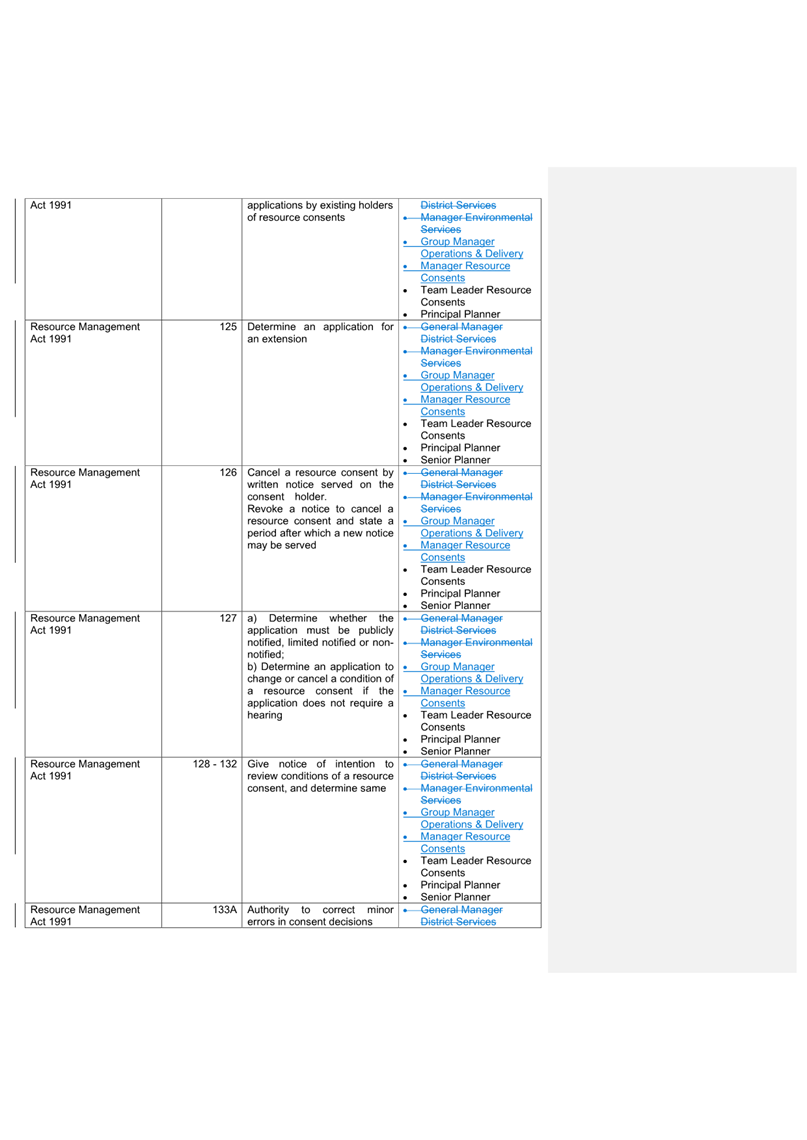












|
Ordinary Council Meeting Agenda
|
8 August 2024
|

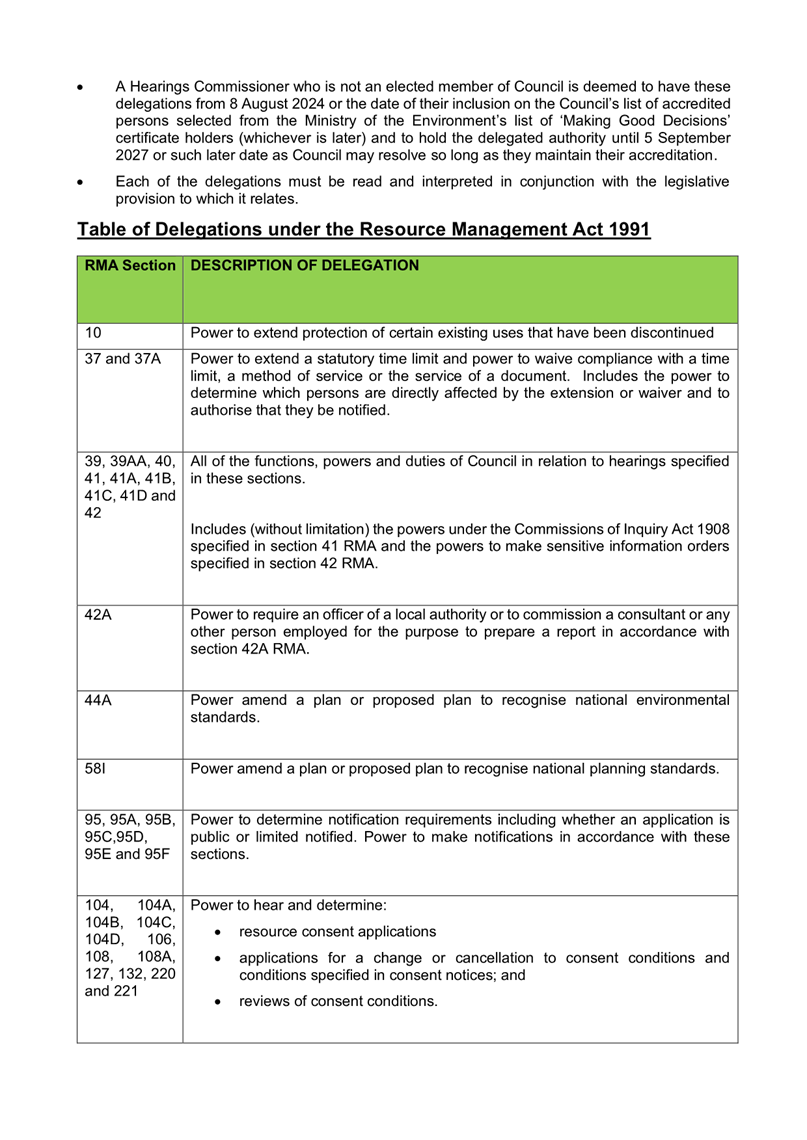

6.6 New
Ground Lease to Te Rarawa Rugby Club Incorporated over Rarawa Memorial Domain Recreation
Reserve
File
Number: A4799176
Author: Michelle
Rockell, Team Leader - Property Management
Authoriser: Tania
Steen, Manager – Property & Facilities Management
Take Pūrongo / Purpose of the Report
To seek Council resolution on the granting of a new ground
lease over recreation reserve, under Section 54 Reserves Act 1977 being Section
151 Block IV Ahipara SD and Lot 4 DP 366836 to Te Rarawa Rugby Club
Incorporated.
WhakarĀpopoto matua / Executive Summary
· Te Rarawa Rugby Club Incorporated have been established at the
Rarawa Memorial Domain Recreation Reserve since 1st December 1985.
· In September 2023 Te Rarawa Rugby Club Incorporated formally and
requested a new lease.
· There is no existing Reserve Management Plan for Rarawa Memorial
Domain Recreation Reserve.
· The Reserves Act 1977 requires public consultation on the issuing of
a lease over a Recreation Reserve when no Reserve Management Plan is in place.
· A report was presented to the Te Hiku Community Board on 12th
December 2023 who resolved to recommend the initiation of public consultation.
Resolution 2023/119.
· Council approved public consultation on 8th February
2024, which ran from 2nd to 30th April 2024.
· A total of 100 submissions were received. 99 were in support of the
proposal and 1 was against the proposal. One person was heard at the 21st June
2024 Te Hiku Community Board meeting to voice their support of the lease.
· On 16 July 2024 a report was presented to the Te Hiku Community
Board for recommendation to Council on the granting of the lease.
|
tŪtohunga
/ Recommendation
That Council:
a) approve
a new ground lease to Te Rarawa Rugby Club Incorporated over part of the
Rarawa Memorial Domain Recreation Reserve being Section 151 Block IV Ahipara
SD, approximately 40,468 square metres, held in New Zealand Gazette 1979,
page 1202 and Recreation Reserve held in Record of Title 308444, being of Lot
4 DP 366836, approximately 6010 square metres.
The terms of the proposed
lease shall be:
· Term:
30 Years (15+15);
· Rental:
As per FNDC Fees and Charges Schedule for a Community Lease;
· $118
plus GST for 2023/24 and reviewed annually in conjunction with the FNDC Fees
and Charges Schedule;
b) with further conditions negotiated and agreed upon by the Group Manager
Delivery and Operations, and Te Rarawa Rugby Club Incorporated.
|
1) TĀhuhu kŌrero / Background
On 16 July 2024, Te Hiku Community Board passed the
following resolution:

Rarawa Memorial Domain Recreation Reserve is vested in
Council and has been occupied by Te Rarawa Rugby Club Incorporated, since 1985.
Te Rarawa Rugby Club Incorporated occupy the site in
conjunction with Te Rarawa Football Club.
In September 2023, Te Rarawa Rugby Club Incorporated
approached Council formally seeking a new ground lease.
Te Rarawa Rugby Club Incorporated is a well-established
group with 38 years of service to the local community. Their main
objective is to provide sport (primarily rugby but not limited) to the
Community of Ahipara and surrounding areas.
Te Rarawa Rugby Club Incorporated currently has 4 Junior
Rugby Teams, 1 Young Adult team and a Senior Mens & Senior Women’s
Team. Their total membership is approximately 180 with the expectation of
growth in 2024 with the addition of another Young Adult team.
With 2 playing fields, Te Rarawa Rugby Club Incorporated
provide the option of year-round training. Te Rarawa Rugby Club
Incorporated are seeking funding to upgrade and add new lights over the fields
and courts.
Te Rarawa Rugby Club Incorporated provide a Touch module
over the summer period hosting 8-10 teams comprised mainly of local Whanau of
all ages. Te Rarawa Rugby Club Incorporated also care for and maintain the two
courts (netball/tennis and basketball) as well as the cricket pitch located
between the second field & the Te Rarawa Football Club grounds.
Te Rarawa Rugby Club Incorporated club is the unofficial
Community Hall of Ahipara. It is used by the Ahipara School as an indoor
venue for major events, presentations, and Kapa Haka trainings. The field
and lights are essential for Emergency Services (such as safe landing of
helicopters) and the venue is utilised by the community as a Civil Defence hub.
Other local groups and organisations, including Te Hiku
Community Board, also utilise the space to provide activities for the
community. These activities range from Te Rarawa’s Relay for Life,
Ahipara Aroha’s Matariki Festival and Inter-School sports events.

Aerial view of proposed leased area in red.
2) matapaki me NgĀ KŌwhiringa /
Discussion and Options
The 2013 Minister of Conservation Reserves Act Delegations
provide for Local Authorities to wear the hat of the Minister for delegated
actions over vested recreation reserves.
Section 54(1) of the Reserves Act 1977 (“the
Act”) provides for Council, with the prior consent of the Minister, to
grant leases over recreation reserves. From 2013, prior consent of the Minister
is delegated to Council.
Section 54(2) Reserves Act 1977 requires public notification
of the proposed lease action where no current reserve management plan is in
place for the vested recreation reserve. There is no current reserve management
plan for the Rarawa Memorial Domain Recreation Reserve.
Council resolution to commence public consultation satisfies
the prior consent of the Minister and the public notice requirements.
Public Notification
Public Notice was advertised in
the Northern Advocate and ran from 1st April – 30th April 2024 as
required under the Reserve Act.
A total of 100 submissions were
received. 99 submissions were in support of the proposal, one was against the
proposal and one was heard to voice their support of the lease at the 21st
June 2024 Te Hiku Community Board meeting.
Section 54 of the Act (Leasing
powers in respect of recreation reserves) delegates to Council the granting of
the lease.
The options available for this
site are:
Option 1: Recommended
That Council:
a) approves
a new ground lease to Te Rarawa Rugby Club Incorporated over part of the Rarawa
Memorial Domain Recreation Reserve being Section 151 Block IV Ahipara SD,
approximately 40,468 square metres, held in New Zealand Gazette 1979, page 1202
and Section 151 Block IV Ahipara SD, held in Record of Title 308444, being of
Lot 4 DP 366836, approximately 6010 square metres.
The terms of the proposed lease
shall be:
· Term:
30 Years (15+15)
· Rental:
As per FNDC Fees and Charges Schedule for a Community Lease.
· $118
plus GST for 2023/24 and reviewed annually in conjunction with the FNDC Fees
and Charges Schedule.
b) with
further conditions negotiated and agreed upon by the Group Manager Delivery and
Operations, and Te Rarawa Rugby Club Incorporated
Option 1 will allow Te Rarawa Rugby Club Incorporated to
continue providing their service to the community.
Option 2:
a. Decline
Te Rarawa Rugby Club Incorporated request for a new ground lease
b. Ask
Te Rarawa Rugby Club Incorporated to remove any existing building(s) and
associated assets from the reserve and reinstate the recreation reserve at
their cost.
TAKE TŪTOHUNGA
/ REASON FOR THE RECOMMENDATION
Te Rarawa Rugby Club Incorporated provide a beneficial
service to the community and requiring them to vacate the land will be
detrimental to the Community, Whānau and Tamariki of the area.
Te Rarawa Rugby Club Incorporated require certainty of a
long-term lease for funding purposes to carry out development projects over the
Domain.
As per the FNDC Parks and Reserves Policy 2022, Council can
grant exclusive leases to part or all of a reserve for a maximum term of 15
years with a further right of renewal for 15 years if it deems such terms to be
appropriate.
Public consultation enabled Te Hiku Community Board to
assess the community’s engagement with the Te Rarawa Rugby Club
Incorporated proposal and to determine if the granting of this lease is the
best option for the community.
3) PĀnga PŪtea me ngĀ
wĀhanga tahua / Financial Implications and Budgetary Provision
The lease will provide for the lessee to continue to be
responsible for all ongoing maintenance of the associated green space.
The lease will provide for the lessee to be responsible for
the payment of all utility charges, rates and insurances.
Should a lease not be provided to Te Rarawa Rugby Club
Incorporated, and the land reinstated to reserve, Council will become
responsible for any ongoing maintenance of the site, placing more pressure on
the Reserve’s maintenance budget.
Āpitihanga
/ Attachments
Nil
Hōtaka Take Ōkawa / Compliance Schedule:
Full consideration has been given to the provisions of the
Local Government Act 2002 S77 in relation to decision making, in particular:
1. A
Local authority must, in the course of the decision-making process,
a) Seek
to identify all reasonably practicable options for the achievement of the
objective of a decision; and
b) Assess
the options in terms of their advantages and disadvantages; and
c) If
any of the options identified under paragraph (a) involves a significant
decision in relation to land or a body of water, take into account the
relationship of Māori and their culture and traditions with their
ancestral land, water sites, waahi tapu, valued flora and fauna and other
taonga.
2. This
section is subject to Section 79 - Compliance with procedures in relation to
decisions.
|
He Take Ōkawa /
Compliance Requirement
|
Aromatawai Kaimahi /
Staff Assessment
|
|
State the level of significance (high or low) of the
issue or proposal as determined by the Council’s
Significance and Engagement Policy
|
Medium
|
|
State the relevant Council policies (external or
internal), legislation, and/or community outcomes (as stated in the LTP) that
relate to this decision.
|
FNDC Reserves Policy: The Policy supports a long-term
lease being offered to community orientated groups wanting a permanent base.
The Reserves Act 1977: Section 119 and 120 require that
public consultation be initiated prior to the granting of a lease
|
|
State whether this issue or proposal has a District wide
relevance and, if not, the ways in which the appropriate Community
Board’s views have been sought.
|
This does not have District wide relevance. Delegation
to the relevant Community Board to provide recommendations to the Council in
respect of applications for the use and/or lease of reserves not contemplated
by an existing reserve management plan.
|
|
State the
possible implications for Māori and how Māori have been provided
with an opportunity to contribute to decision making if this decision is
significant and relates to land and/or any body of water.
State the
possible implications and how this report aligns with Te Tiriti o Waitangi /
The Treaty of Waitangi.
|
Far
North District Council recognises the significant role of tangata whenua as
set out in the Working with Māori chapter in the Long-Term Plan
2021-2031. It is important to notify tangata whenua in the Ahipara locality
of the lease proposal prior to the public consultation. Te Hono was
approached to provide advice on who the main contacts were in the first
instance.
A letter was sent via email to Te Runanga o Te Rarawa
Chief Executive and Personal Assistant to inform the public consultation
process. Their Personal Assistant confirmed the receipt of this letter.
|
|
Identify persons likely to be affected by or have an
interest in the matter, and how you have given consideration to their views
or preferences (for example – youth, the aged and those with disabilities).
|
Public consultation and Iwi consultation was progressed
as per the Reserves Act 1977 and the FNDC Engagement Policy. This allowed us
to identify any people or groups who may be affected or have interest in the
matter.
|
|
State the financial implications and where budgetary
provisions have been made to support this decision.
|
All upgrade and maintenance costs fall to the
lessee.
The appropriate community rent for the land is set by
the FNDC Fees Charges Schedule.
|
|
Chief Financial Officer review.
|
The Chief Financial Officer has reviewed this report.
|
6.7 2024
Local Government New Zealand Annual General Meeting Remits
File
Number: A4803382
Author: Aisha
Huriwai, Manager - Democracy Services
Authoriser: Jacine
Warmington, Group Manager - Strategic Relationships
Take Pūrongo / Purpose of the Report
To confirm the Council’s position on proposed remits
for the 2024 Local Government New Zealand Annual General Meeting (AGM).
WhakarĀpopoto matua / Executive Summary
· 8 remits are listed on the 2024 Local Government New Zealand AGM
agenda.
· This report includes advice from staff with subject matter expertise
in relation to each remit.
· Kahika-Mayor Tepania will be attending the LGNZ AGM with voting
rights on behalf of the Far North District Council.
· Adopted Remits will be further discussed at National Council to
determine resourcing to further remits.
|
tŪtohunga
/ Recommendation
That Council support the following remits, in
order of priority:
a) Representation
Reviews
b) Entrenchment
of Māori
Ward seats for local government
c) Local
government constituencies and wards should not be subject to referendum
d) Good
and services tax (GST) revenue sharing with local government
e) Appropriate
funding models for central government initiatives
f) Community
Services Card
g) Proactive
lever to mitigate the deterioration of unoccupied buildings
h) Graduate
driver licensing system
|
1) TĀhuhu kŌrero / Background
EachLocal Government New
Zealand is the local government association founded in 1988. They represent the
interests of regional city and district councils who pay to be members.
The association holds an annual process called remits as
part of their work.
There are four criteria for remits:
1. The
remit is relevant to local government as a whole, not just a single zone,
sector or council.
2. The
remit relates to significant matters, including constitutional and substantive
policy, rather than matters that can be dealt with administratively.
3. The
remit concerns matters that can’t be addressed through channels other
than the AGM.
4. The
remit does not deal with issues already being actioned by LGNZ work programmes
or Strategy.
Remits can be submitted by zones or individual councils -
with endorsement from other councils.
Remits then go to a Remit Screening Committee. Once approved
by the Screening Committee remits form part of the LGNZ AGM agenda. Voting at
the AGM determines which remits will continue and the order of priority.
Following the AGM remits will go to National Council to assign resourcing as
part of the LGNZ work programme.
The Far North District Council is a member of the
association and Kahika-Mayor Tepania will attend the AGM that occurs alongside
the Annual LGNZ Conference.
2) matapaki me NgĀ KŌwhiringa /
Discussion and Options
This report is to present the confirmed remits and with
advice from technical staff or subject matter experts, seeks an FNDC position
to inform the vote of the Mayor as the FNDC representative at the LGNZ AGM.
|
Remit title
|
Asking:
|
Staff advice
|
|
Representation Reviews
|
That LGNZ advocate for changes that support the
provision of timely and accurate regional
and sub-regional population data to councils for use in
council representation reviews.
|
Support.
The delivery of timely and accurate information is always
beneficial. Representation reviews are often conducted with out of date
information on population figures.
|
|
Community Services Card
|
That LGNZ advocate to Central Government to amend the
Health Entitlement Cards
Regulations 1993 so that the cardholder can use the
Community Services Card as evidence for the
purposes of accessing Council services which would otherwise
rely on a form of means testing.
|
Support.
Staff suggest supporting this however there are no fee
structures within FNDC fees and charges that would be able to accept a
Community Services Card alone for discounted rates.
|
|
Local Government Constituencies
and wards should not be subject to referendum
|
That LGNZ lobbies central government to ensure that
Māori wards and constituencies are
treated the same as all other wards in that they should
not be subject to a referendum. We oppose the idea that Māori wards
should be singled out and forced to suffer a public referendum.
|
Support.
This remit and Entrenchment of Māori ward seats for local
government which was supported by FNDC via Zone 1.
|
|
Entrenchment of Māori wards seats for
local government
|
That LGNZ proactively promote and lobby to entrench the
Māori Wards and Constituencies for the 64 councils which currently have
these, to require the support of a supermajority of parliament should either
parliament or councils seek their removal.
|
Support.
This remit was submitted by Northland Regional Council
following approval from Zone 1.
|
|
Graduated Driver Licensing System
|
That LGNZ advocate for changes to the fee structure for
driver licensing, better preparing young people for driver license testing,
and greater testing capacity in key locations throughout New
Zealand, in order to relieve pressure on the driver
licensing system and ensure testing can be conducted in a quick and efficient
manner.
|
Support.
There are a number of initiatives and programmes in place
across the Far North to support youth become licensed drivers. It is agreed
that the current fee structure is unaffordable for low socio-economic areas
such as the mid/far north.
|
|
Proactive lever to mitigate the deterioration of
unoccupied buildings
|
That LGNZ advocate to
Government:
• For legislative change enabling local
authorities to compel building owners to remediate
unoccupied derelict buildings and sites that have
deteriorated to a state where they
negatively impact the amenity of the surrounding area.
• To incentivise repurposing vacant buildings to
meet region-specific needs, for example,
accommodation conversion.
|
Support.
Staff support mechanisms that require commercial property
owners to maintain properties to a standard. We would need more detail to
understand the impact it could have on the Far North and Māori
landowners.
|
|
Appropriate funding models for central government
initiatives
|
That LGNZ proactively promote and lobby for the
development of a more equitable and
appropriate funding model for central government
initiatives.
|
Support.
This remit was submitted by Northland Regional Council
following approval from Zone 1.
|
|
Goods and Services Tax (GST) revenue sharing with local
government
|
That LGNZ be proactive in lobbying central government on
sharing GST revenue with local
government, derived from local government rates and
service fees related to flood protection
mitigation, roading, and three waters, for investment in
these areas.
|
Support.
This remit was submitted by Northland Regional Council
following approval from Zone 1.
|
TAKE TŪTOHUNGA
/ REASON FOR THE RECOMMENDATION
Reasons for recommendation for each remit are included in
the table above.
3) PĀnga PŪtea me ngĀ
wĀhanga tahua / Financial Implications and Budgetary Provision
There are no financial implications or need for budgetary
provision in supporting, or otherwise any of the proposed remits.
Should the remits continue to be pursued by LGNZ it could
save Council funding in the long term by pursuing policies nationally rather
than by region or district.
Āpitihanga
/ Attachments
1. 2024_AGM_remit_papers
- A4806655 ⇩ 
Hōtaka Take Ōkawa / Compliance Schedule:
Full consideration has been given to the provisions of the
Local Government Act 2002 S77 in relation to decision making, in particular:
1. A
Local authority must, in the course of the decision-making process,
a) Seek
to identify all reasonably practicable options for the achievement of the
objective of a decision; and
b) Assess
the options in terms of their advantages and disadvantages; and
c) If
any of the options identified under paragraph (a) involves a significant
decision in relation to land or a body of water, take into account the
relationship of Māori and their culture and traditions with their ancestral
land, water sites, waahi tapu, valued flora and fauna and other taonga.
2. This
section is subject to Section 79 - Compliance with procedures in relation to
decisions.
|
He Take Ōkawa /
Compliance Requirement
|
Aromatawai Kaimahi /
Staff Assessment
|
|
State the level of significance (high or low) of the
issue or proposal as determined by the Council’s
Significance and Engagement Policy
|
This is considered to be a matter of low significance.
While some of the proposed remits touch on matters that
could be of high significance this paper looks at whether further
conversations should be had nationally rather than specific outcomes for our
specific communities. There is also insufficient time to consult locally.
|
|
State the relevant Council policies (external or
internal), legislation, and/or community outcomes (as stated in the LTP) that
relate to this decision.
|
This report seeks the views of Council to feed into a
national process.
|
|
State whether this issue or proposal has a District wide
relevance and, if not, the ways in which the appropriate Community
Board’s views have been sought.
|
The views of the Community Board have not been sought
due to time constraints.
|
|
State the
possible implications for Māori and how Māori have been provided
with an opportunity to contribute to decision making if this decision is
significant and relates to land and/or any body of water.
State the
possible implications and how this report aligns with Te Tiriti o Waitangi /
The Treaty of Waitangi.
|
While some of the proposed remits touch on matters that
could be of high significance to Māori this paper looks at whether
further conversations should be had nationally rather than specific outcomes
for our specific communities.
|
|
Identify persons likely to be affected by or have an
interest in the matter, and how you have given consideration to their views
or preferences (for example – youth, the aged and those with
disabilities).
|
While some of the proposed remits touch on matters that
could be of high significance to Māori this paper looks at whether
further conversations should be had nationally rather than specific outcomes
for our specific communities.
|
|
State the financial implications and where budgetary
provisions have been made to support this decision.
|
There are no financial implications or need for
budgetary provision.
|
|
Chief Financial Officer review.
|
The Chief Financial Officer has not reviewed this
report.
|
|
Ordinary Council Meeting Agenda
|
8 August 2024
|


















































7 Ngā
Pūrongo Taipitopito / Information Reports
7.1 Community
Board Minutes - July 2024
File
Number: A4788880
Author: Imrie
Dunn, Democracy Advisor
Authoriser: Aisha
Huriwai, Manager - Democracy Services
TAKE PŪRONGO / Purpose of the Report
To provide an overview of
resolutions made by Community Boards with an opportunity for Chairpersons to
speak with Council about pertinent discussions held at Community Board.
WHAKARĀPOPOTO MATUA / Executive SummarY
Minutes from Te
Hiku, Kaikohe-Hokianga, and Bay of Islands-Whangaroa Community Board June 2024
meetings are attached for Council information.
|
TŪTOHUNGA
/ Recommendation
That Council note the following Community Board
minutes:
· 16 July 2024 Te
Hiku Community Board;
· 18 July 2024
Bay of Islands-Whangaroa Community Board; and
· 19 July 2024 Kaikohe-Hokianga
Community Board
|
tĀHUHU KŌRERO / Background
This report is to provide Council with an overview of
resolutions made at Community Board meetings and for Community Board
Chairpersons to raise any Community Board issues with Council.
MATAPAKI ME NGĀ KŌWHIRINGA /
Discussion and Next Steps
This is intended as an information report but shows on the
agenda as a standard report to place it earlier on the agenda.
From time-to-time Community Boards may make recommendations
to Council. This report is not considered to be the appropriate mechanism for
Council to make a decision from a Community Board recommendation. Council could
however move a motion to formally request a report on a particular matter for
formal consideration at a subsequent meeting. The report would then ensure that
Council have sufficient information to satisfy the decision-making requirements
under the Local Government Act 2002 (sections 77-79).
The minutes presented to this meeting include
recommendations to Council, which staff have requested be considered by Council
for the June meeting.
PĀNGA PŪTEA ME NGĀ WĀHANGA
TAHUA / Financial Implications and Budgetary Provision
There are no financial
implications or need for budget provision in considering this report.
Āpitihanga
/ Attachments
1. 2024-07-16
Te Hiku Community Board Minutes - A4780959 ⇩ 
2. 2024-07-18
Bay of Islands-Whangaroa Community Board Minutes - A4788045 ⇩ 
3. 2024-07-19
Kaikohe-Hokianga Community Board Minutes - A4790265 ⇩ 
|
Ordinary Council Meeting Agenda
|
8 August 2024
|


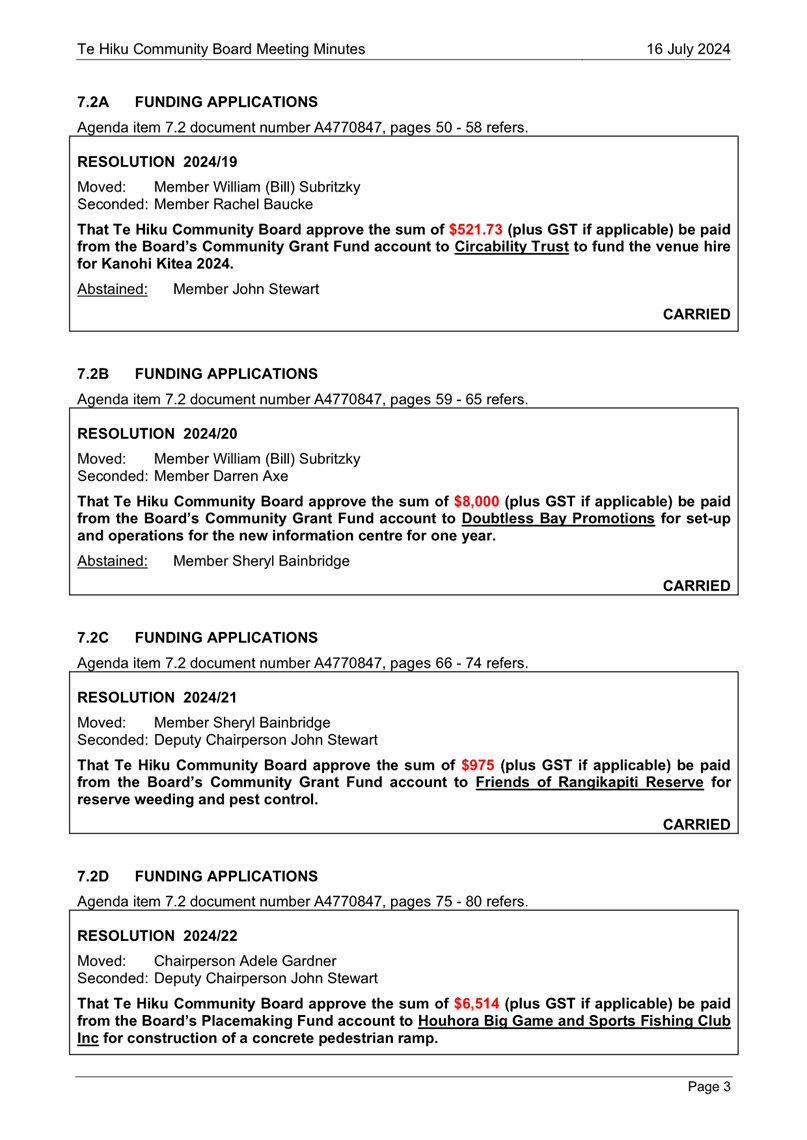



|
Ordinary Council Meeting Agenda
|
8 August 2024
|




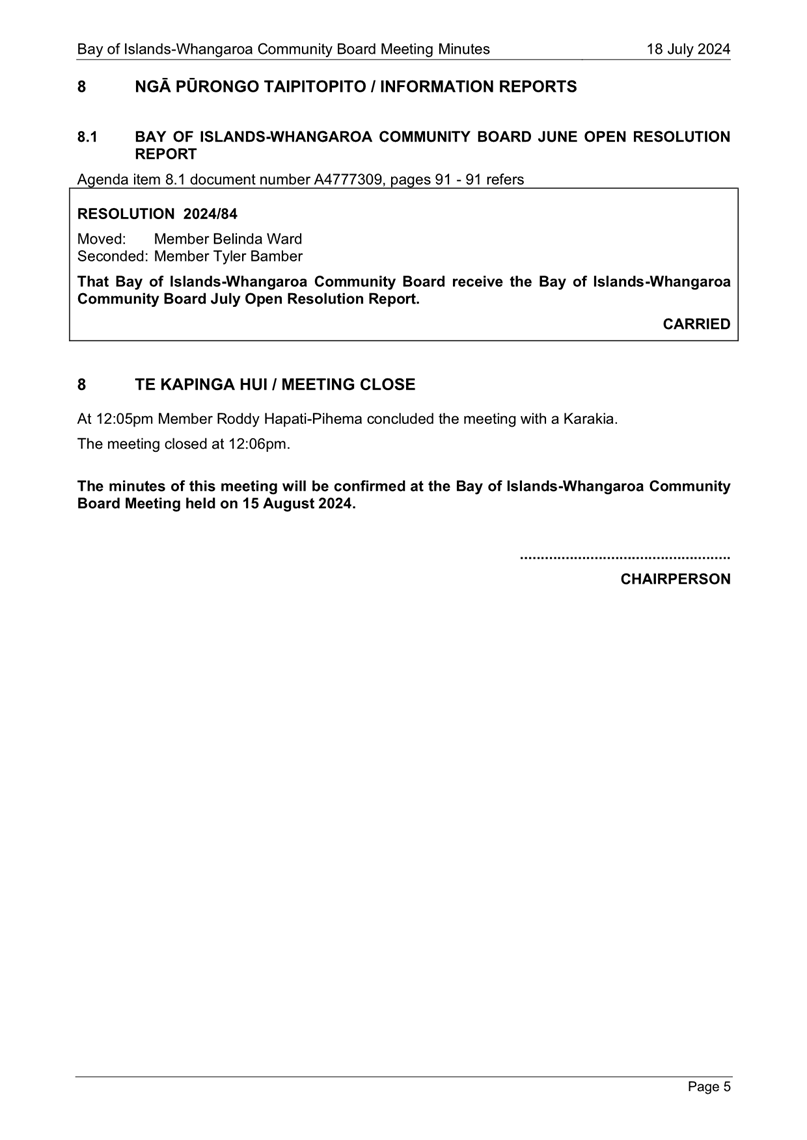
|
Ordinary Council Meeting Agenda
|
8 August 2024
|




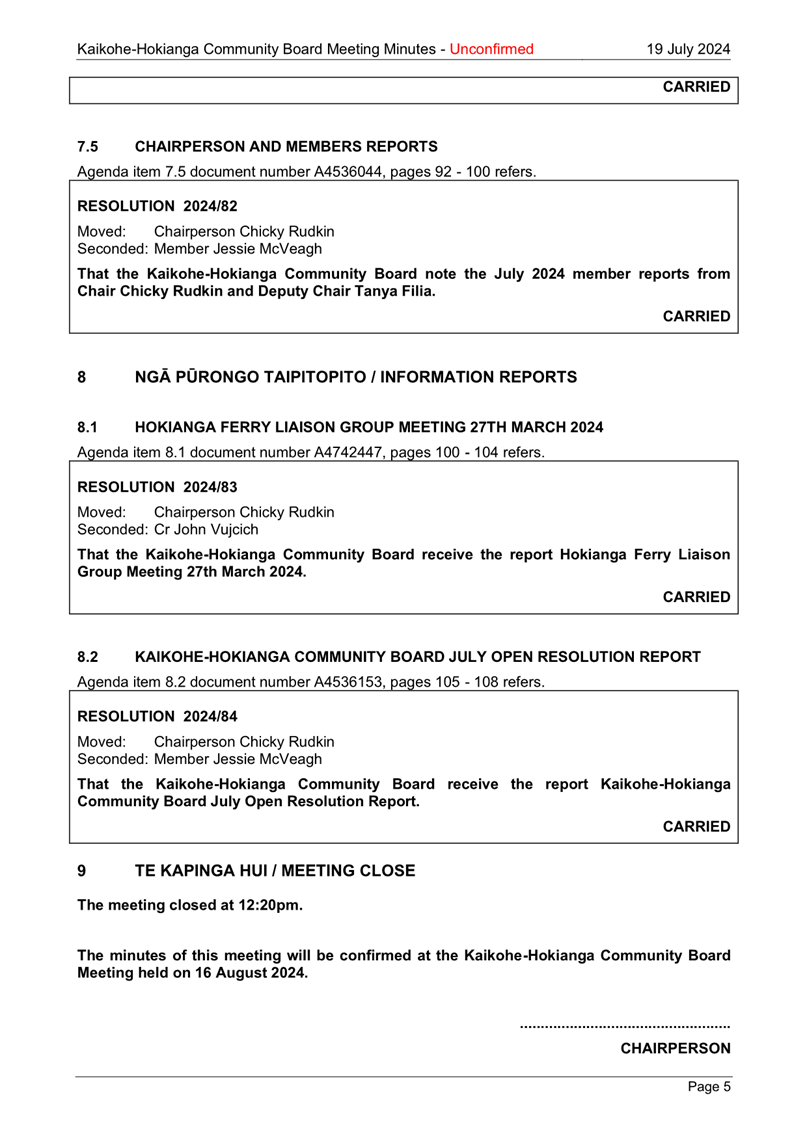
7.2 Mayor
and Councillor's Reports
File
Number: A4788859
Author: Imrie
Dunn, Democracy Advisor
Authoriser: Aisha
Huriwai, Manager - Democracy Services
TE TAKE PŪRONGO / Purpose of the Report
This report is a mechanism to have open communication and
transparency on activities undertaken by Councillors as elected
representatives.
|
NGĀ
TŪTOHUNGA / Recommendation
That Council note the reports submitted by Kahika Moko
Tepania, Kōwhai Kelly Stratford, Crs Hilda Halkyard-Harawira,
Tāmati Rākena and John Vujcich be received.
|
TE tĀHUHU KŌRERO / Background
Kahika-Mayor Tepania has
reintroduced Council members reports as a mechanism to have open communication
and transparency on activities undertaken by Councillors as elected
representatives. Members reports are compulsory for Councillors.
TE MATAPAKI ME NGĀ KŌWHIRINGA /
Discussion and Next Steps
Members reports are attached for
information.
REASON
FOR THE RECOMMENDATION
To formally receive the Mayor and
Councillor reports.
NGĀ PĀNGA PŪTEA ME NGĀ WĀHANGA
TAHUA / Financial Implications and Budgetary Provision
There are no financial implications
or the need for budgetary provision as a result of this report.
ngĀ
Āpitihanga / Attachments
1. Kahika
Moko Tepania Report - A4812213 ⇩ 
2. Kōwhai
Kelly Stratford Report - A4813976 ⇩ 
3. Member
Report Cr Hilda Halkyard-Harawira - A4813986 ⇩ 
4. Member
Report Cr Tāmati Rākena - A4819960 ⇩ 
5. Member
Report Cr John Vujcich Report - A4813966 ⇩ 
|
Ordinary Council Meeting Agenda
|
8 August 2024
|
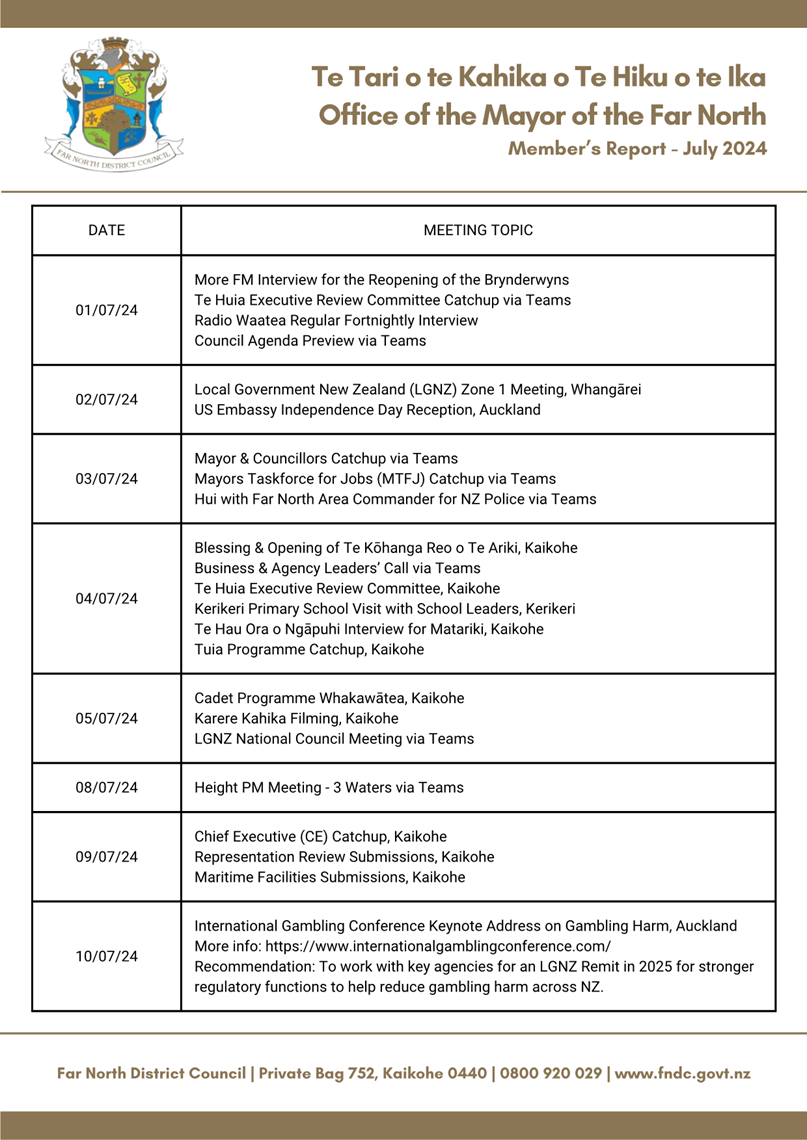
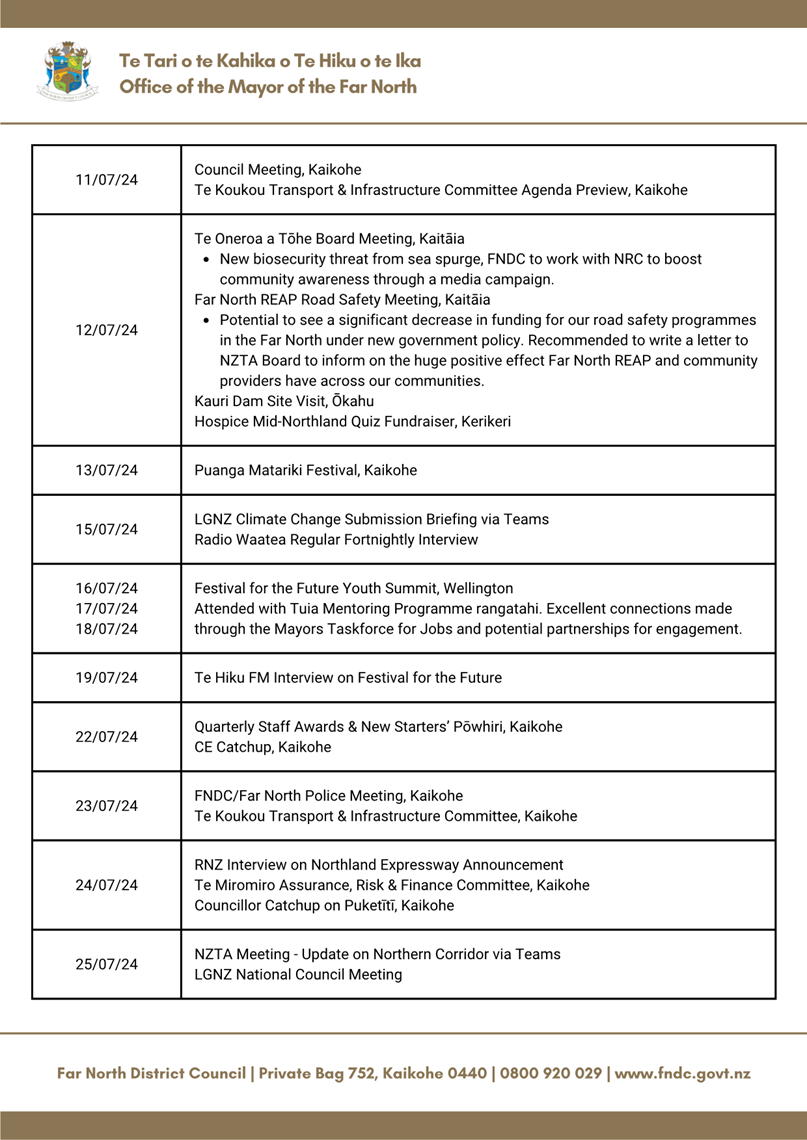
|
Ordinary Council Meeting Agenda
|
8 August 2024
|

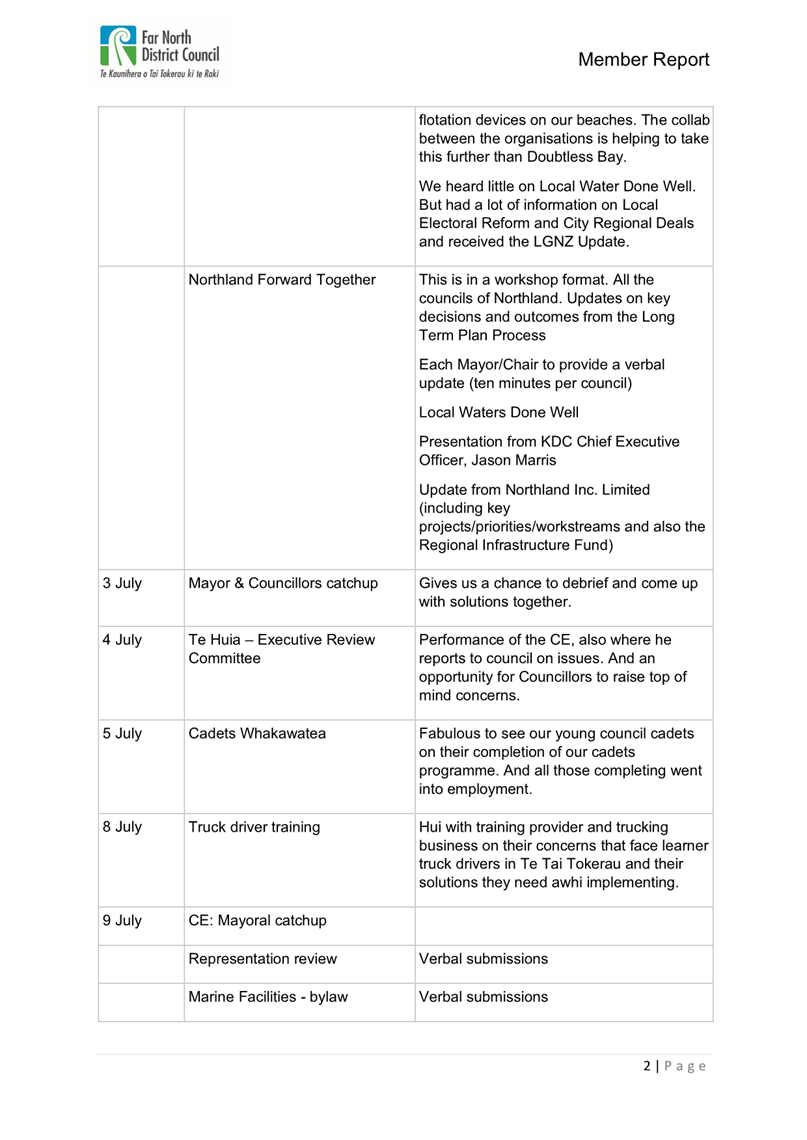
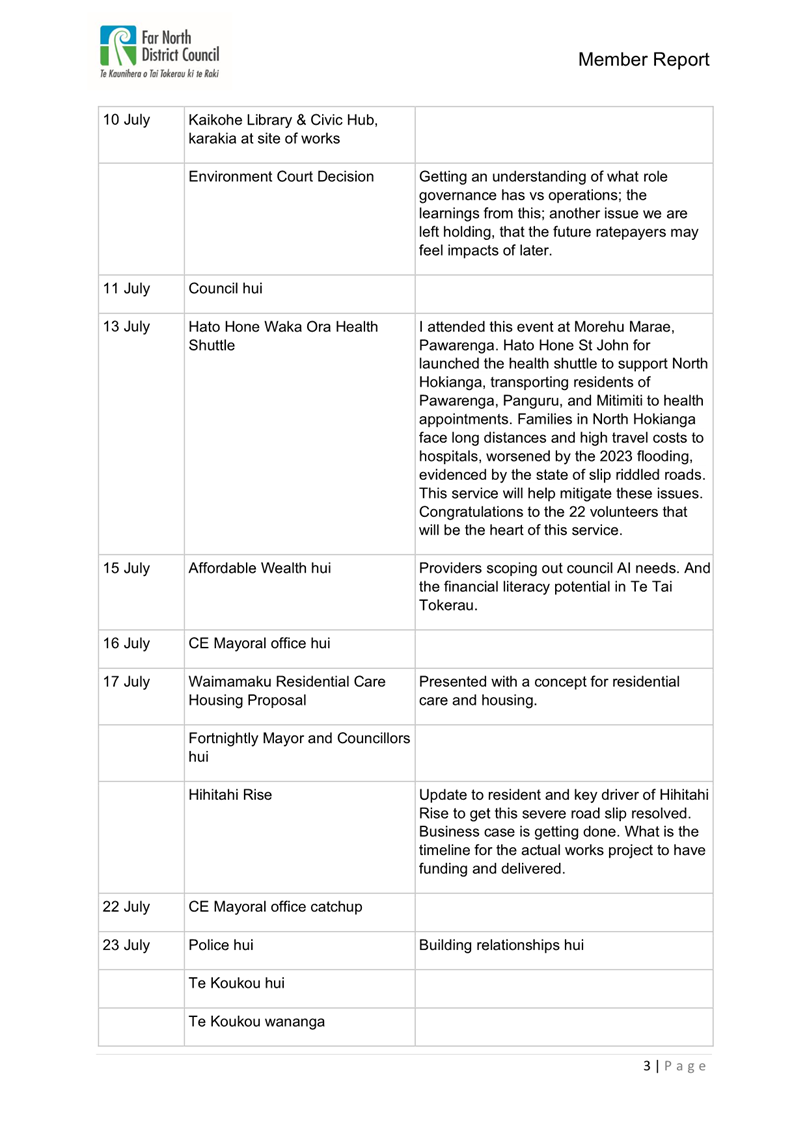
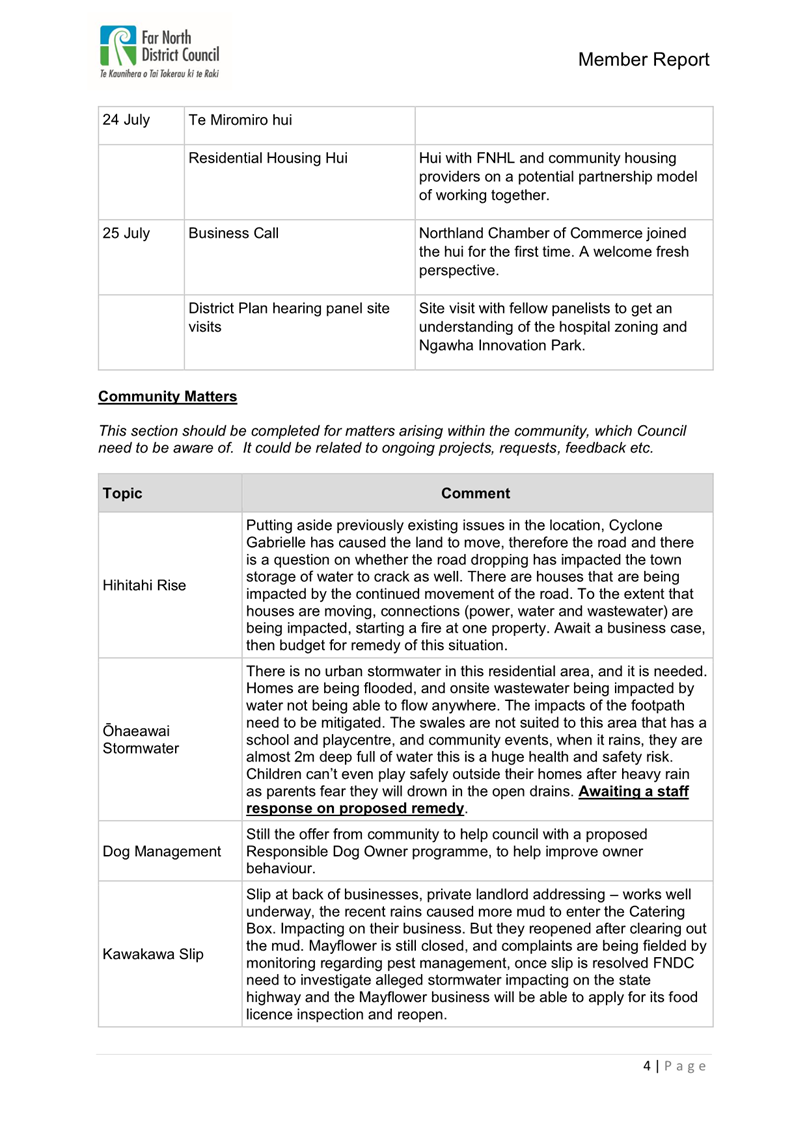
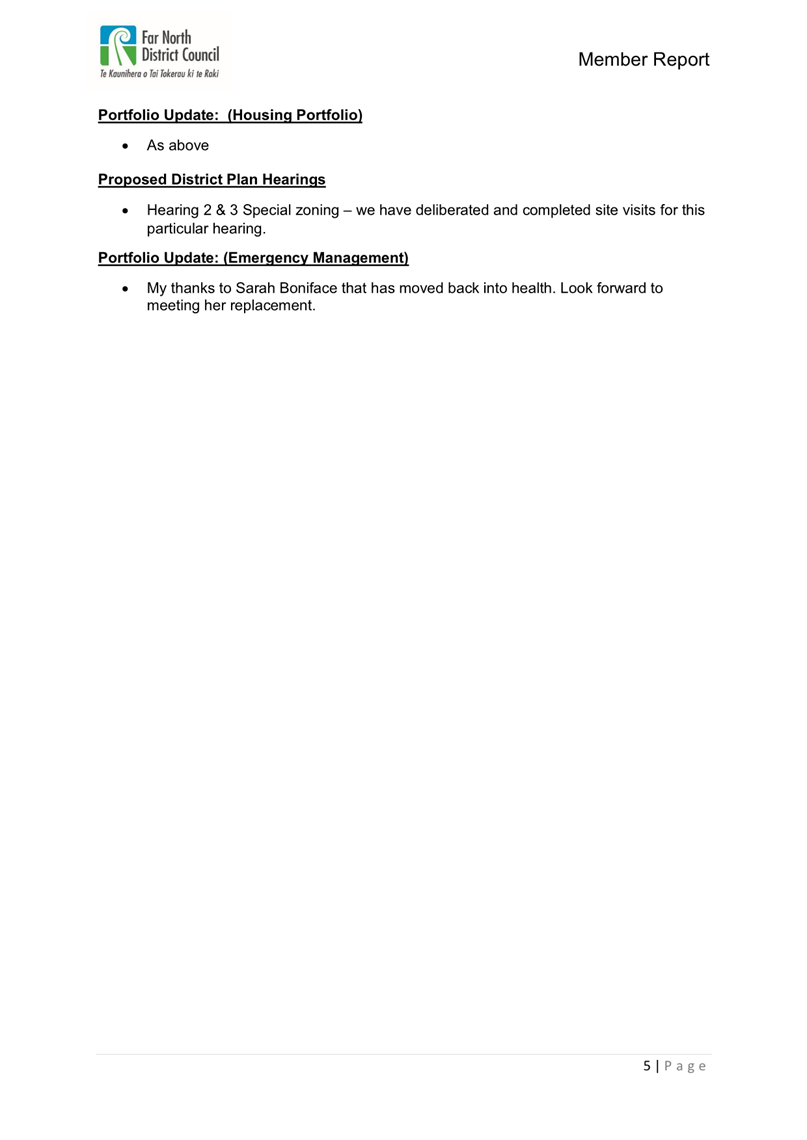
|
Ordinary Council Meeting Agenda
|
8 August 2024
|


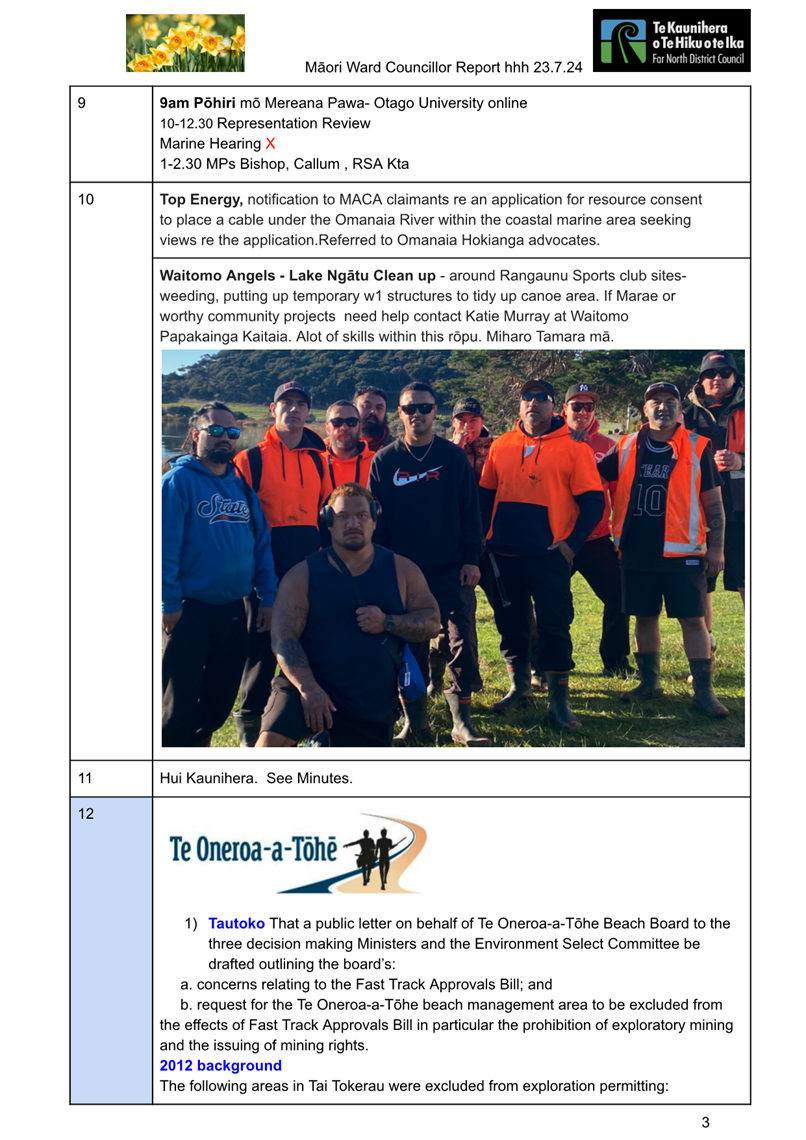
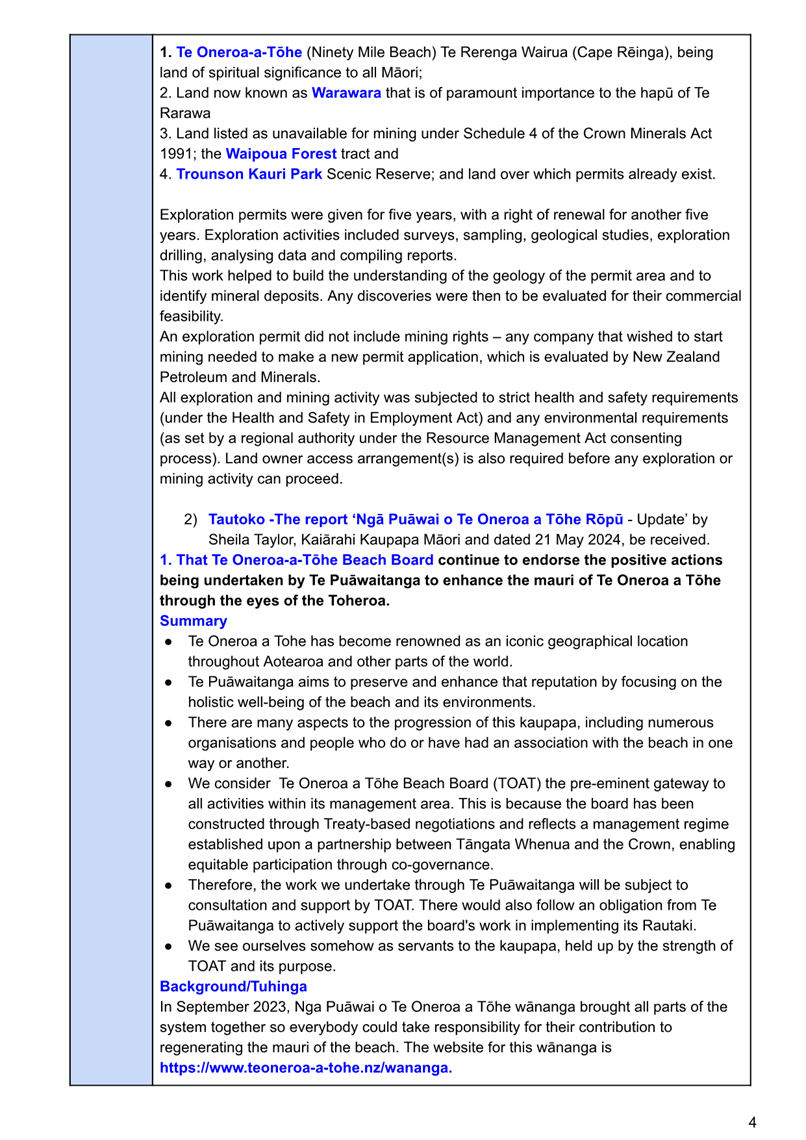
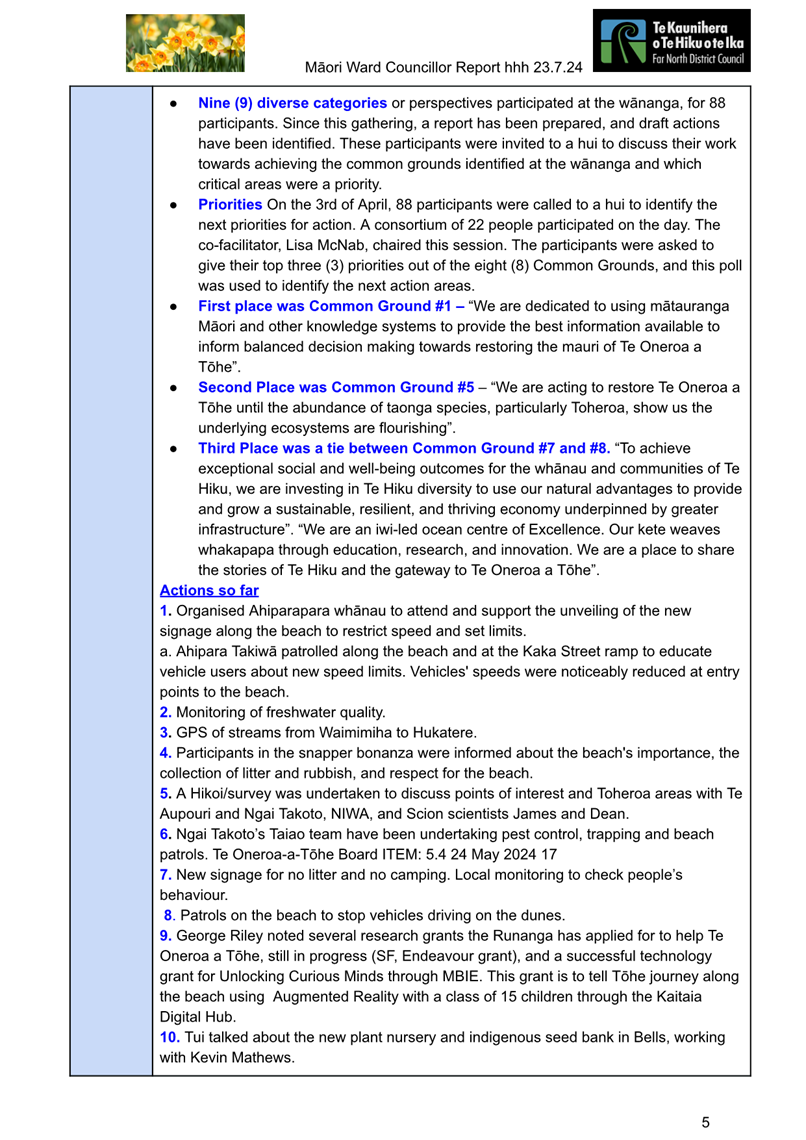

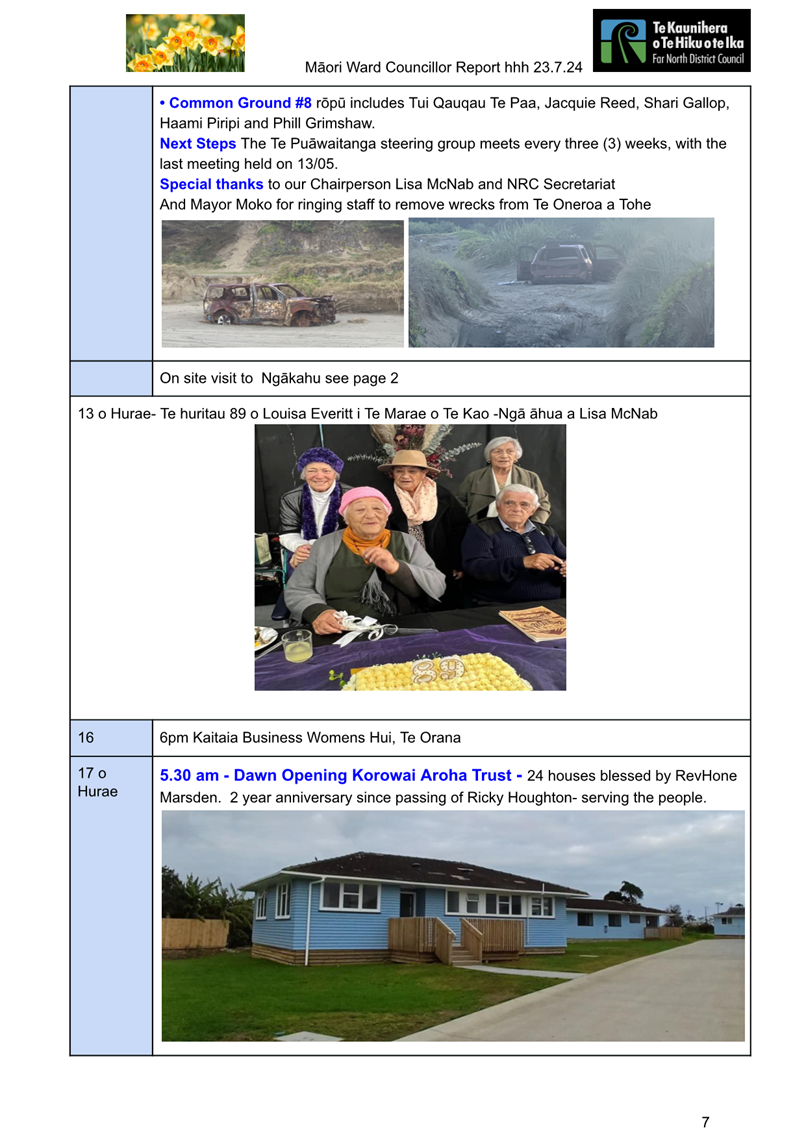
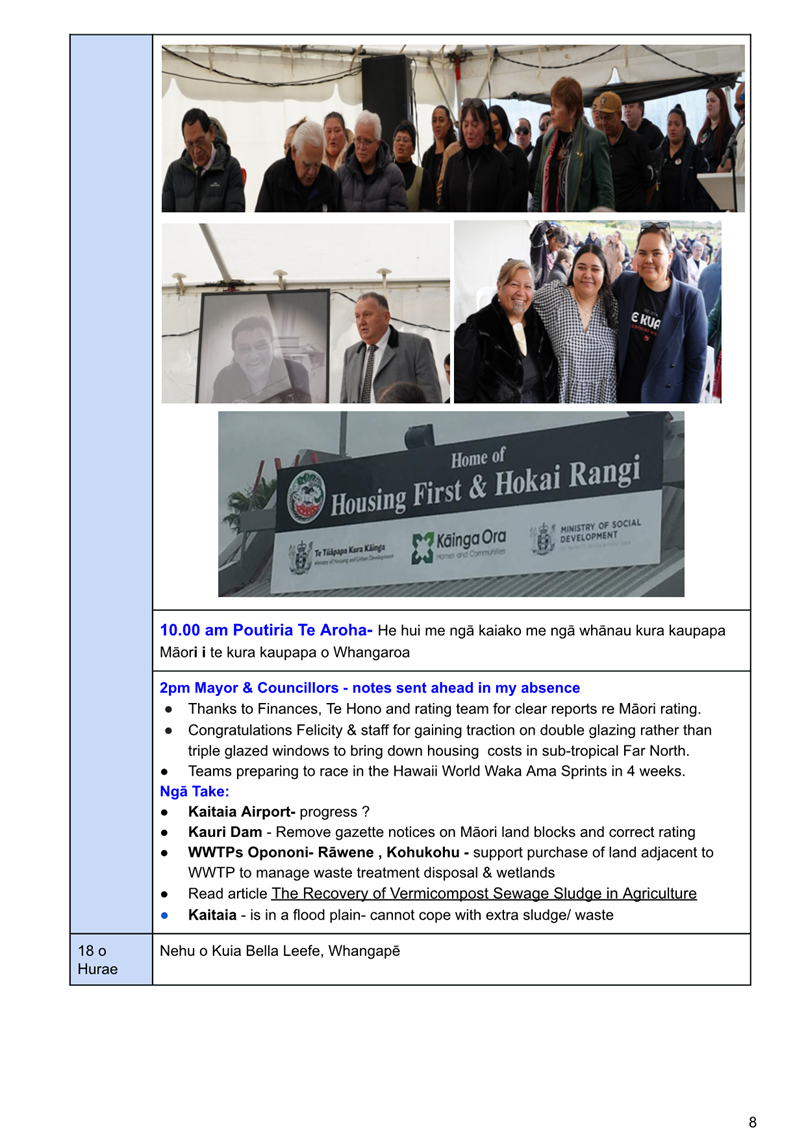
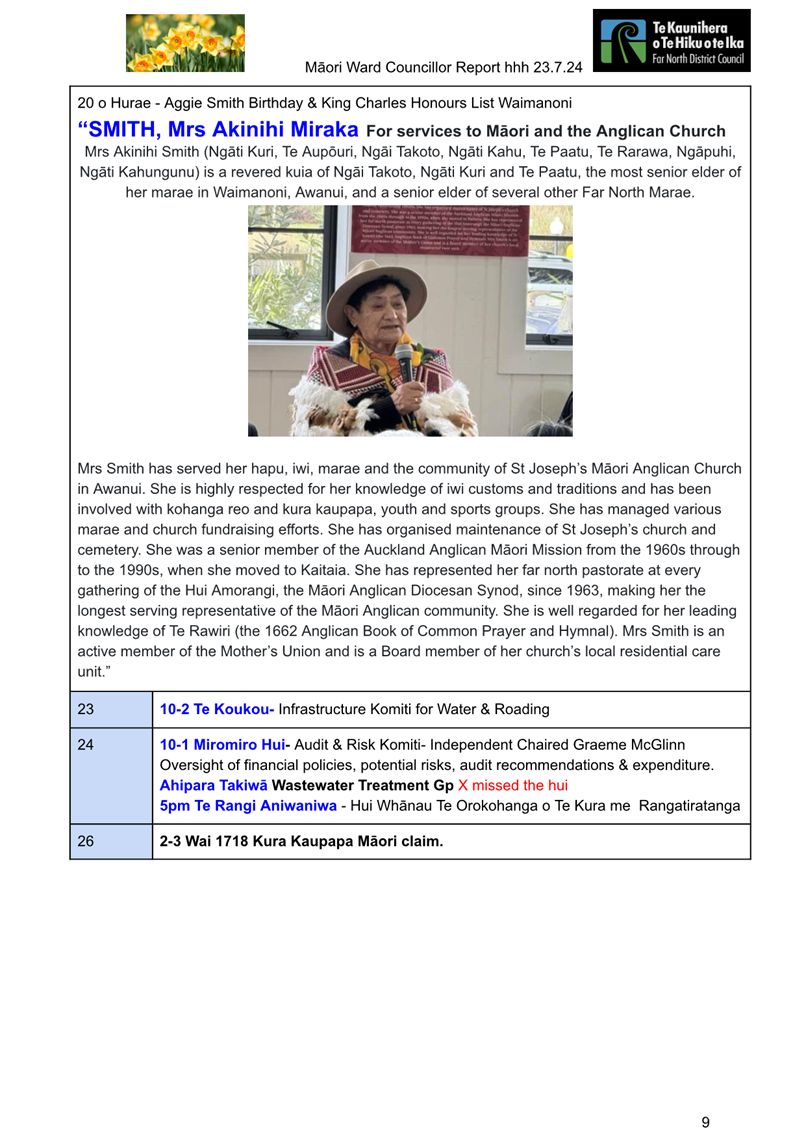
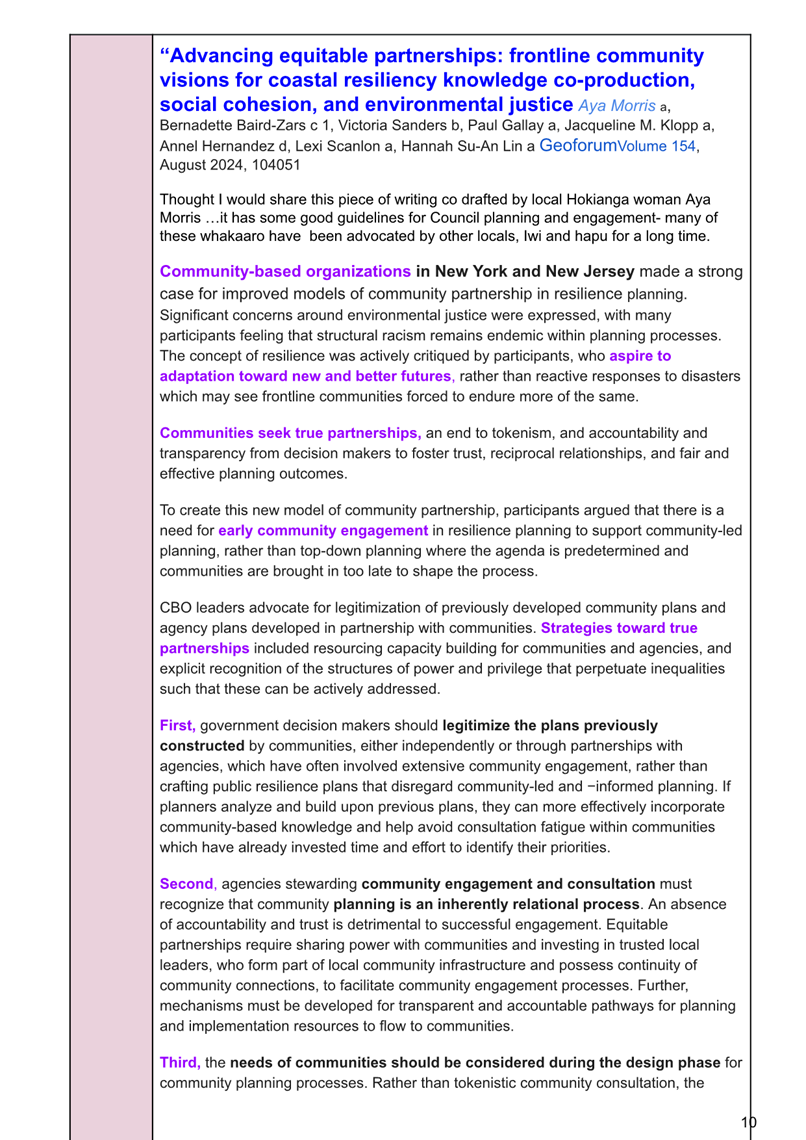
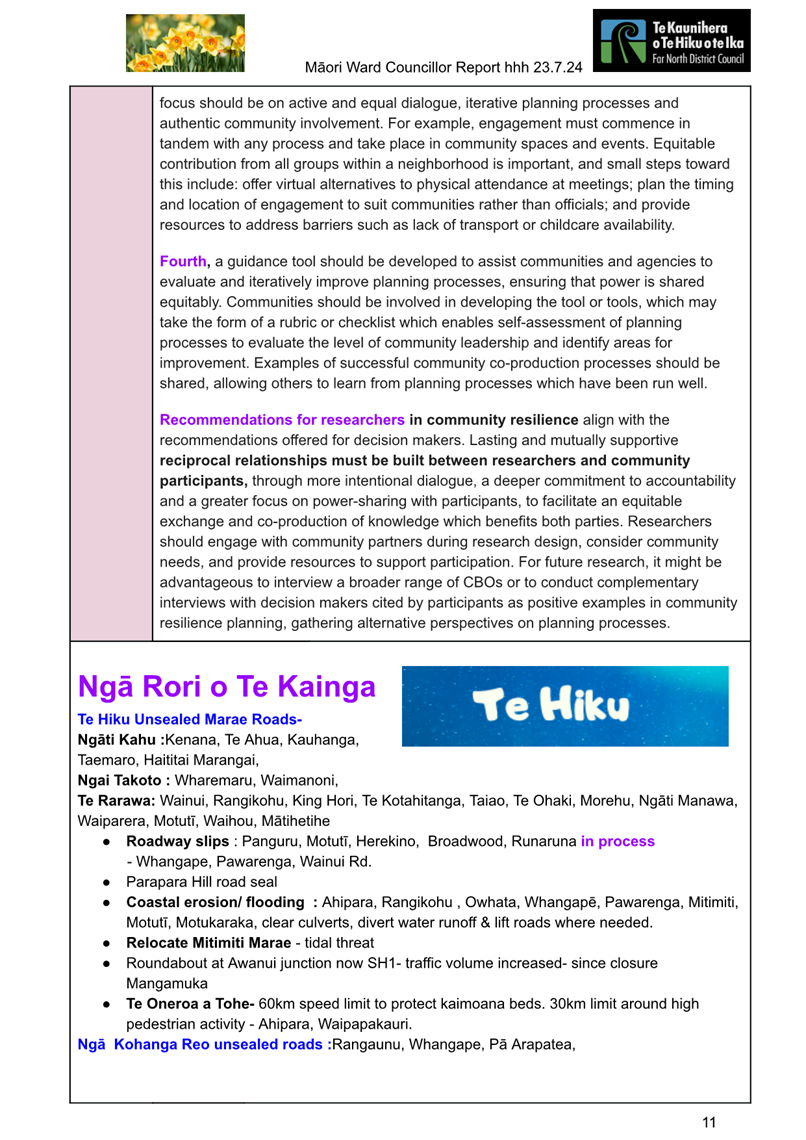
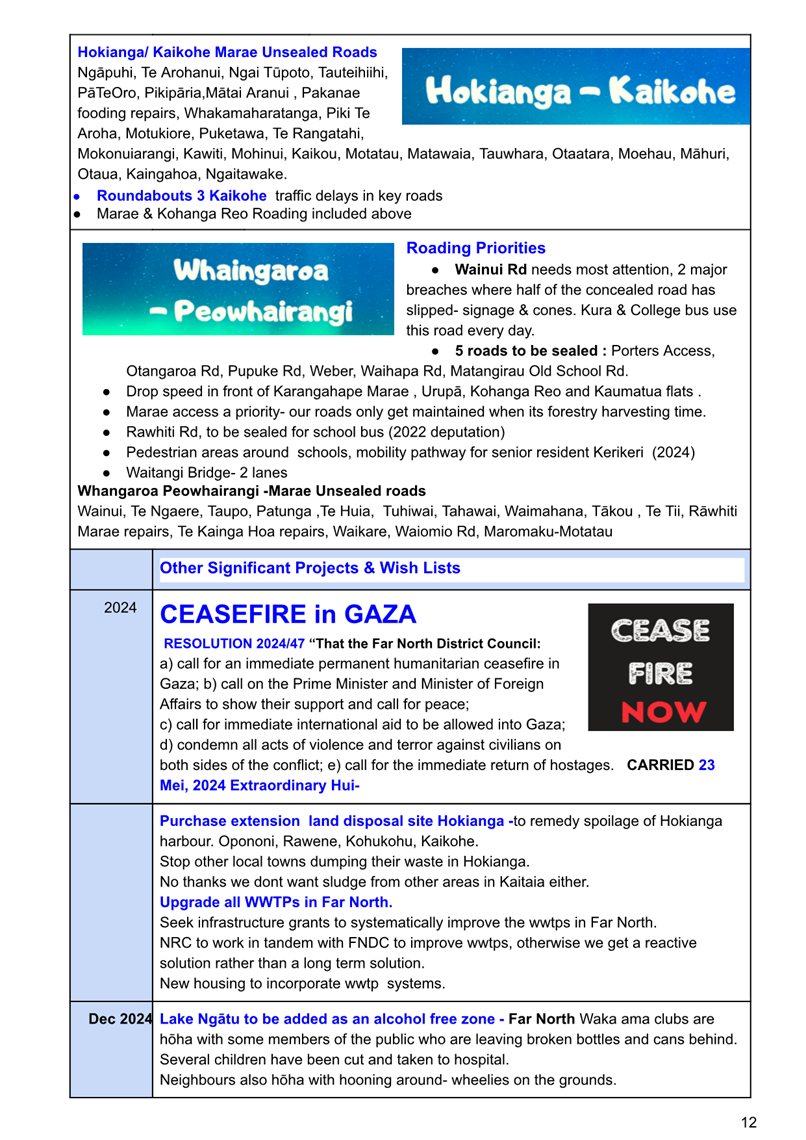
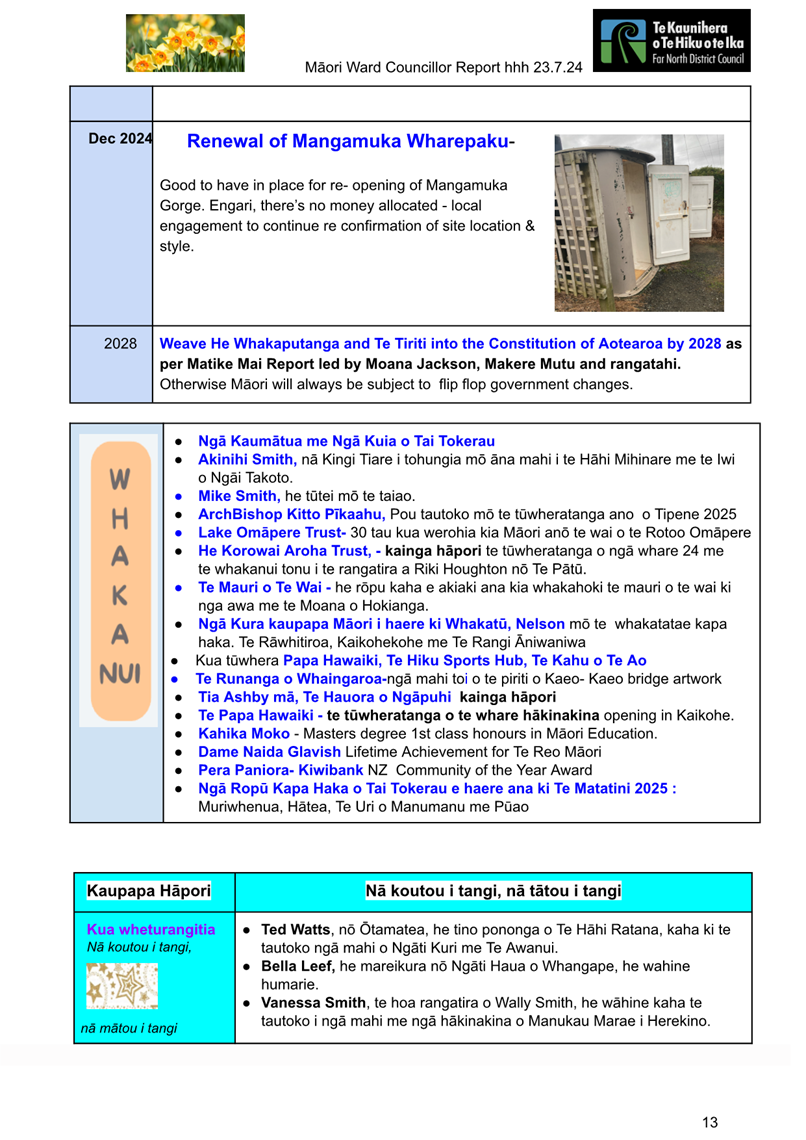
|
Ordinary Council Meeting Agenda
|
8 August 2024
|
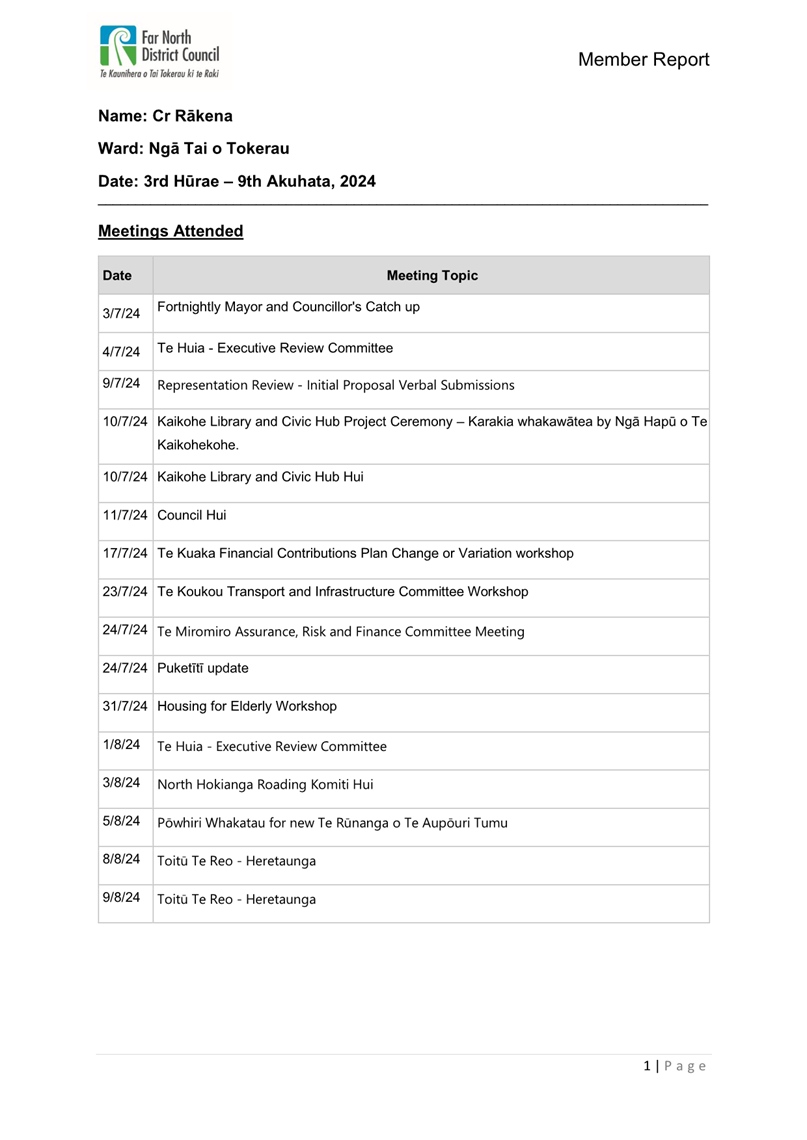
|
Ordinary Council Meeting Agenda
|
8 August 2024
|
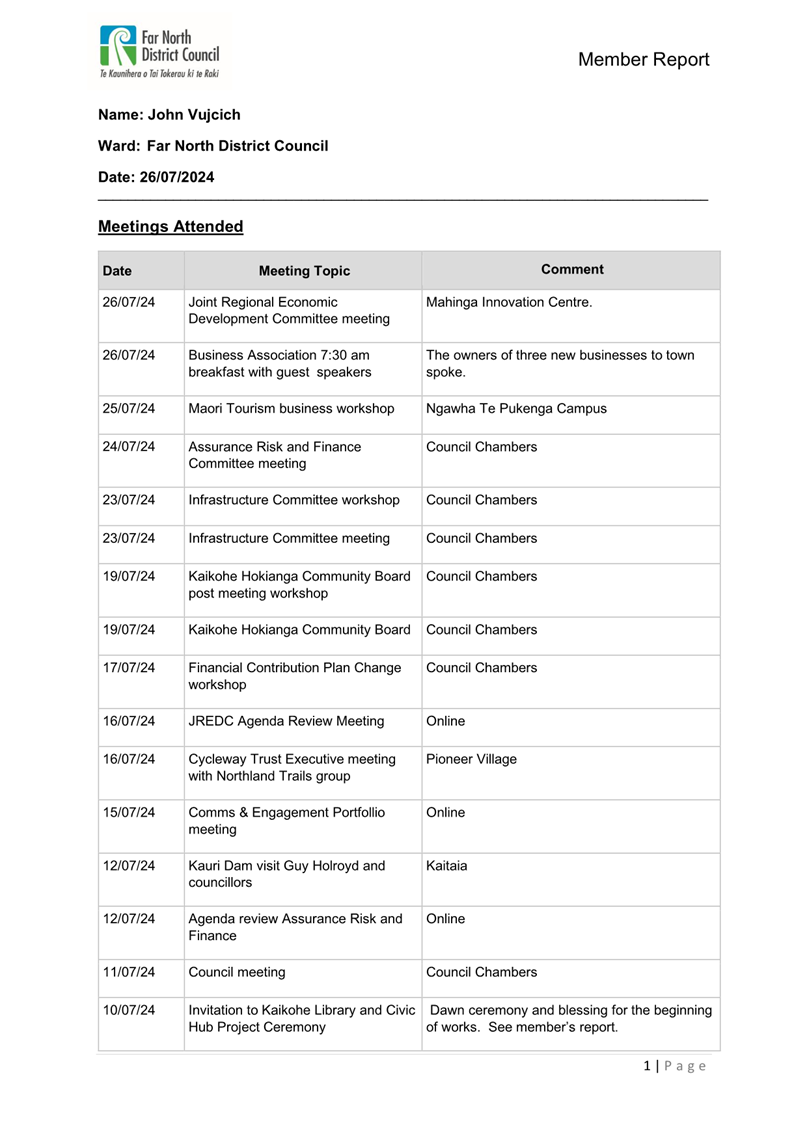

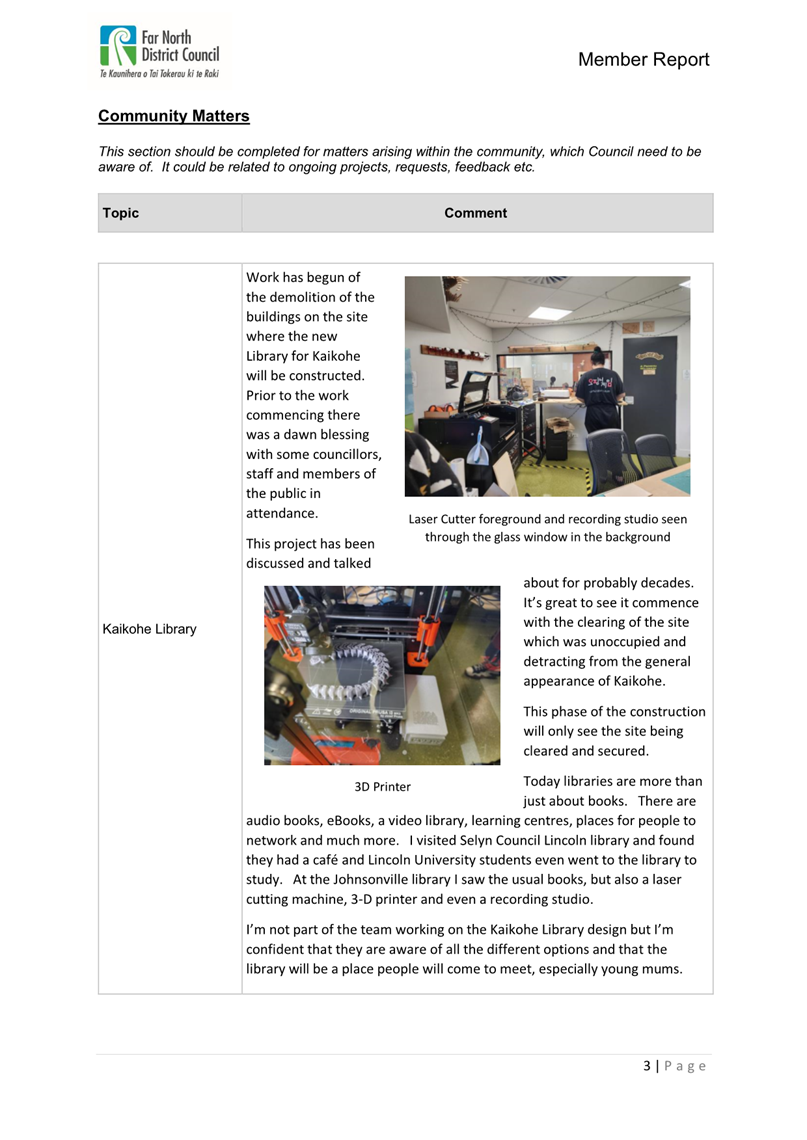
7.3 CE's
Quarterly Report - August 2024
File
Number: A4800184
Author: Philippa
Boye, Executive Assistant and Facilities Management
Authoriser: Emma
Healy, Chief of Staff
TAKE PŪRONGO / Purpose of the Report
The purpose of this
report is to provide Elected Members with an overview of key activities across
the organisation for quarter four of the 2023/2024 financial year.
WHAKARĀPOPOTO MATUA / Executive SummarY
The Chief
Executive’s report to Council presents an overview of activities that
Council undertakes.
|
TŪTOHUNGA
/ Recommendation
That Council receive the report CE's Quarterly Report -
August 2024 .
|
tĀHUHU KŌRERO / Background
The Chief
Executive’s report to Council is attached and covers a detailed overview
of progress against Council’s activities.
MATAPAKI ME NGĀ KŌWHIRINGA /
Discussion and Next Steps
This Report is for
information only.
PĀNGA PŪTEA ME NGĀ WĀHANGA
TAHUA / Financial Implications and Budgetary Provision
There are no financial
implications or budgetary provision needed as a result of this report.
Āpitihanga
/ Attachments
1. CE's
Quarterly Report to Council - August 2024 - A4800180 ⇩ 
|
Ordinary Council Meeting Agenda
|
8 August 2024
|
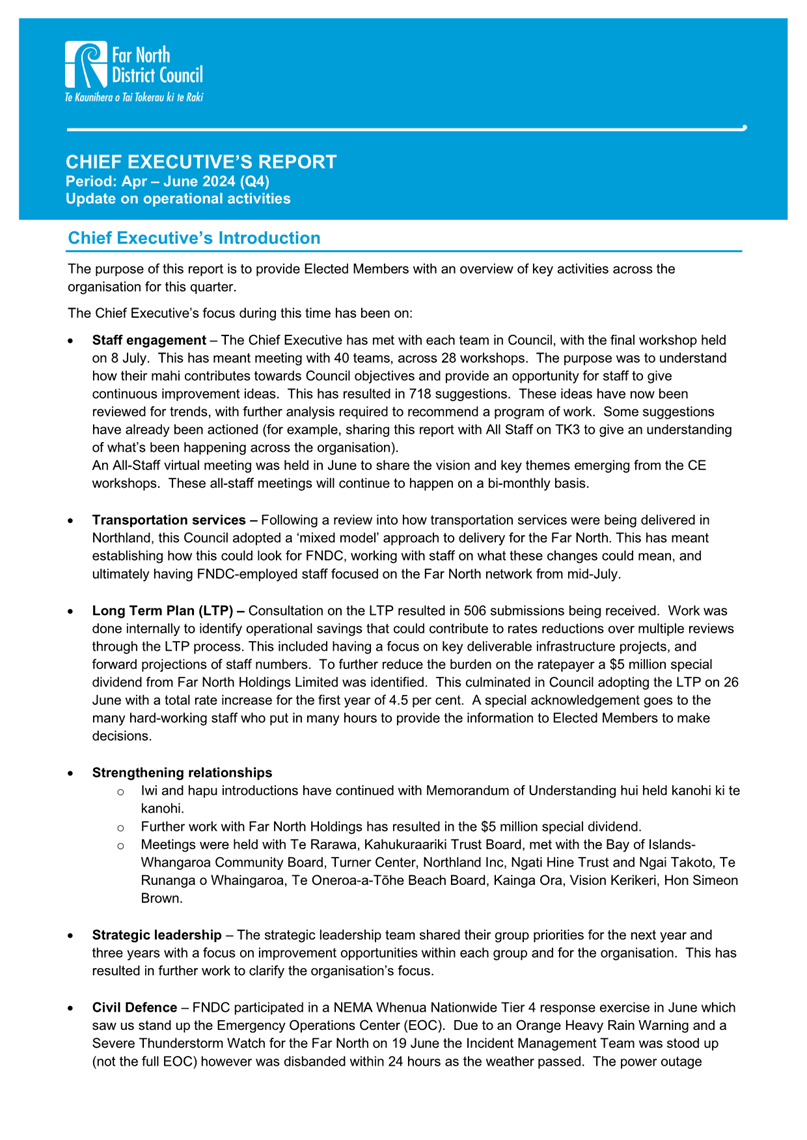
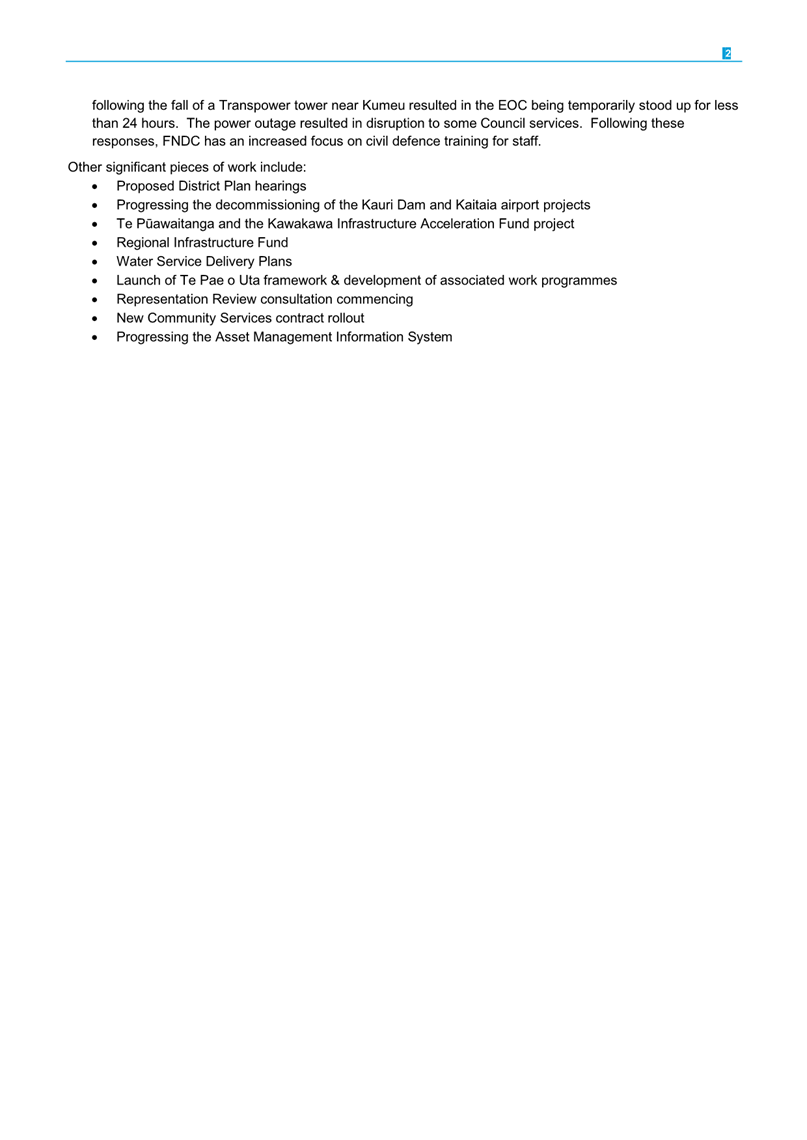
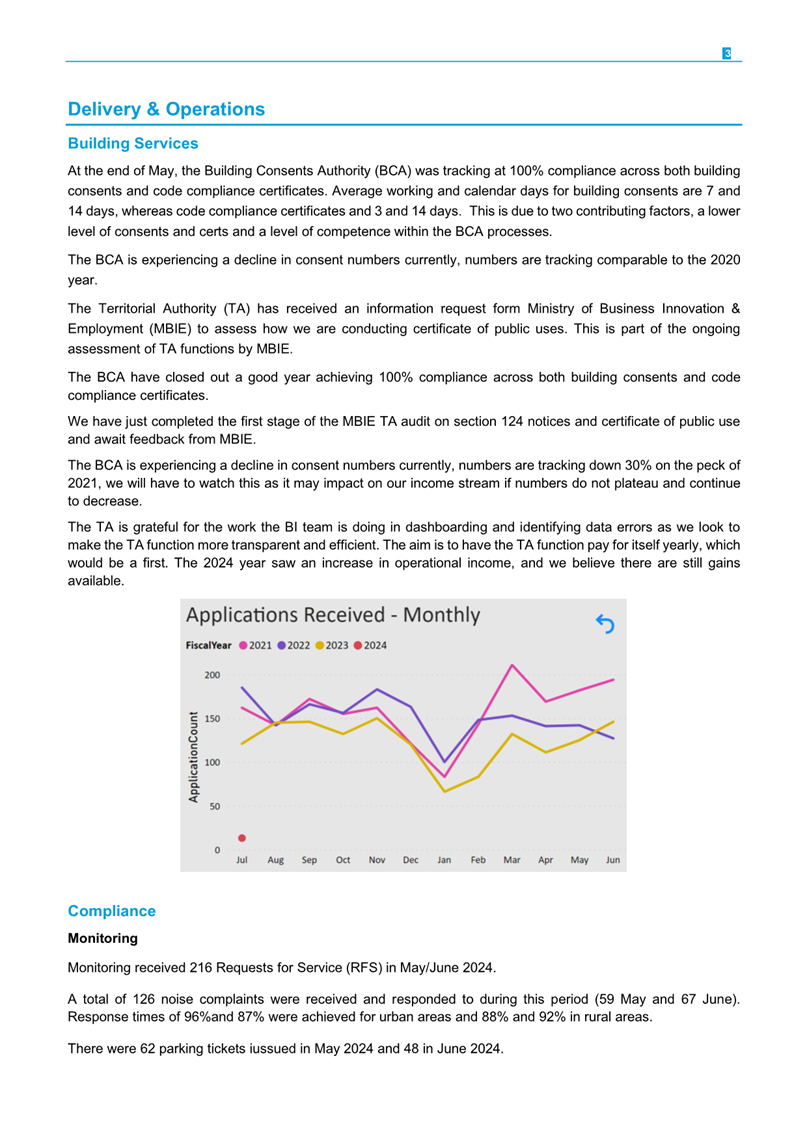
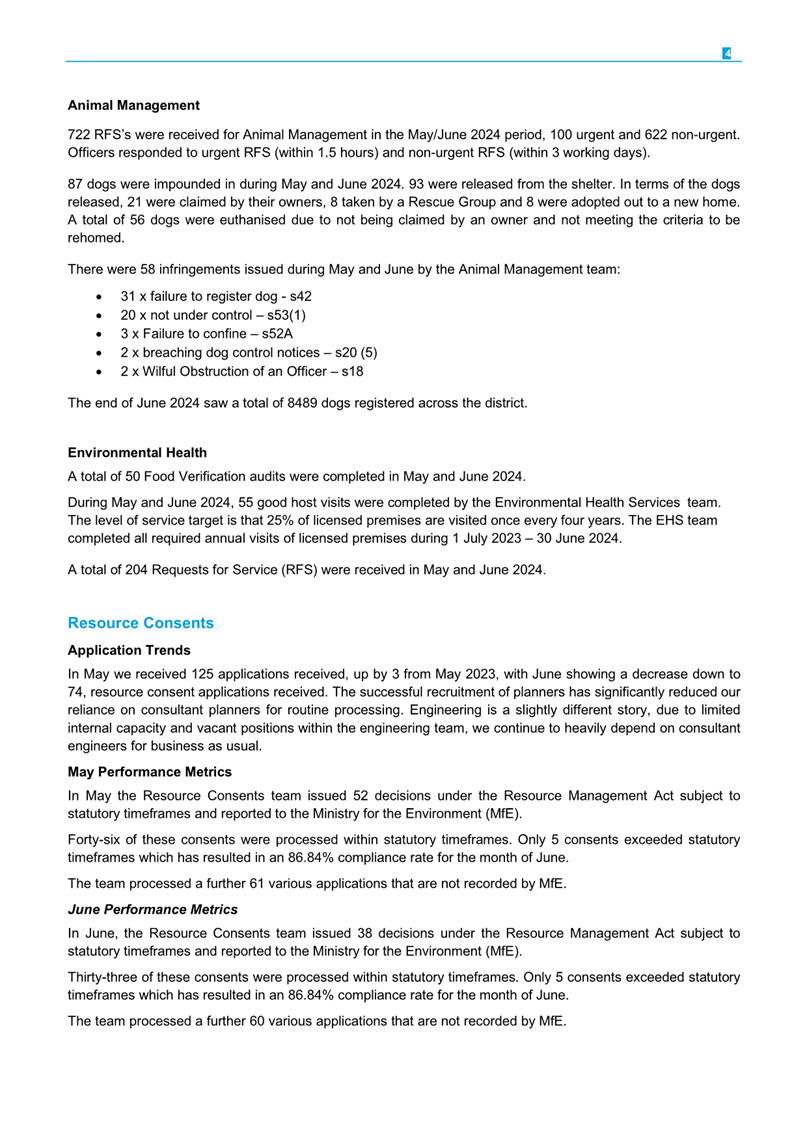
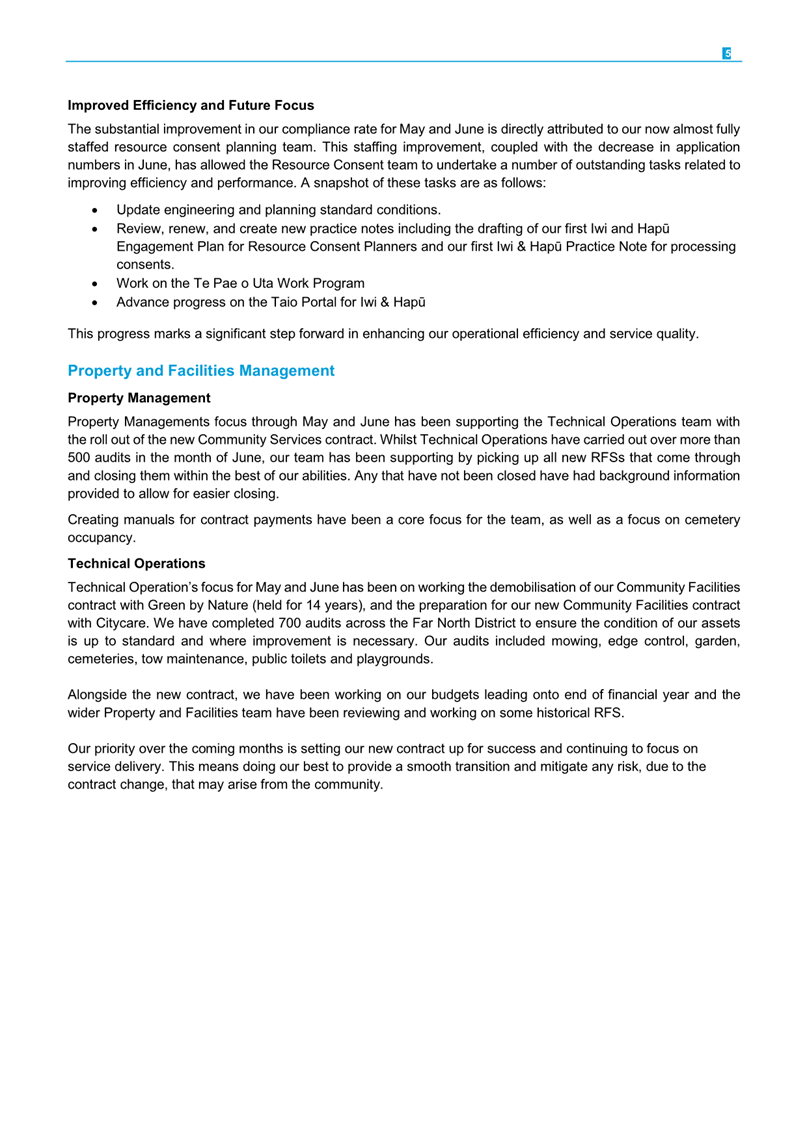
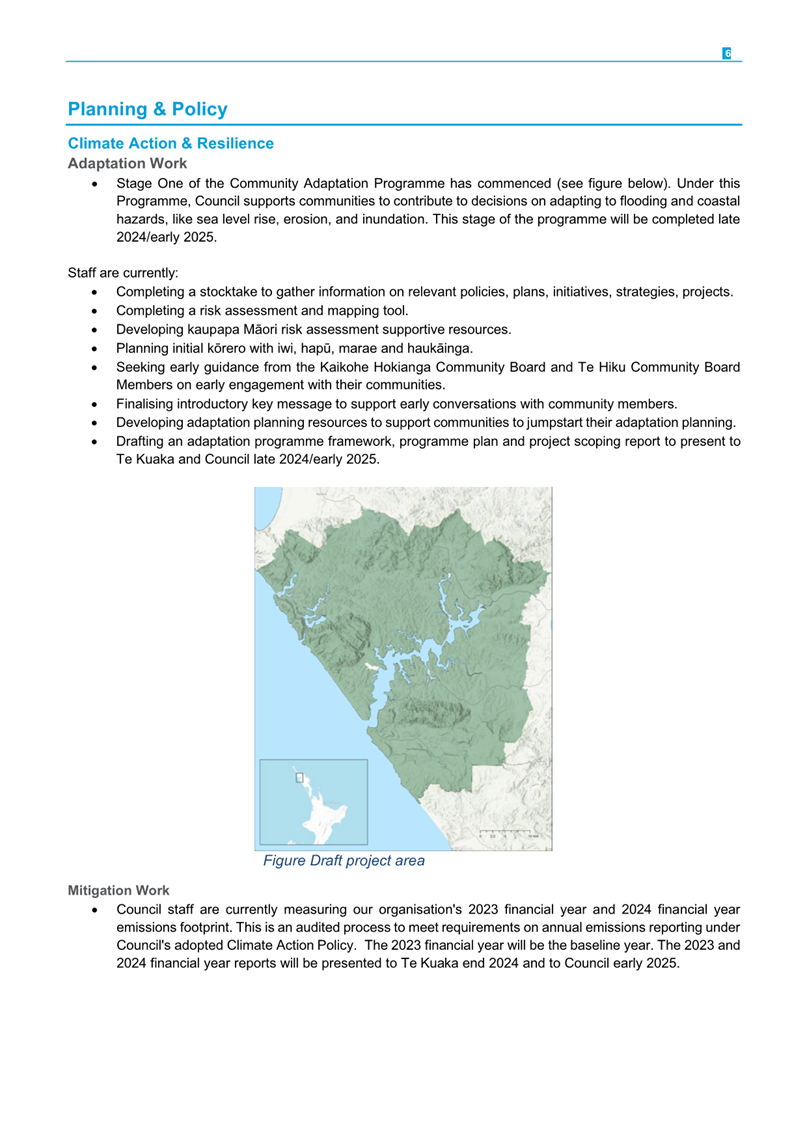
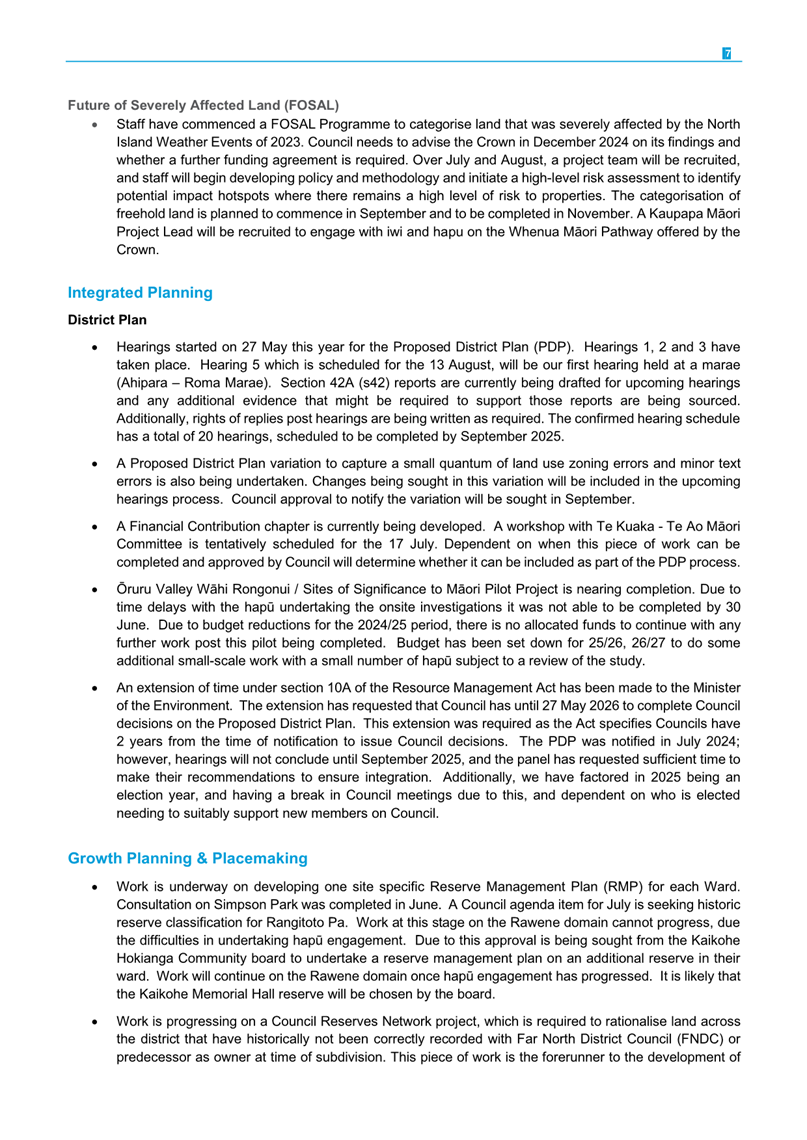
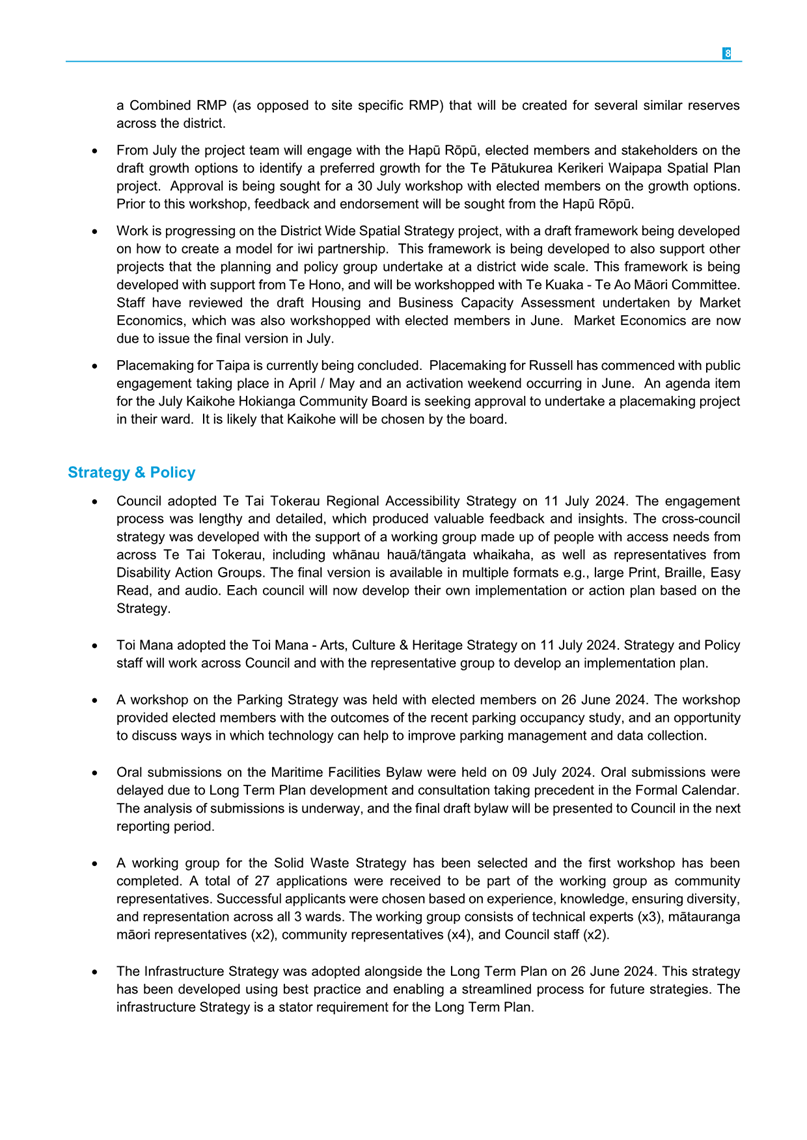
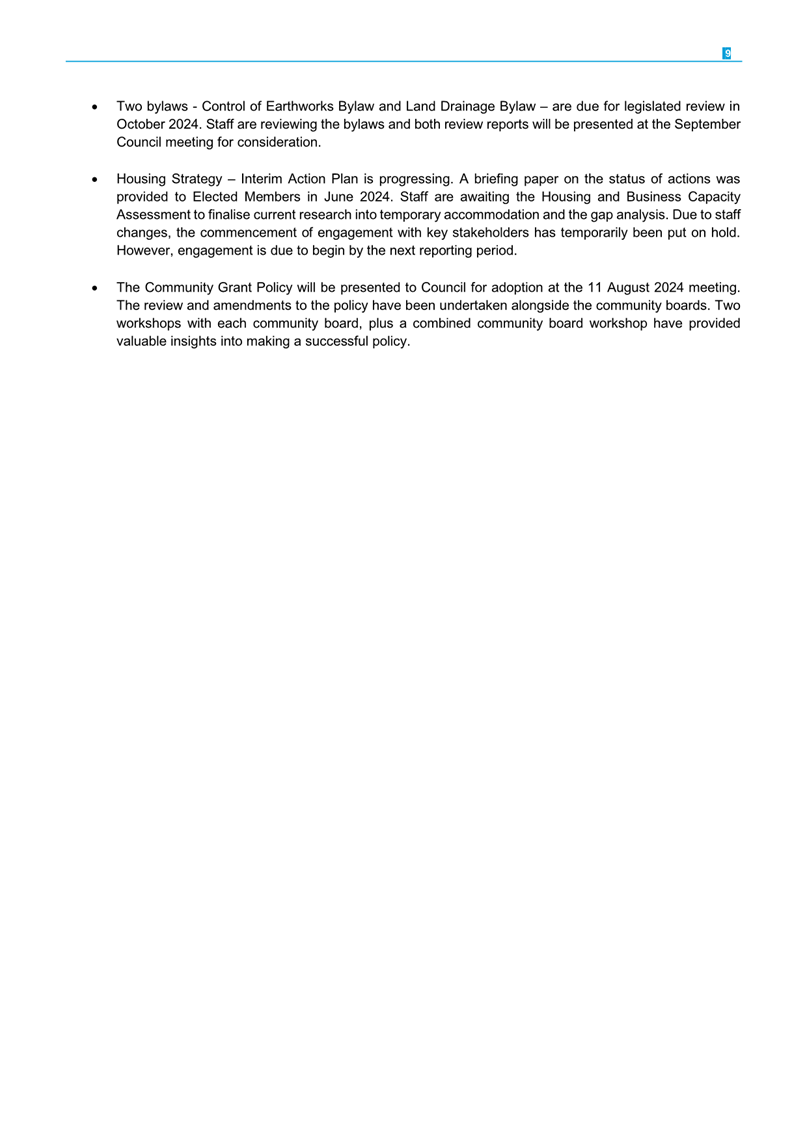
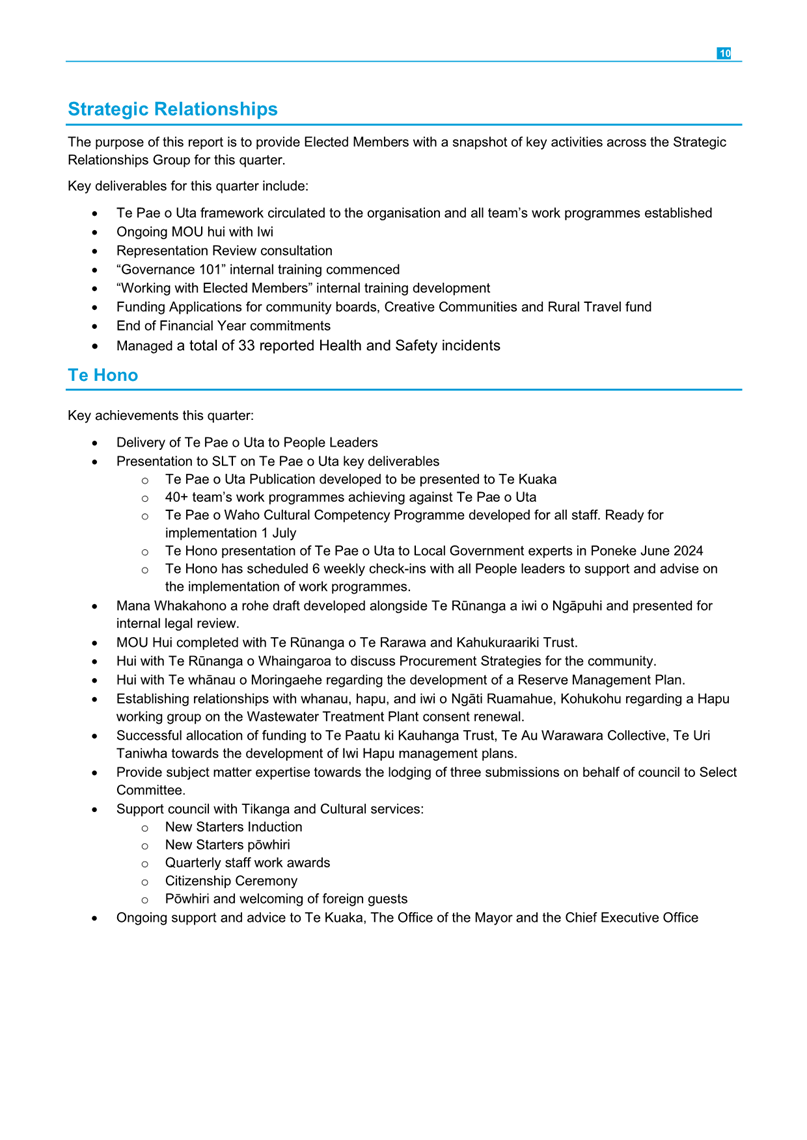
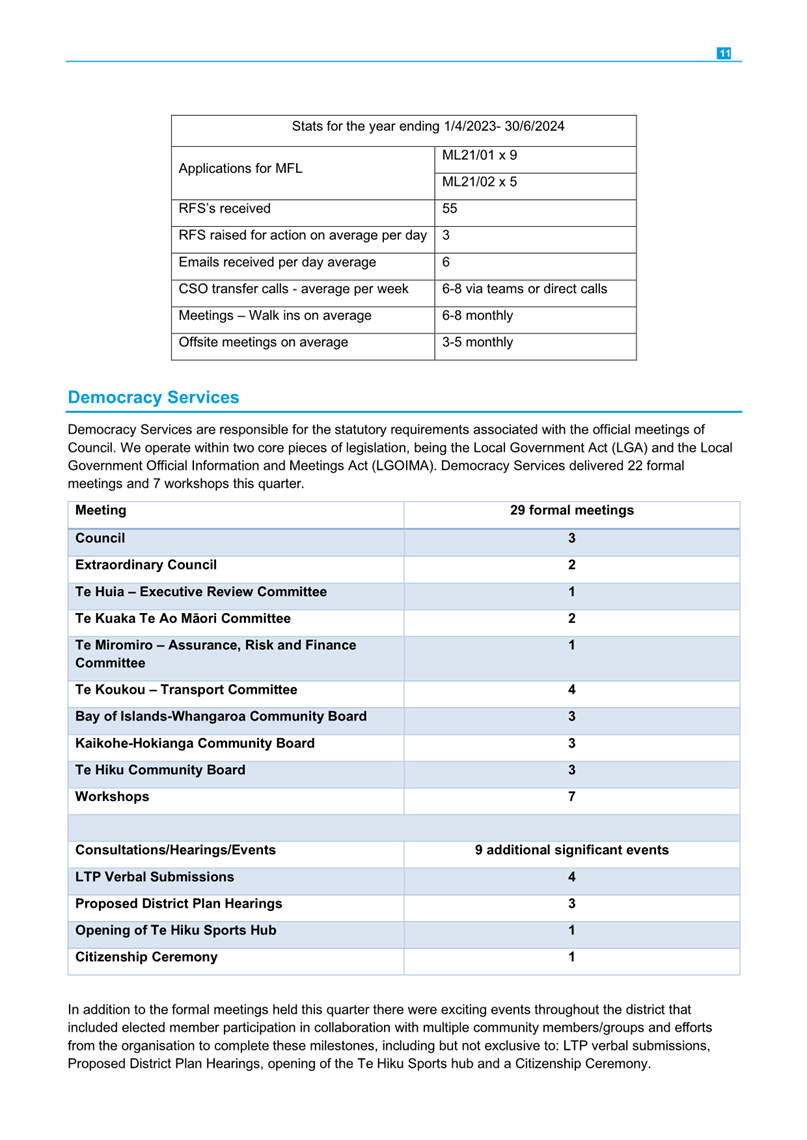
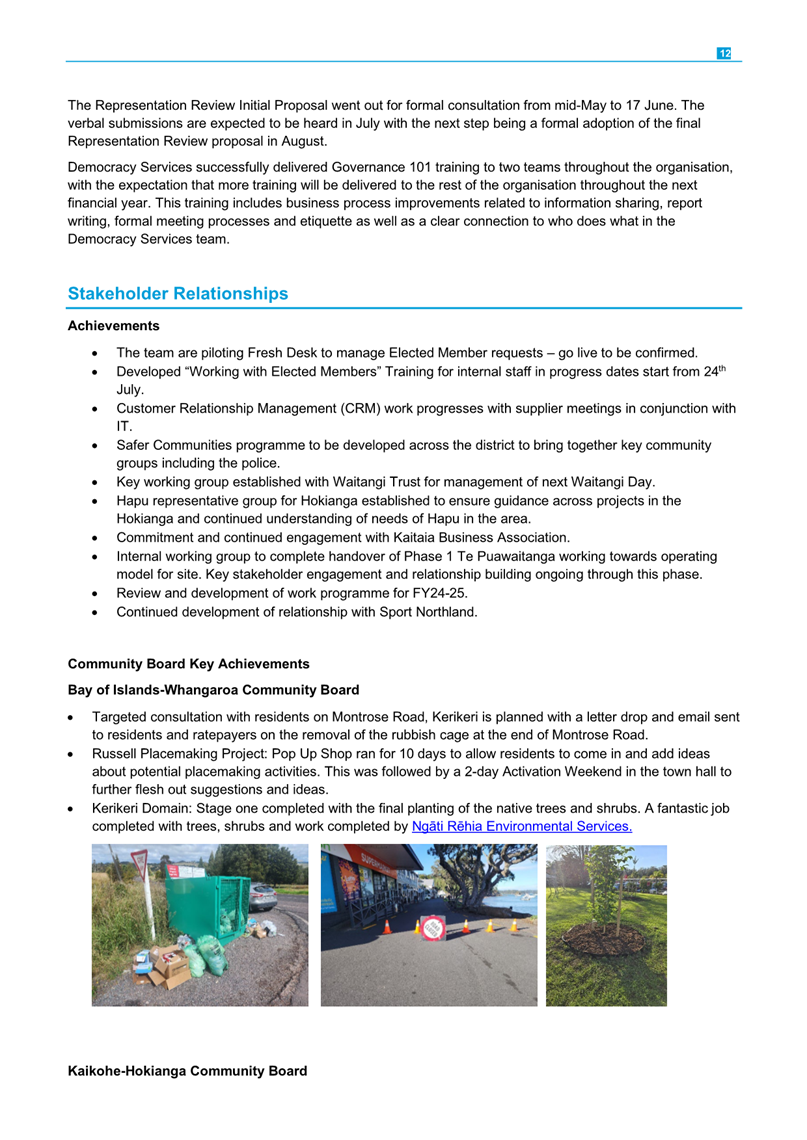
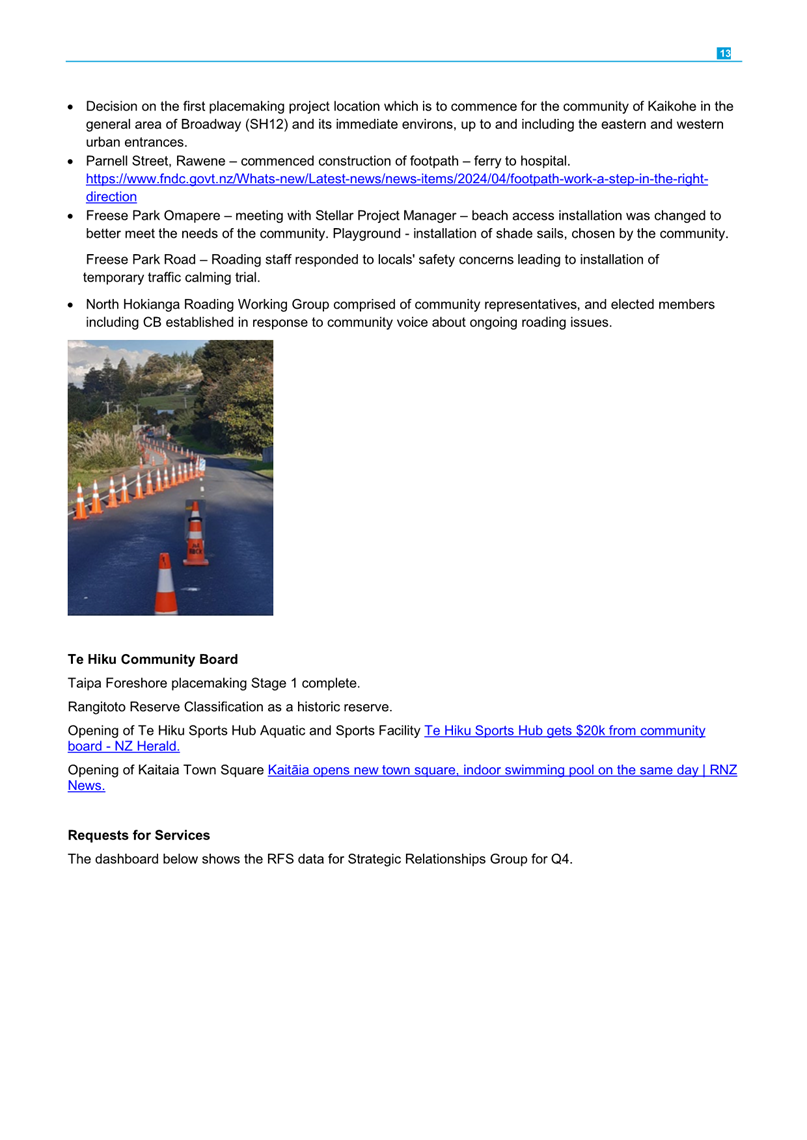
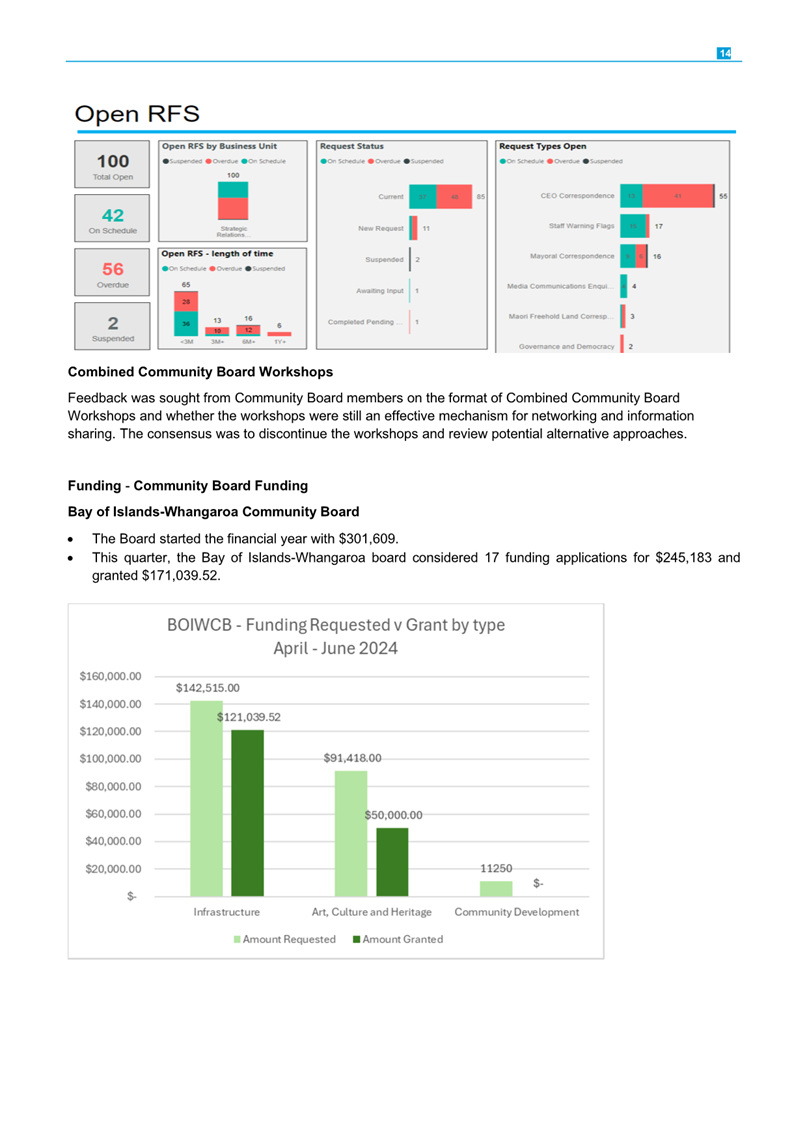
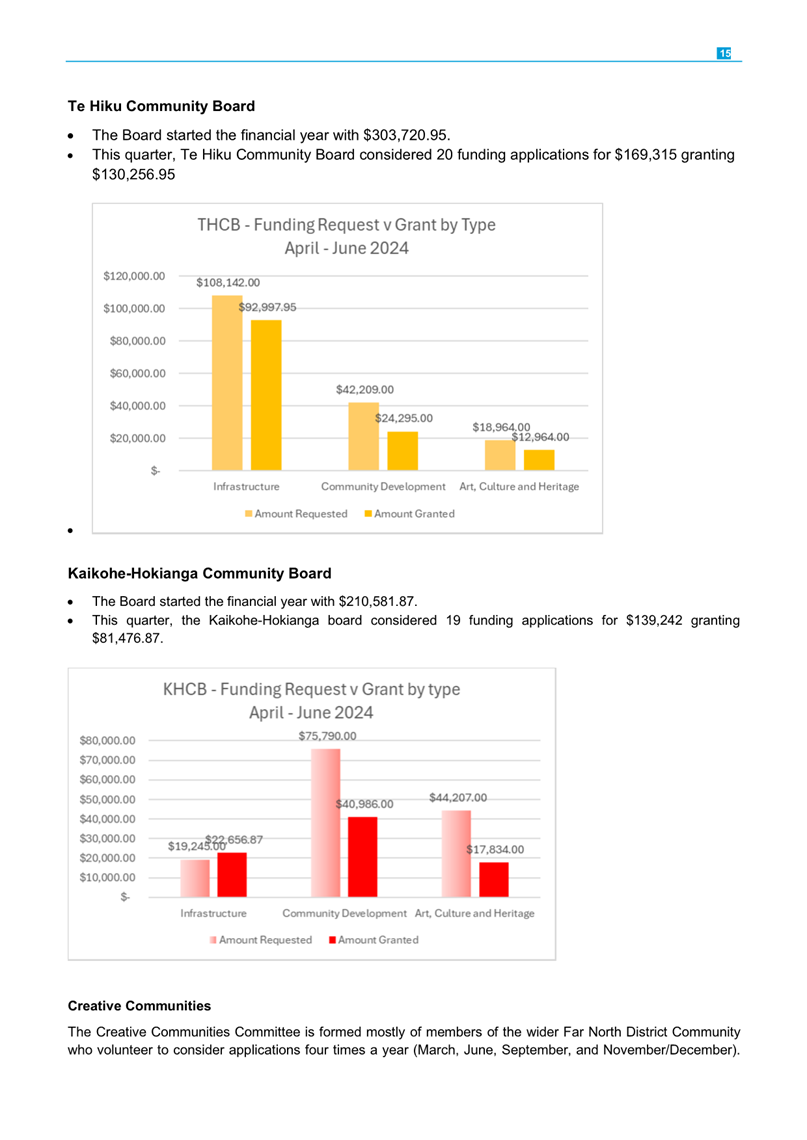
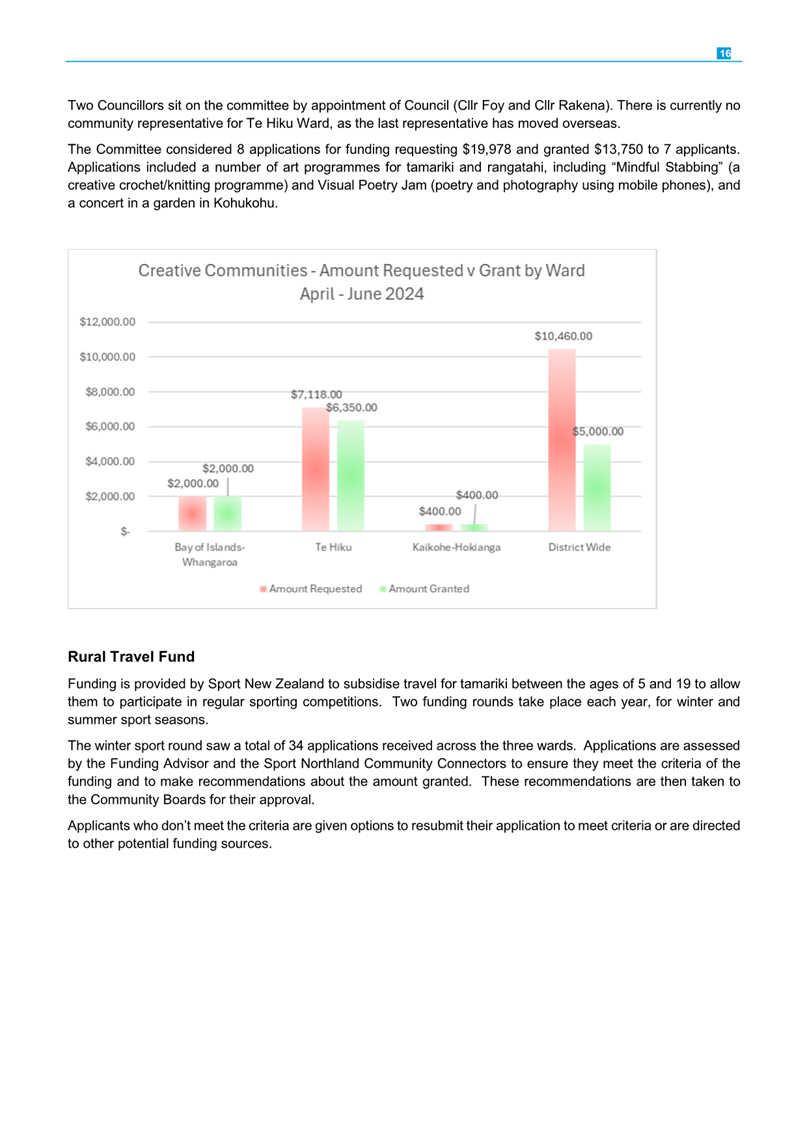
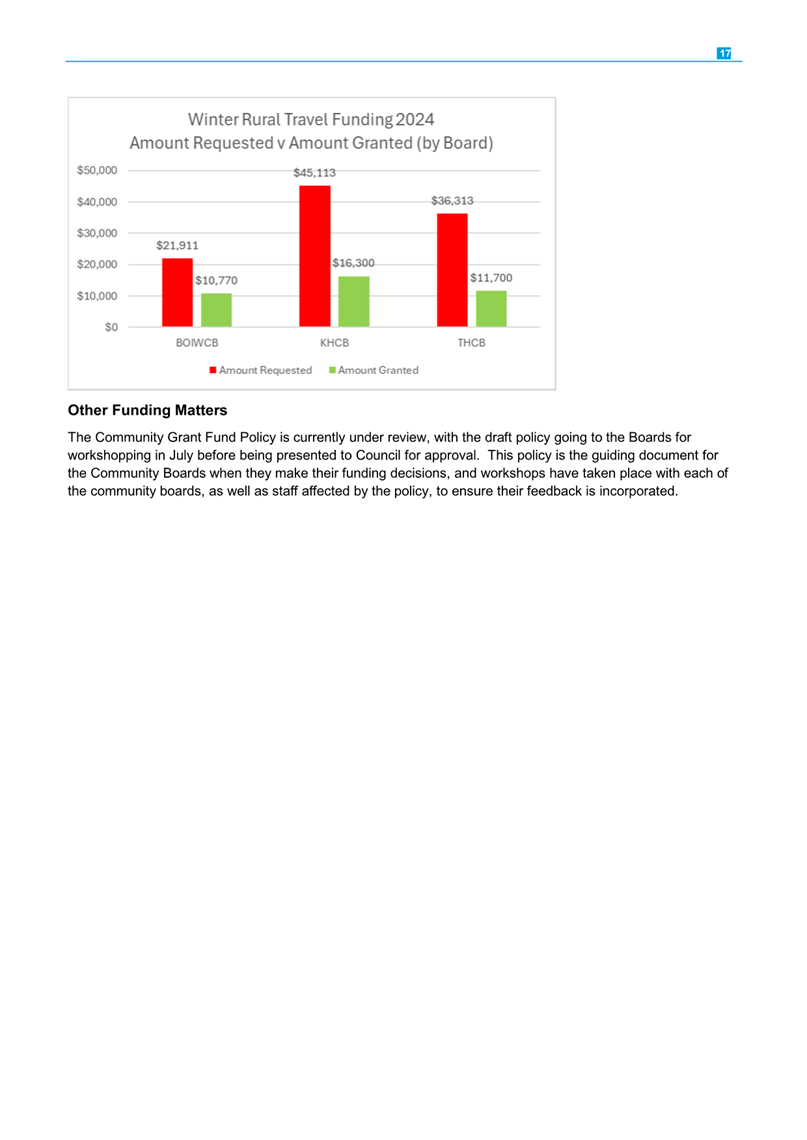

7.4 Council
Open Resolutions Update August 2024
File
Number: A4806802
Author: Imrie
Dunn, Democracy Advisor
Authoriser: Aisha
Huriwai, Manager - Democracy Services
Take Pūrongo / Purpose of the Report
To provide Council with
an overview of outstanding Council and the previous term Committee decisions
from 1 January 2020.
WhakarĀpopoto matua / Executive Summary
· Open resolutions are a mechanism to communicate progress against
decisions/resolutions.
· Open resolutions are also in place for all formal elected member
meetings.
|
tŪtohunga
/ Recommendation
That Council receive the report Council Open
Resolution Update August 2024.
|
1) TĀhuhu kŌrero / Background
Any resolution or decision from a meeting is compiled on an
open resolution status report, to capture actions trigged by Council decisions.
Staff provide updates on progress against tasks that are not yet completed.
The open resolution report also includes outstanding actions
from previous triennium committees.
2) matapaki me NgĀ KŌwhiringa /
Discussion and Options
The outstanding tasks are often multi-facet projects that
take longer to fully complete. Where a decision differs to the recommendation
of staff there may be unintended consequences or challenges that take longer
for staff to work through.
TAKE TŪTOHUNGA
/ REASON FOR THE RECOMMENDATION.
To provide Council with
an overview of outstanding Council decisions from 1 January 2020.
3) PĀnga PŪtea me ngĀ
wĀhanga tahua / Financial Implications and Budgetary Provision
There are no financial
implications or need for budgetary provision in receiving this report.
Āpitihanga
/ Attachments
1. Open
Resolution Report - A4823363 ⇩ 
|
Ordinary Council Meeting Agenda
|
8 August 2024
|
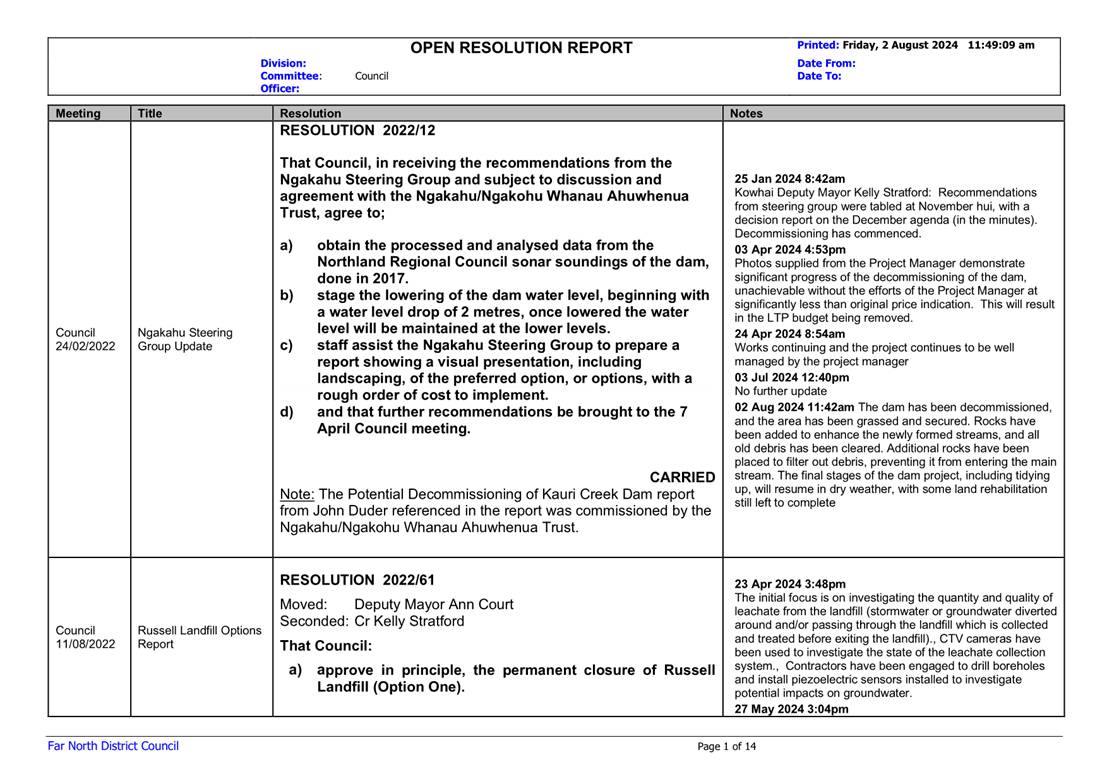
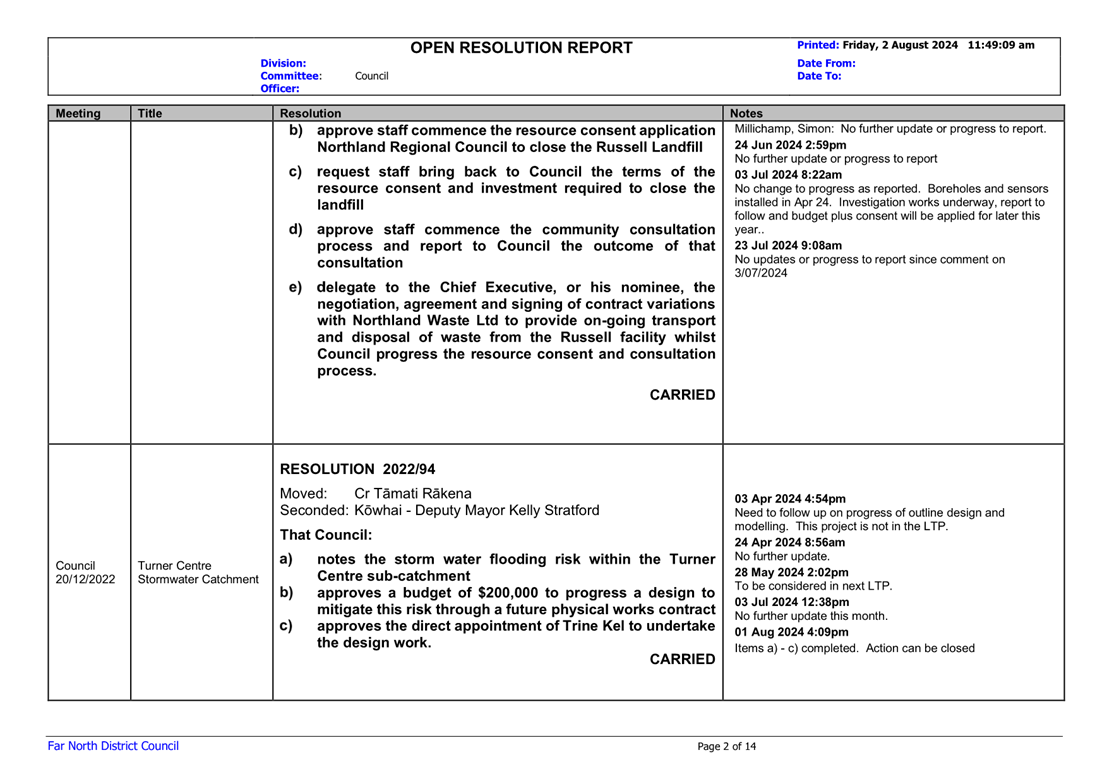
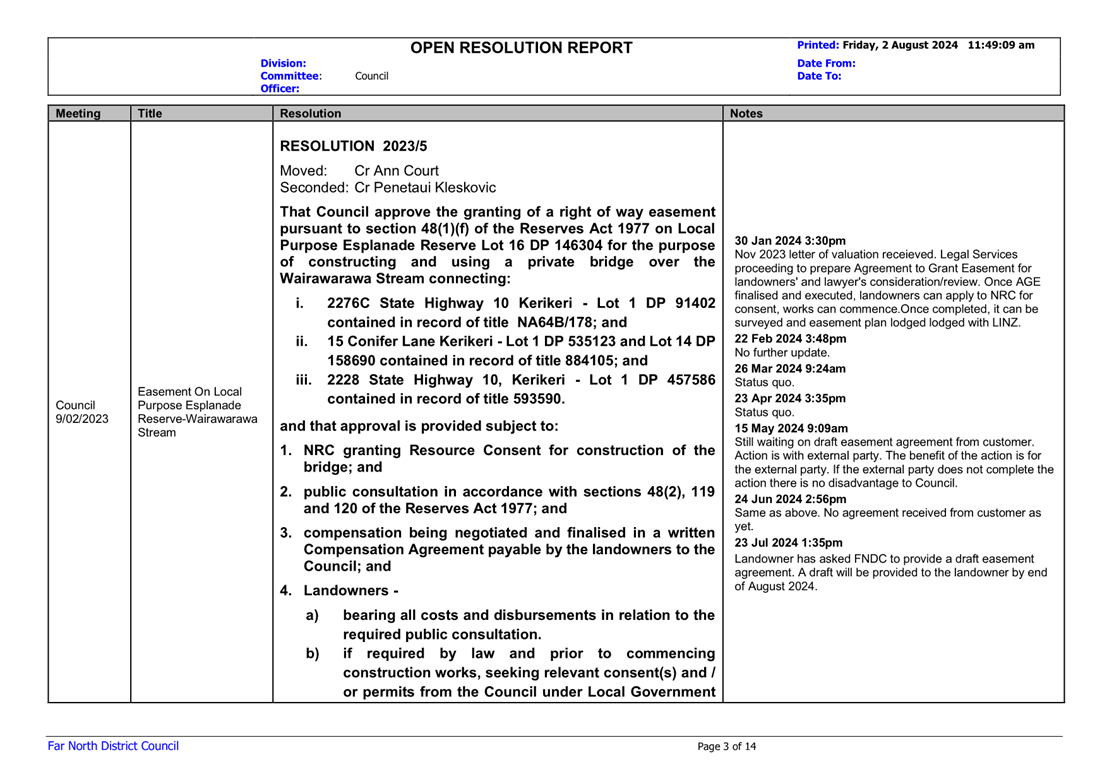
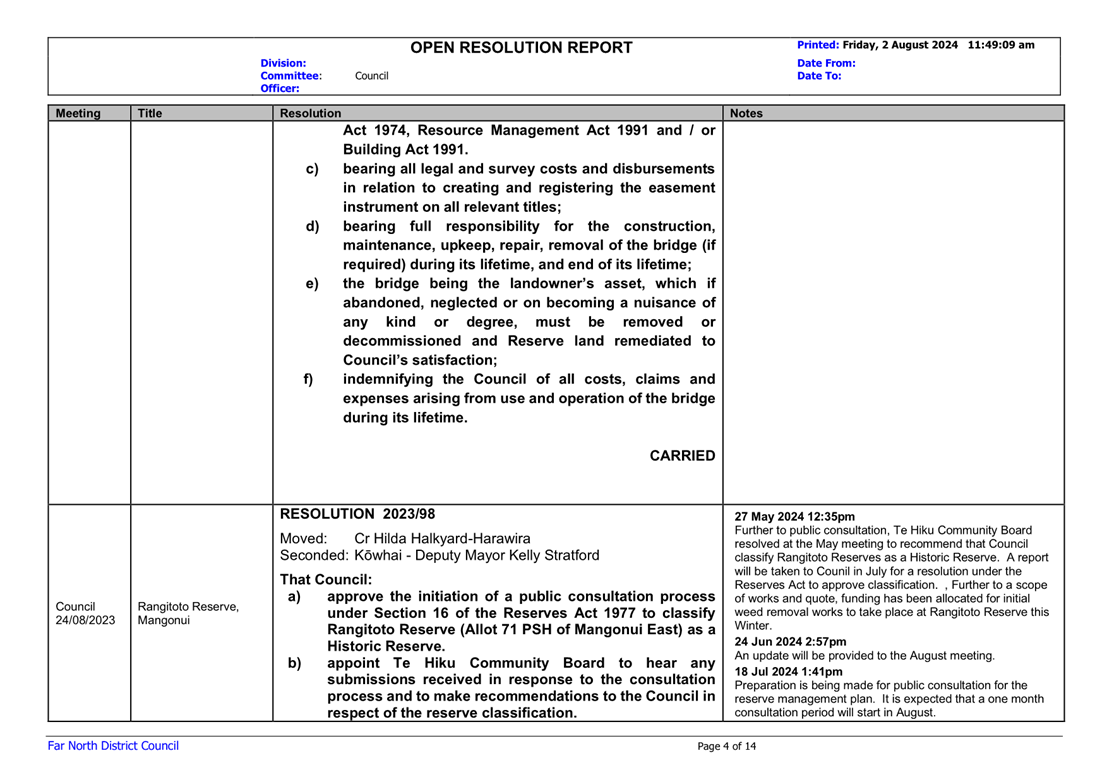
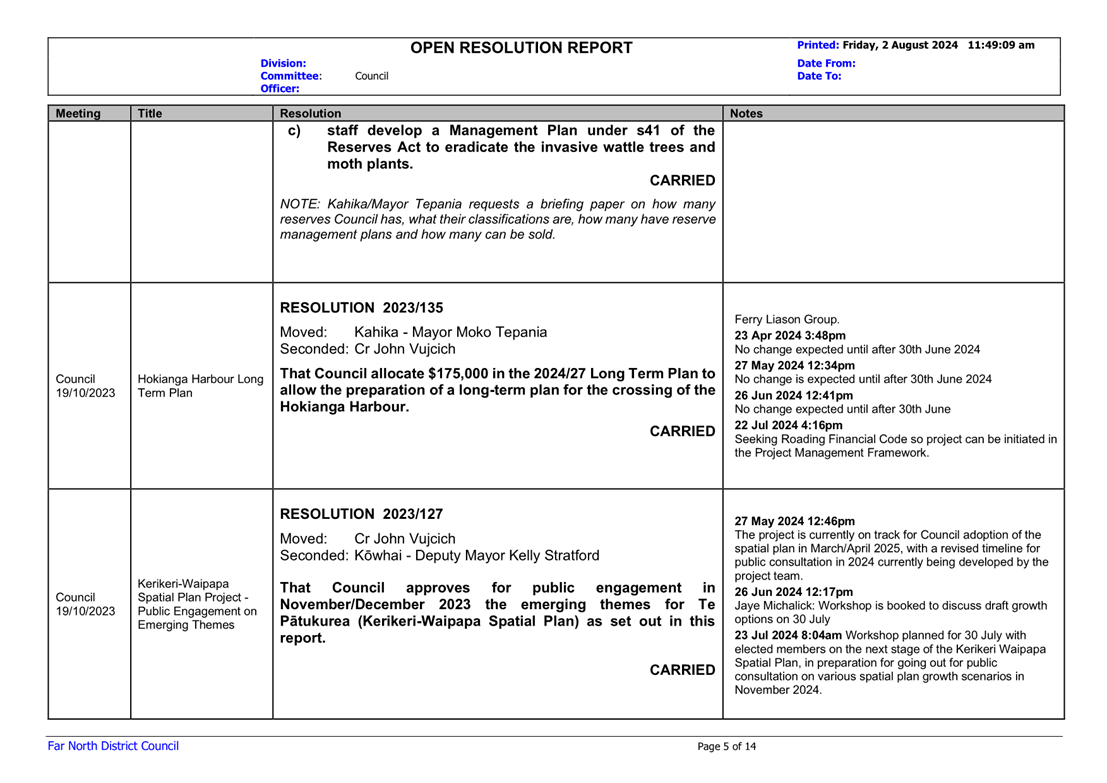
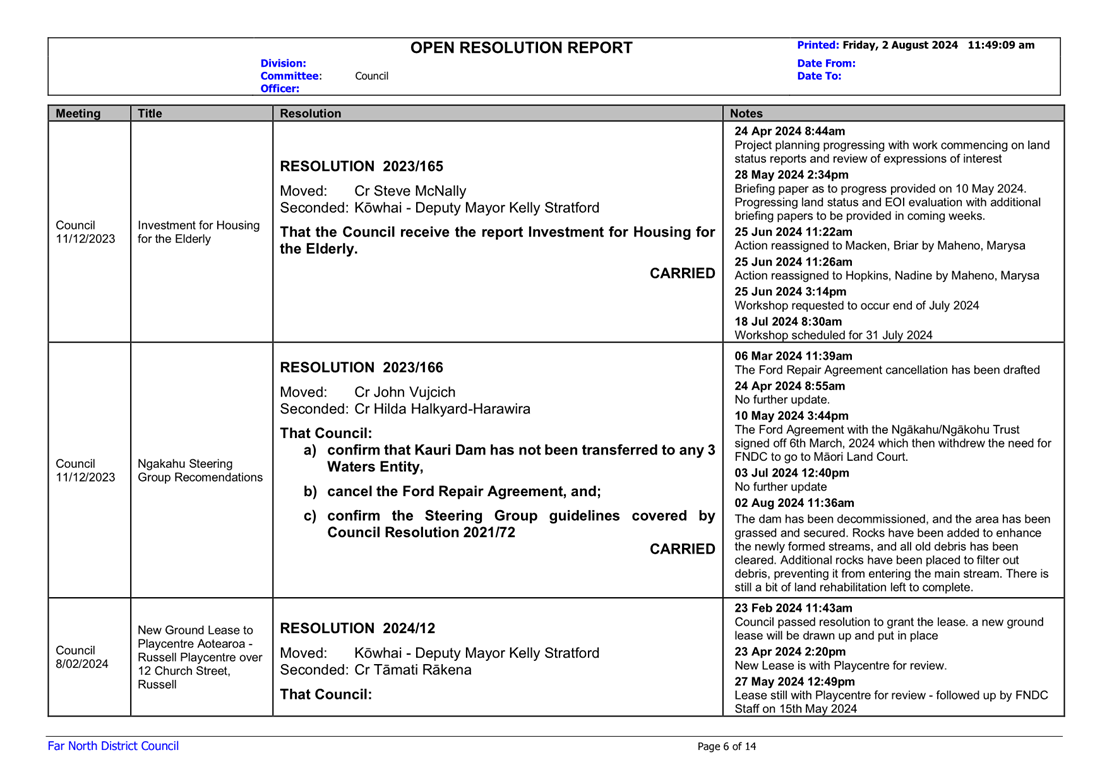
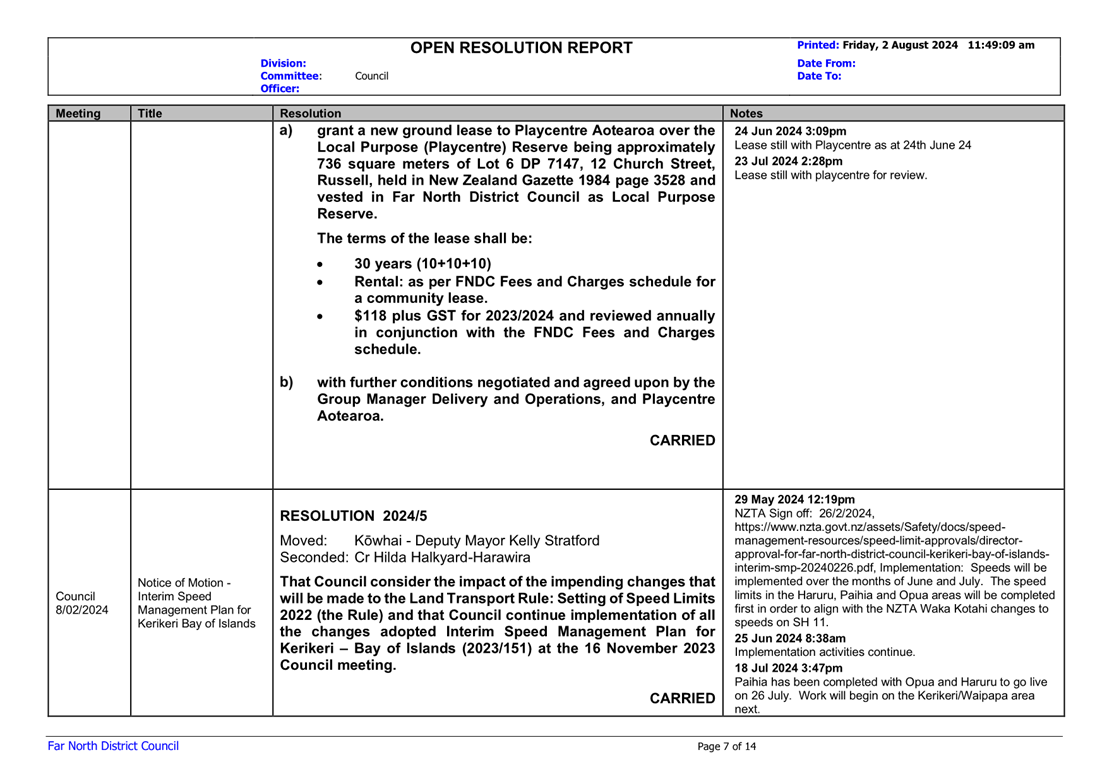
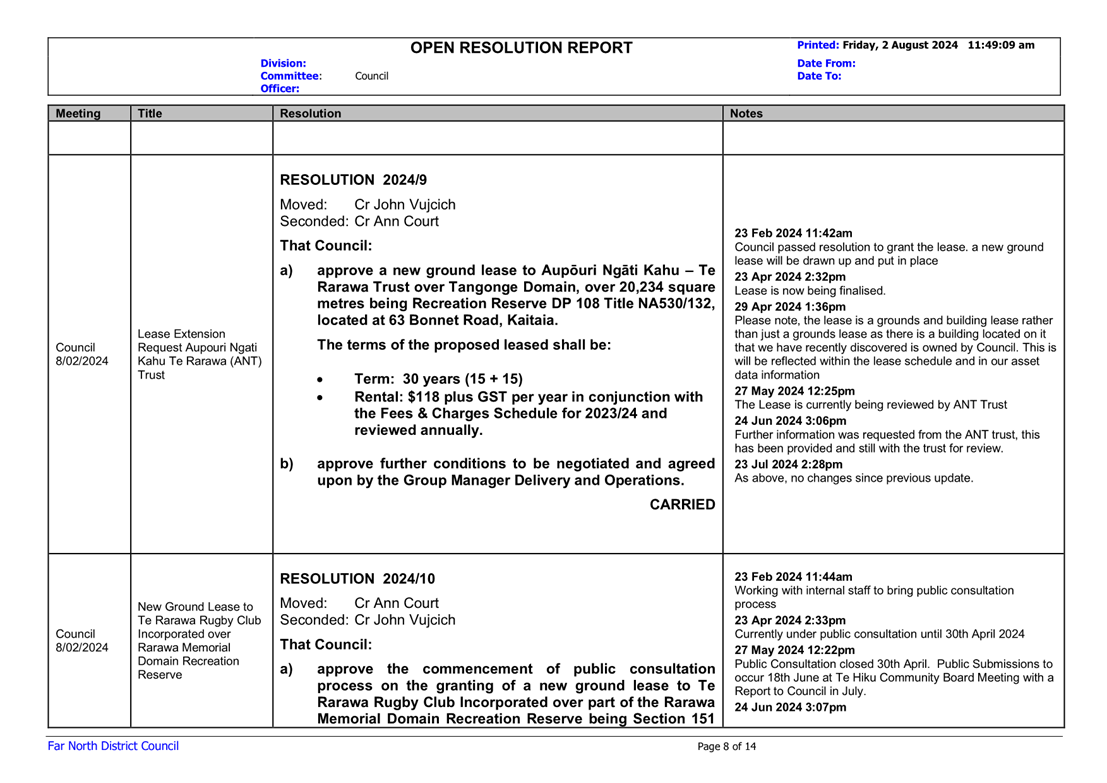
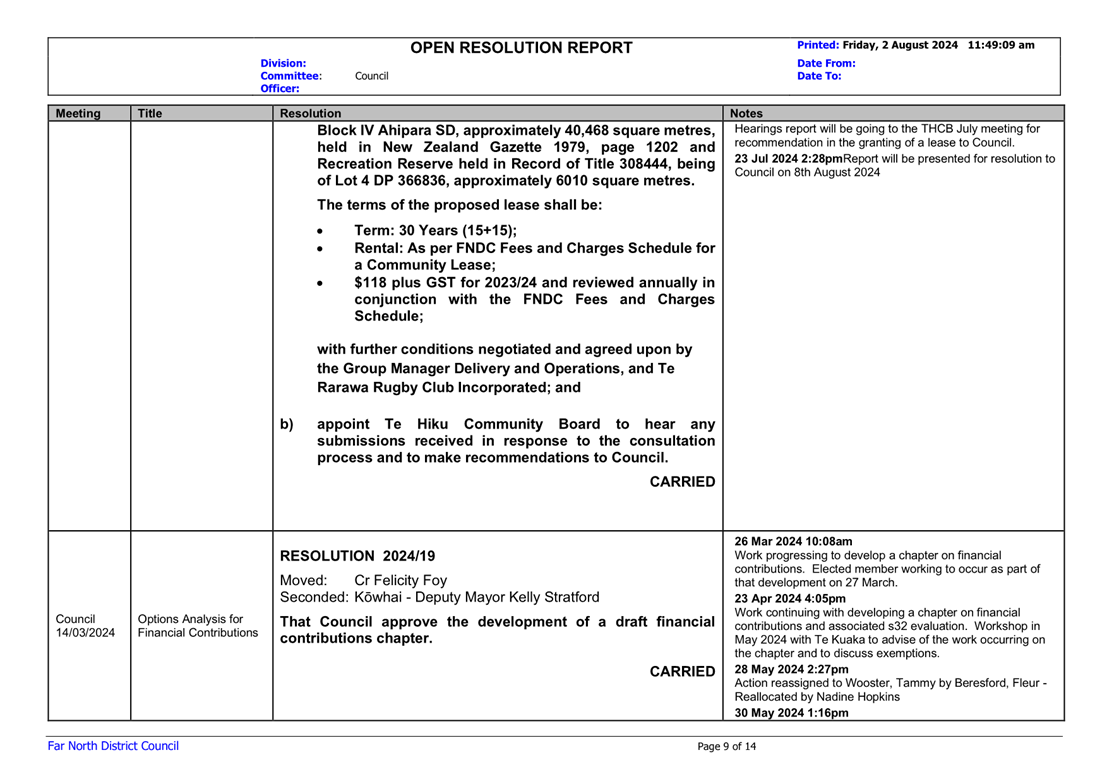
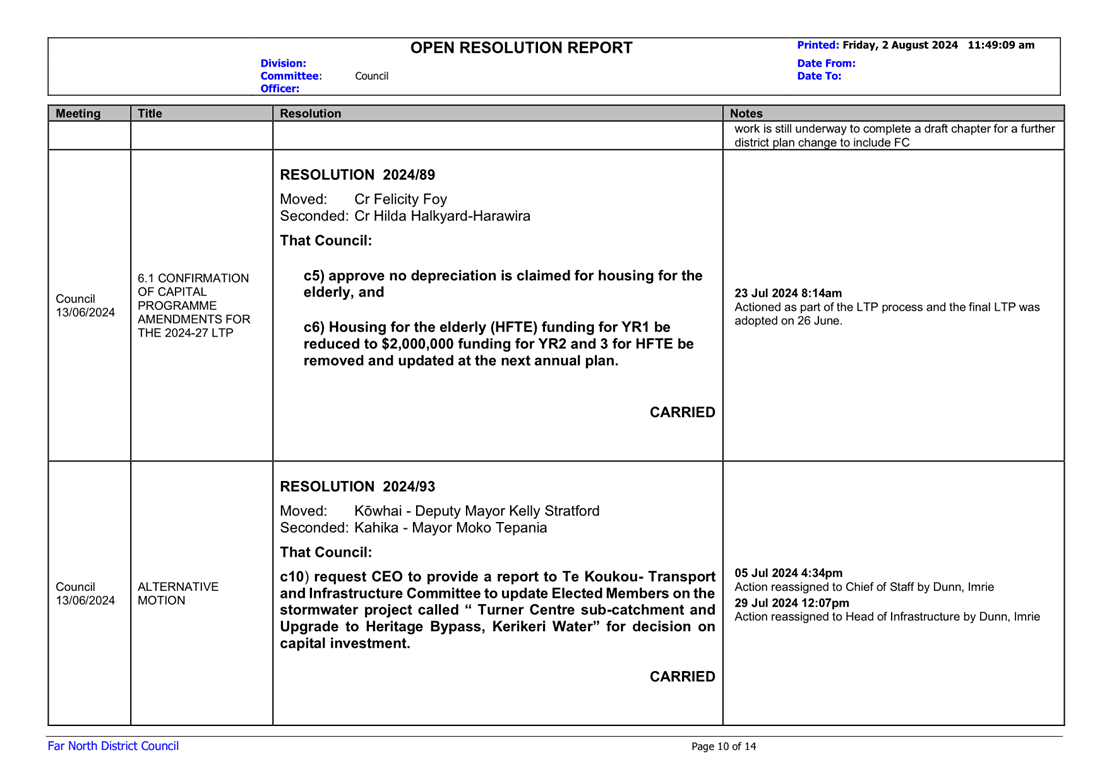
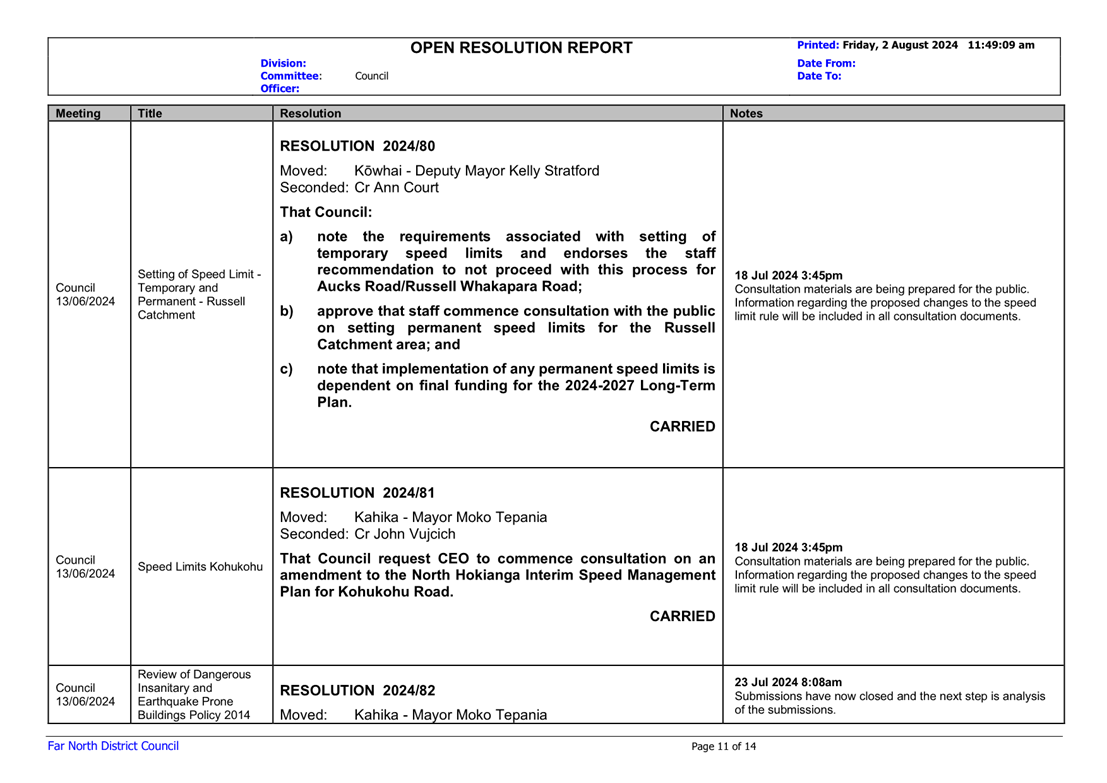
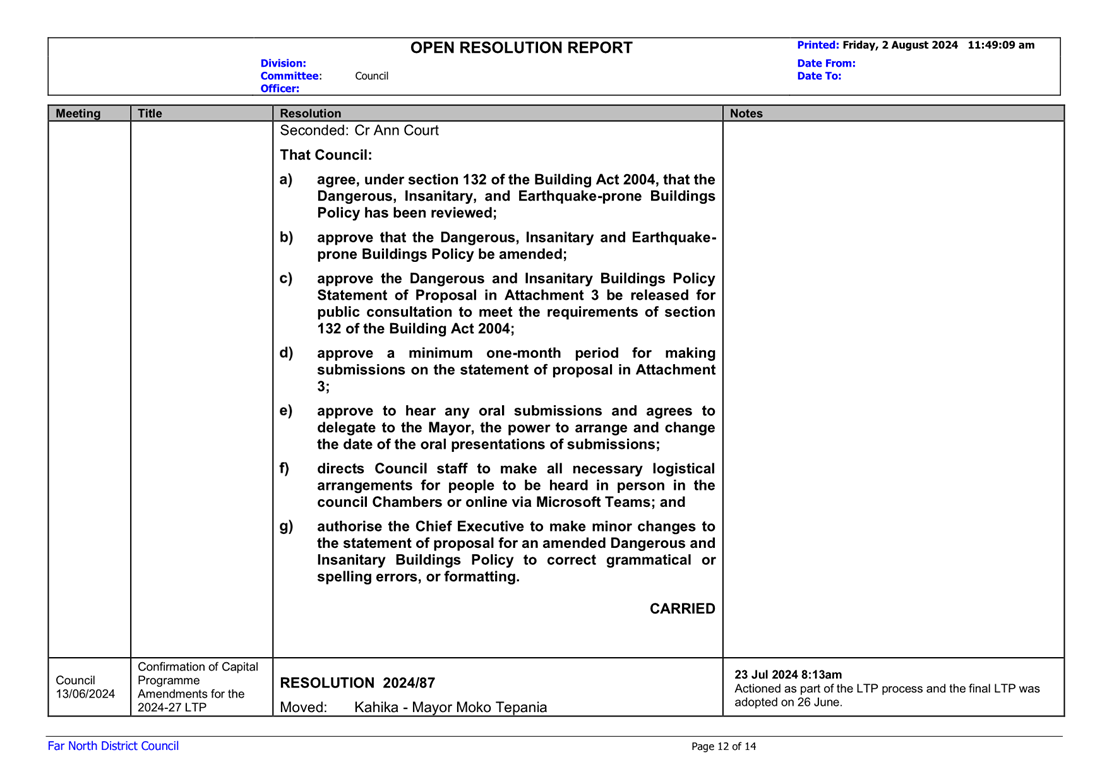
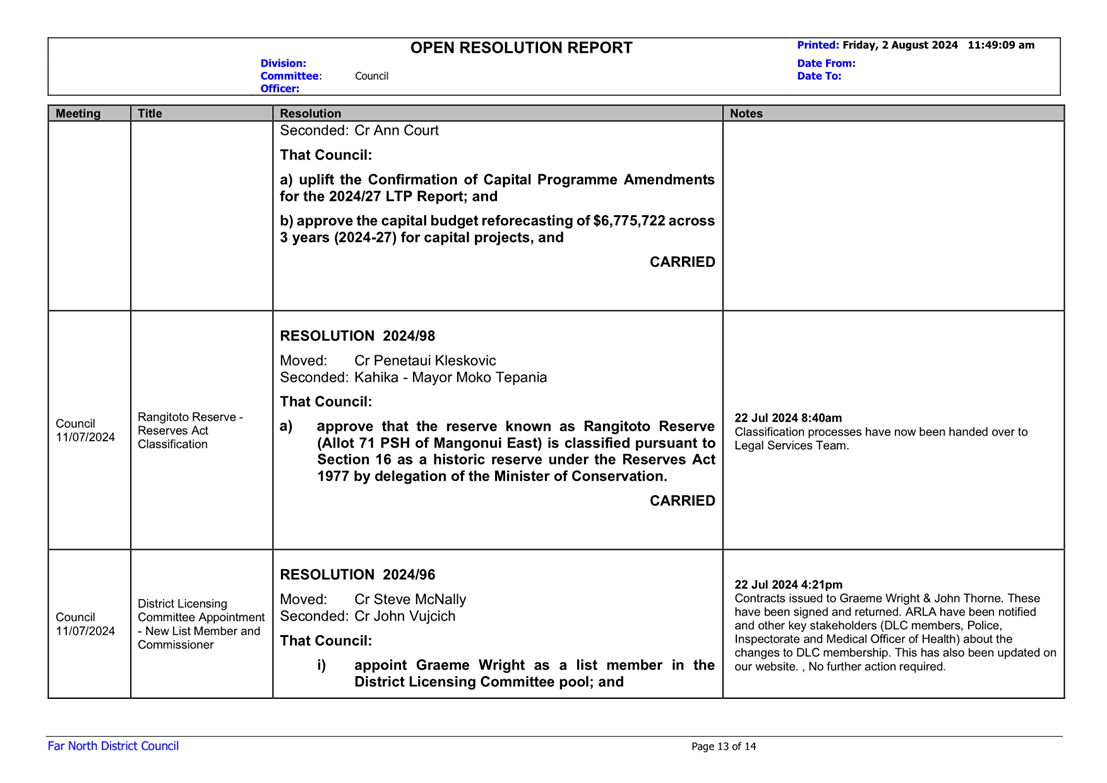
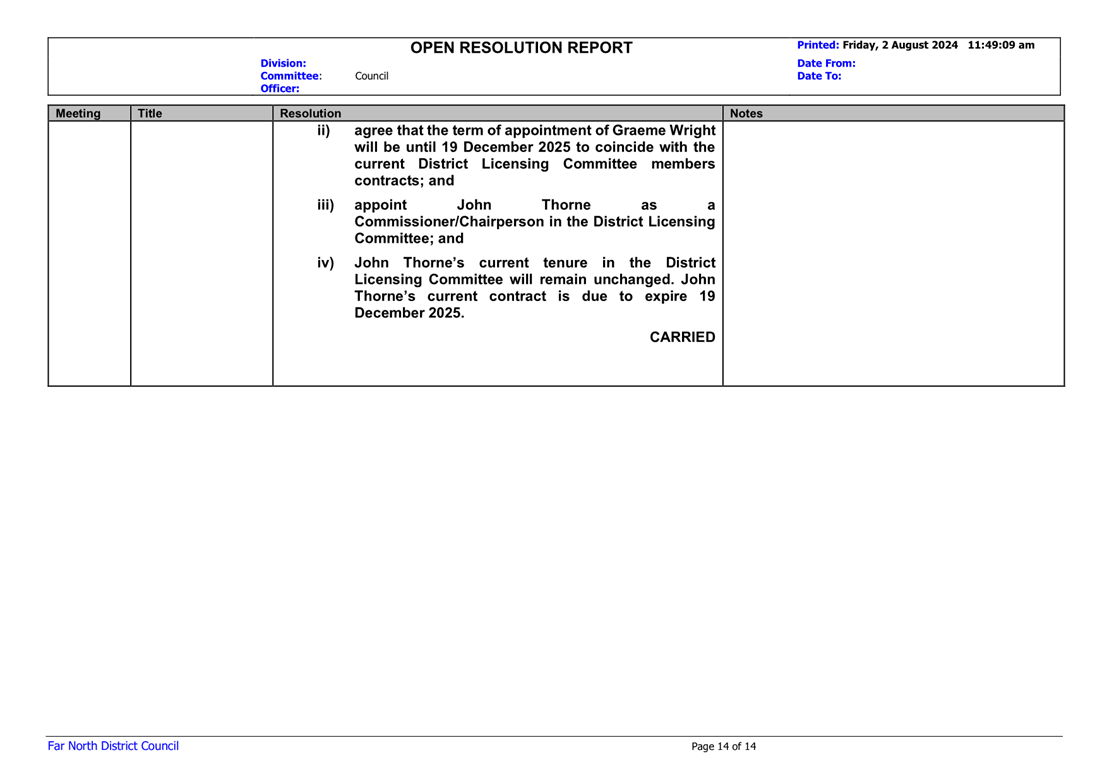
|
Ordinary Council Meeting Agenda
|
8 August 2024
|
8 Te
Wāhanga Tūmataiti / Public Excluded
RESOLUTION TO
EXCLUDE THE PUBLIC
|
Recommendation
That the public be excluded from the following parts of
the proceedings of this meeting.
The general subject matter of each matter to be
considered while the public is excluded, the reason for passing this
resolution in relation to each matter, and the specific grounds under section
48 of the Local Government Official Information and Meetings Act 1987 for the
passing of this resolution are as follows:
|
General subject of each matter to be
considered
|
Reason for passing this resolution in
relation to each matter
|
Ground(s) under section 48 for the
passing of this resolution
|
|
8.1 - Confirmation of Previous Minutes
- Public Excluded
|
s7(2)(a) - the withholding of the information is
necessary to protect the privacy of natural persons, including that of
deceased natural persons
s7(2)(f)(i) - free and frank expression of
opinions by or between or to members or officers or employees of any local
authority
s7(2)(h) - the withholding of the information is
necessary to enable Council to carry out, without prejudice or
disadvantage, commercial activities
s7(2)(i) - the withholding of the information is
necessary to enable Council to carry on, without prejudice or disadvantage,
negotiations (including commercial and industrial negotiations)
|
s48(1)(a)(i) - the public conduct of the relevant
part of the proceedings of the meeting would be likely to result in the
disclosure of information for which good reason for withholding would exist
under section 6 or section 7
|
|
8.2 - Council Public Excluded Open
Resolutions Update August 2024
|
s7(2)(f)(i) - free and frank expression of
opinions by or between or to members or officers or employees of any local
authority
s7(2)(g) - the withholding of the information is
necessary to maintain legal professional privilege
s7(2)(i) - the withholding of the information is
necessary to enable Council to carry on, without prejudice or disadvantage,
negotiations (including commercial and industrial negotiations)
|
s48(1)(a)(i) - the public conduct of the relevant
part of the proceedings of the meeting would be likely to result in the
disclosure of information for which good reason for withholding would exist
under section 6 or section 7
|
|
















































































































































































































